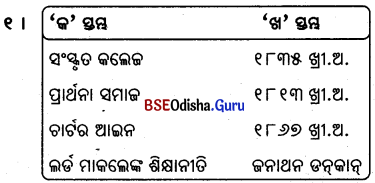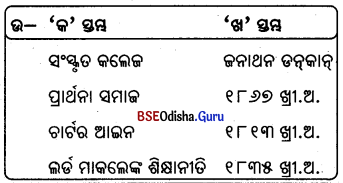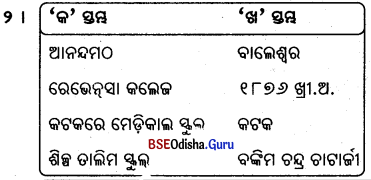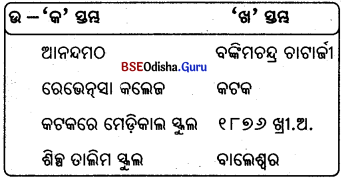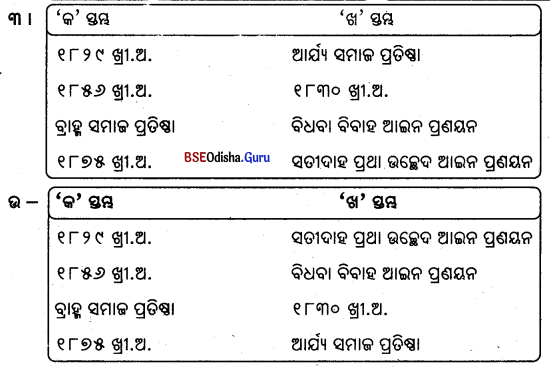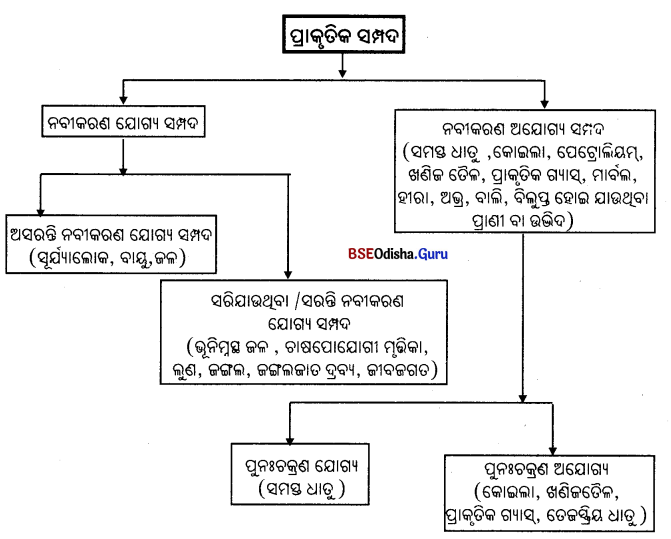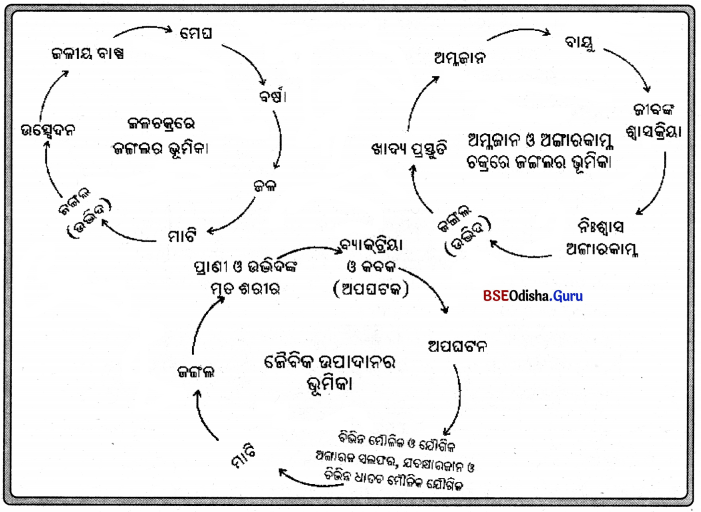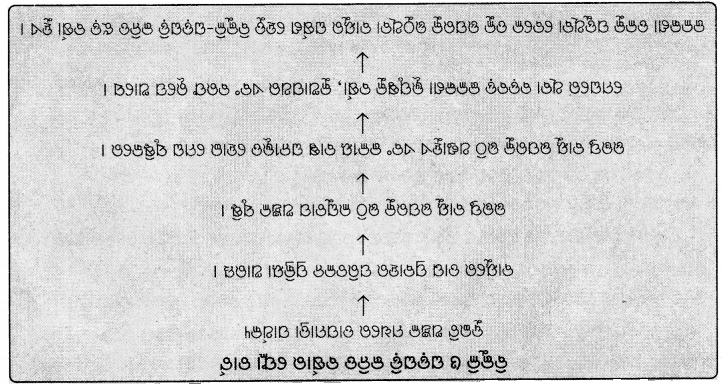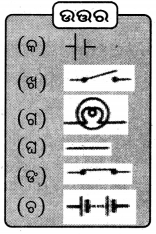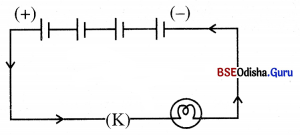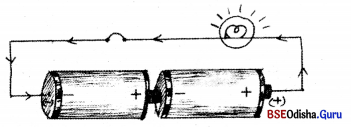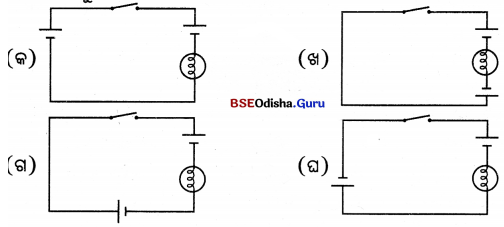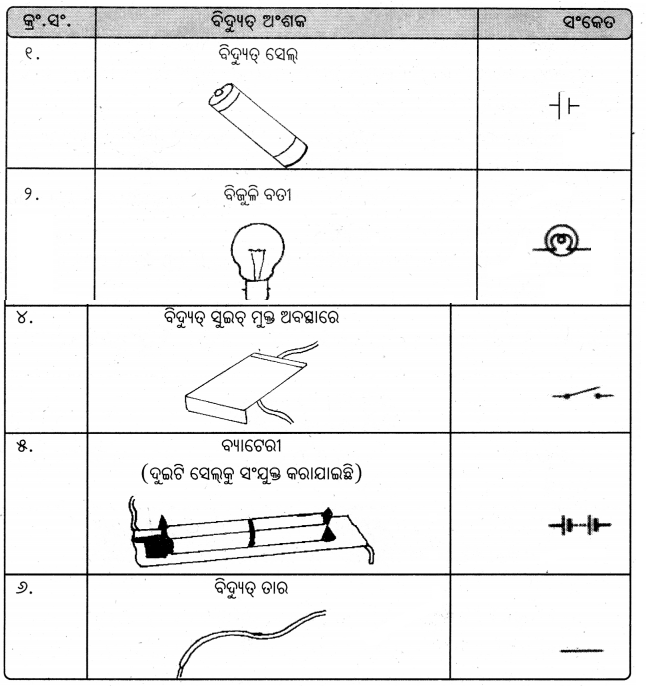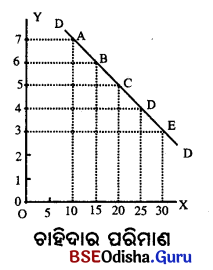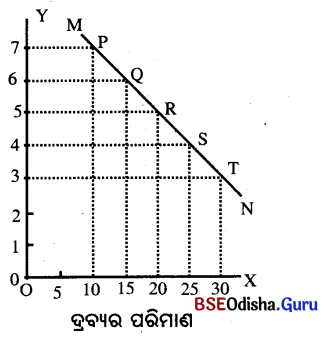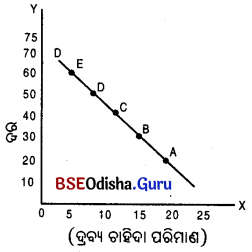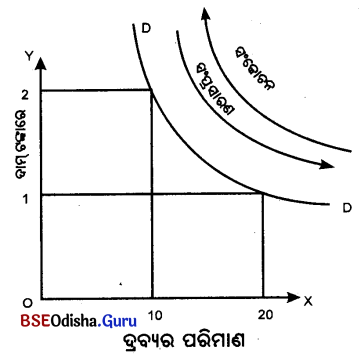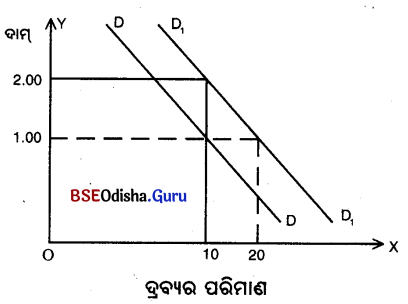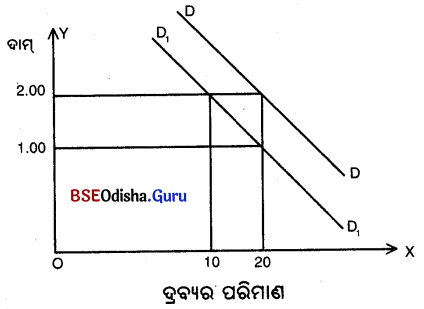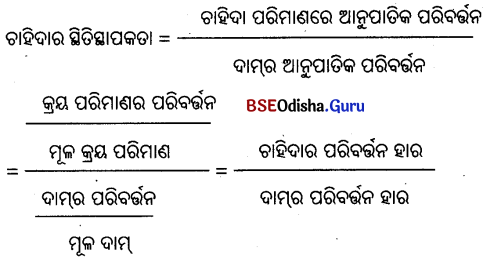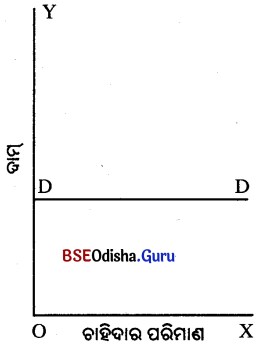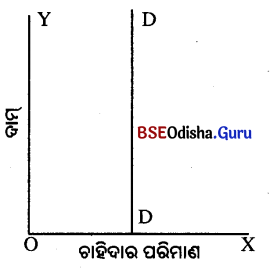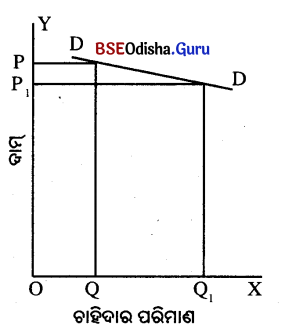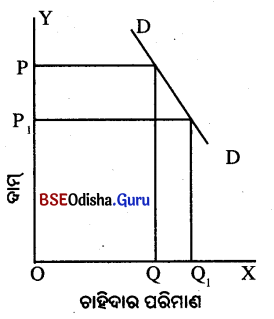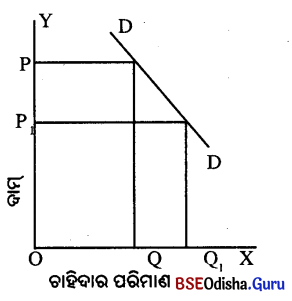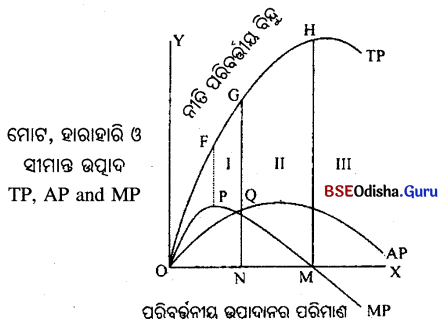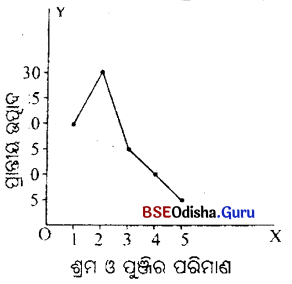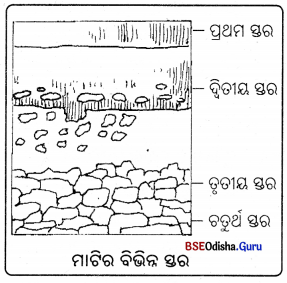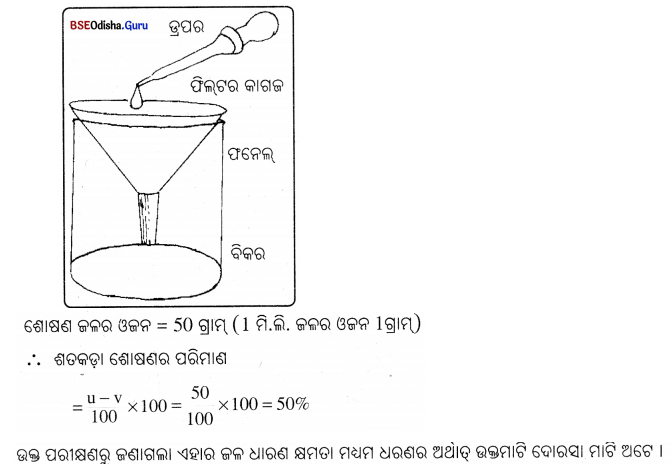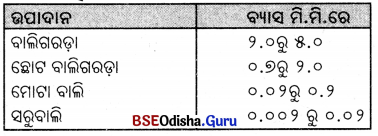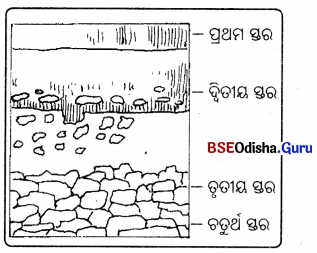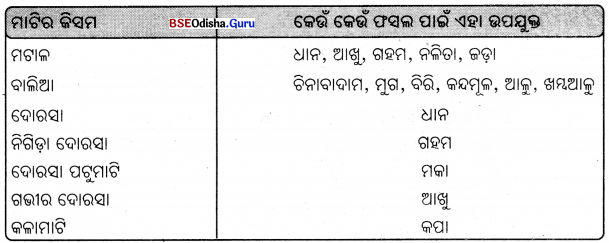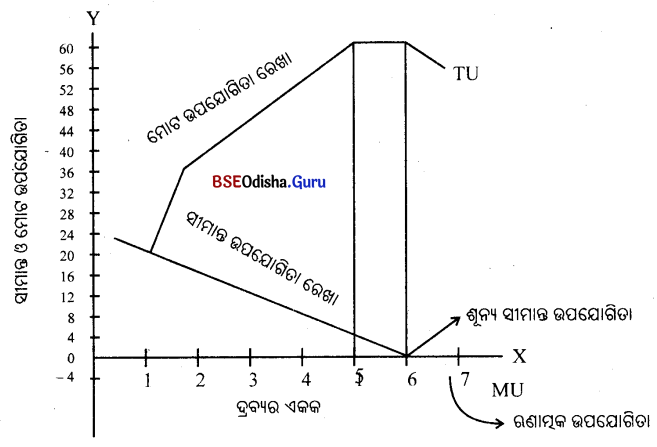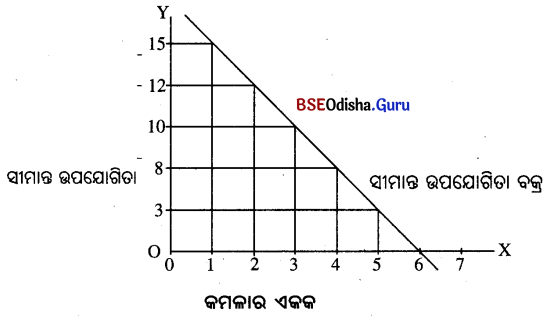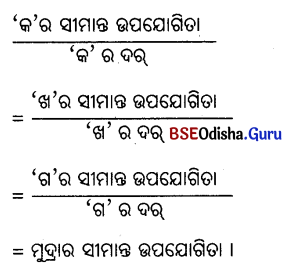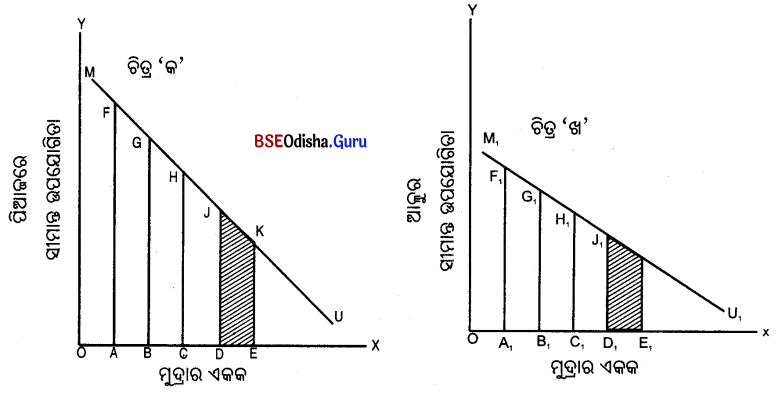Odisha State Board Plus Two First Year Sanskrit Optional Solutions Chapter 7 ବିଭୀଷଣସ୍ୟ ରାବଣଂ ପ୍ରତି ଉପଦେଶଃ Textbook Exercise Questions and Answers.
Plus Two First Year Sanskrit Optional Chapter 7 ବିଭୀଷଣସ୍ୟ ରାବଣଂ ପ୍ରତି ଉପଦେଶଃ Question Answer
अतिसंक्षेपेण उत्तरं लिखत
(क) बन्धनीमध्यात् शुद्धम् उत्तरं चित्वा लिखत-
Question 1.
माताऽवोचत् सोदरस्य ___________________________ कुरुष्व। (अश्रान्तिं, प्रशान्तिः, विश्रान्तिं)
Answer:
प्रशान्तिः
Question 2.
तथा कुर्य येन रावणः विषादनीहारपरीतमूर्त्तिं ___________________________ जहाति। (सीतां, लतां, गीतां)
Answer:
सीतां
Question 3.
जनस्थाननिवासिनः खरदूषणादयो ___________________________ निहताः। (मानवा:, राक्षसाः, पिशाचा:)
Answer:
राक्षसाः
Question 4.
___________________________ जितभटोत्खातद्रुमा च विहिता। (लङ्कापुरी, कनकपुरी, अयोध्यापुरी)
Answer:
लङ्कापुरी
Question 5.
___________________________ पूर्वमेव कृतमतिः स विभीषणः। (राज्यदाने, युधि, सीताप्रत्यार्पणे)
Answer:
सीताप्रत्यार्पणे

Question 6.
विभीषणः निशाचरैः परिरक्षितं रावणमन्दिरस्य ___________________________ ययौ। (कपाटं, द्वारं, गर्भं)
Answer:
द्वारं
Question 7.
प्रतीहारेण दूरादेव ___________________________। (गतः, नीतः, नतः)
Answer:
नतः
Question 8.
स विहितप्रणामः ___________________________ चारुं वाहुं निक्षिप्य किंकरैः कल्पितं पीठमध्यास्त। (आसने, प्रासादे, सिंहासने)
Answer:
सिंहासने
Question 9.
तत: दशास्यः पाणि प्रसार्य ___________________________ वभाषे। (समितिं, सभां, परिषदं)
Answer:
समितिं
Question 10.
हे नृपश्रेष्ठ ___________________________ अभियोगं गुरुत्वं किं नयसि। (नर, वानर, खर)
Answer:
नर
Question 11.
किं धोरोऽस्तु अथवा ___________________________ अन्तरिक्षे भवतु। (तेज:, मरुत्, क्षिति:)
Answer:
क्षिति:
Question 12.
का वा ___________________________ सराघबेषु वानरेषु च। (गणना, छलना, मन्त्रणा)
Answer:
गणना
Question 13.
प्रज्ञैव मन्त्रोऽधिकृता न ___________________________। (शौर्यम्, धैर्यम्, कार्यम्)
Answer:
शौर्यम्
Question 14.
एकेन शत्रुणा संधिरपरेण ___________________________ कार्य्यः। (निग्रह, विग्रह:, आग्रह:)
Answer:
विग्रह:
Question 15.
___________________________ तु सर्वमेवैतविपरीतम्। (रामे, रावणे, विभीषणे)
Answer:
रामे
Question 16.
रामोऽपि ___________________________ हरणेन तप्तः। (धनं, सुतः, दारा)
Answer:
दारा

Question 17.
हतैः ___________________________ वयं तप्ताः। (ज्ञातिभि:, वन्धुभि:, शत्रुभिः)
Answer:
वन्धुभि:
Question 18.
पूर्णस्य तव ___________________________ वहु हीयते। (रङ्गे, भङ्गे, अने)
Answer:
भङ्गे
Question 19.
सुनीति रामः ___________________________ न शक्यते। (भेत्तुं, जेतुं, क्रेतुं)
Answer:
जेतुं
Question 20.
रामेण सह कलहे ध्रुवं तव ___________________________ स्यात्। (विकाश:, प्रकाश:, विनाश:)
Answer:
विनाश:
Question 21.
निरूप्यमाणोऽपि नान्य ___________________________ अस्ति। (अपायः, उपाय:, अभिप्रायः)
Answer:
उपाय:
Question 22.
स्वयमभुः ___________________________ वर्त्तते। (अनुशयः, विरुद्ध:, कुपित:)
Answer:
विरुद्ध:
Question 23.
इन्द्रादयः पूर्वतरं ___________________________। (कुपिताः, विरुद्धा:, अनुशया:)
Answer:
विरुद्धा:
Question 24.
मध्यगतोऽपि ___________________________ औष्ण्यं त्यजेत्। (शशाङ्कः, भानुः, अग्निः)
Answer:
भानुः
Question 25.
निशाया ___________________________ शैत्यं त्यजेत्। (रविः, शशाङ्कः, तारका)
Answer:
शशाङ्कः
Question 26.
यदि त्वदर्थे मृत्यु स्यात् तदा मम जन्म ___________________________ भवेत्। (सफलं, विफलं सकलं)
Answer:
सफलं
Question 27.
___________________________ निमित्तानि दृश्यन्ते। (उत्तमानि, विपरीतानि, परिचितानि)
Answer:
विपरीतानि
Question 28.
क्ष्मां कम्पयन्त्यः ___________________________ निपतन्ति। (ग्रहाः, नक्षत्रा:, उल्का:)
Answer:
उल्का:
Question 29.
शृगालादय: ___________________________ परितः नः भ्राम्यन्ति। (रुवन्त:, रुदन्तः, कुर्दन्तः)
Answer:
रुवन्त:
Question 30.
ज्ञातय आत्मनोऽपि ___________________________ इच्छन्ति। (जयम्, क्षयम्, भयम्)
Answer:
क्षयम्
Question 31.
इदं वदन् रावणस्तस्य ___________________________ पाष्णिं ददौ। (वक्षे, उदरे, शिरसि)
Answer:
शिरसि

Question 32.
विभीषण: रोषं ___________________________ न्यग्रहीत्। (मायया, कृपया, क्षमया)
Answer:
क्षमया
Question 33.
विभीषणः ___________________________ धैर्येण न्यग्रहीत्। (तनुं, दनुं, मन्युं)
Answer:
मन्युं
Question 34.
विभीषणः ___________________________ विनयेन न्यग्रहीत्। (दर्प, गर्व, खर्बं)
Answer:
गर्व
Question 35.
विभीषणः मोहं ___________________________ न्यग्रहीत्। (धिया, विनयेन, धैर्येण)
Answer:
धिया
Question 36.
महाराज ! मया विना ___________________________ आस्व। (दु:खम्, सुखम्, माहेम्)
Answer:
सुखम्
Question 37.
मूर्ख: ___________________________ पथ्यकटूननश्नन् सामयो भवति। (चतुरः, आतुरः, कातरः)
Answer:
आतुरः
Question 38.
विभीषणः ___________________________ निरनच्छत्। (लङ्काया:, मथुरायाः, काश्या:)
Answer:
लङ्काया:
(ख) अतिसंक्षेपेण उत्तरं लिखत-
Question 1.
का विभीषणम् उवाच?
Answer:
ମାତା
Question 2.
यावदसौ रावणो भयङ्करः कस्य पिण्ड इव हरणे न संग्रस्यते पुरुषोत्तमेण तावद्यतस्व?
Answer:
ବିଷର
Question 3.
कीदृशाः खरदूषणादयो राक्षसा निहता:?
Answer:
ଜନସ୍ଥାନରେ ବାସ କରୁଥିବା
Question 4.
लङ्कापुरी कीदृशी विहिता?
Answer:
ପରାହତଯୋଦ୍ଧାବୃକ୍ଷୋତ୍ପାଟିତା
Question 5.
सीताप्रत्यर्पणे पूर्वमेव विभीषणः कीदृशः आसीत्?
Answer:
କୃତମତି ବା ମନେକରିଥିବା
Question 6.
विभीषण: कैः परिलक्षितं रावणमन्दिरस्य द्वारं ययौ?
Answer:
ରାକ୍ଷସମାନଙ୍କଦ୍ୱାରା

Question 7.
निशाचरैः कथं दत्तपथो विभीषणो भ्रातरं सिंहासनमधिरूढं दृष्टवान्?
Answer:
ସସମ୍ମାନେ
Question 8.
दशस्य किं प्रसार्य समितिं वभाषे?
Answer:
ହସ୍ତ
Question 9.
कः पाणि प्रसार्य समितिं वभाषे?
Answer:
ରାବଣ
Question 10.
के यातुधाना भुजांसादीनि शूलानि च परामृशन्तो दशास्यं प्रोचुः?
Answer:
ପ୍ରହସ୍ତ ଆଦି
Question 11.
निर्यात्स्फुलिङ्गकुलधूमराशिं कं यातुधाना भूमौ प्रोक्ष्यन्ति?
Answer:
ସୂର୍ଯ୍ୟଙ୍କୁ
Question 12.
कस्य वालाधिभाक् कुशानुर्लङ्कामधाक्षीत्?
Answer:
ହନୁମାନର
Question 13.
का एव मन्त्रेऽधिकृता न शौर्य्यम्?
Answer:
ତୀକ୍ଷ୍ଣ ବୁଦ୍ଧି
Question 14.
यः सन्धादिषु गुणेषु घटते तं चञ्चलाऽपि का न मुञ्चति?
Answer:
ଲକ୍ଷ୍ମୀ
Question 15.
एकेन शत्रुणा सन्धिरपरेण कः कार्यः?
Answer:
ଯୁଦ୍ଧ (ବିଗ୍ରହ)
Question 16.
रामस्य एकेन शरेण कः निहतः?
Answer:
ବାଳୀ
Question 17.
पूर्णस्य तव भङ्गे तु कियत् हीयते?
Answer:
ବହୁ (ଅନେକ)
Question 18.
सुग्रीवः कस्मात् न राममभिगत:?
Answer:
ଭୟ ବା ଲୋଭହେତୁ

Question 19.
केषां वर्त्मनि स्थितः सुग्रीवः राममभिगत:?
Answer:
ସଜ୍ଜନମାନଙ୍କର
Question 20.
सतां वर्त्मनि स्थितः सुग्रीवः किं चिकीर्षु राममभिगत:?
Answer:
ପ୍ରତ୍ଯୁପକାର
Question 21.
इन्द्रदयश्च पूर्वतरं कीदृशा:?
Answer:
ବିରୋଧୀ
Question 22.
कः रावणस्य मातामह:?
Answer:
ମାଲ୍ୟବାନ୍
Question 23.
रामः कति राक्षसान् अर्दीत्?
Answer:
ଚଉଦହଜାର
Question 24.
कुम्भकर्णस्ततो मेघ इव साम्वुरन्तरिक्षे किम् अभाषत?
Answer:
ବାକ୍ୟ
Question 25.
मध्यगतोऽपि कः औष्ण्यं त्यजेत्?
Answer:
ସୂର୍ଯ୍ୟ
Question 26.
क: निशायां शैत्यं त्यजेत्?
Answer:
ଚନ୍ଦ୍ର
Question 27.
पौलस्त्यः किं न त्यजेत्?
Answer:
ଅଭିମାନ ବା ଗର୍ବକୁ
Question 28.
कस्य प्रसादेन कुम्भकर्णः सर्व भुक्तम्?
Answer:
ରାବଣର
Question 29.
कुम्भकर्णस्य जन्म कथं सफलं भवेत्?
Answer:
ରାବଣ ପାଇଁ ମଲେ
Question 30.
विपरीतानि कानि दृश्यन्ते?
Answer:
ଲକ୍ଷଣମାନ
Question 31.
सूर्यः कीदृशः सिंह इव अभ्युदेति?
Answer:
ବିକ୍ଷିପ୍ତକେଶରଯୁକ୍ତ

Question 32.
के रुवन्तः परितः नः भ्राम्यन्ति?
Answer:
ଶୃଗାଳାଦି ପ୍ରାଣୀମାନେ
Question 33.
क्ष्मां कम्पयन्यः का निपतन्ति?
Answer:
ଉଲ୍କାମାନ
Question 34.
शिलातरणं कुत्र भविष्यति?
Answer:
ଜଳରେ
Question 35.
ध्वान्तः कस्मात् स्यन्दिष्यति?
Answer:
ସୂର୍ଯ୍ୟଙ୍କଠାରୁ
Question 36.
वह्निः कस्मात् निसृतं भविष्यति?
Answer:
ଚନ୍ଦ୍ରଙ୍କଠାରୁ
Question 37.
विजिगीषु रावणस्य केन अपजयः भविष्यति?
Answer:
ଶତ୍ରୁଦ୍ବାରା
Question 38.
के आत्मनोऽपि क्षयमिच्छन्ति?
Answer:
ସ୍ବଜନ
Question 39.
ज्ञातय तुल्यकुलस्य किं न इच्छन्ति?
Answer:
ସମ୍ପଦକୁ
Question 40.
रावणस्तस्य कुत्र पार्ष्णि ददो?
Answer:
ମସ୍ତକରେ
Question 41.
रावण केन विना सुखमास्व?
Answer:
ବିଭୀଷଣ
Question 42.
विभीषणः कस्मात् निरगच्छत्?
Answer:
ଲଙ୍କାପୁରୀରୁ
(ङ) उत्कलभाषया अनुवादं कुरुत-
Question 1.
जनस्थाननिवासिनः खरदूषणादयो राक्षसा निहताः।
Answer:
ଜନସ୍ଥାନରେ ବାସ କରୁଥିବା ଖର ଓ ଦୂଷଣାଦି ରାକ୍ଷସମାନେ ନିହତ ହୋଇଛନ୍ତି।
Question 2.
ततो विभीषणो निशाचरैः परिरक्षितं रावणमन्दिरस्य द्वारं ययौ।
Answer:
ତାହାପରେ ବିଭୀଷଣ ରାକ୍ଷସମାନଙ୍କଦ୍ବାରା ରକ୍ଷିତ ରାବଣଙ୍କ ପ୍ରାସାଦର ଦ୍ଵାରକୁ ଗଲେ।

Question 3.
ततो दशास्यः पाणि प्रसार्य समितिं वभाषे।
Answer:
ତାହାପରେ ରାବଣ ହସ୍ତ ପ୍ରସାରଣ କରି ସଭାସଦ୍ଙ୍କୁ କହିଲେ।
Question 4.
किं धोरधोऽस्तु अथवा क्षितिरन्तरिक्षे भवतु।
Answer:
କ’ଣ ସ୍ବର୍ଗ ତଳେ କିମ୍ବା ପୃଥିବୀ ଅନ୍ତରିକ୍ଷରେ ରହିବ?
Question 5.
अनन्तरं विभीषणो यातुधानान्वभाषे।
Answer:
ଏହାପରେ ବିଭୀଷଣ ରାକ୍ଷସମାନଙ୍କୁ କହିଲେ।
Question 6.
किं तु प्रज्ञैव मन्त्रेऽधिकृता न शौर्यम्।
Answer:
କିନ୍ତୁ ତୀକ୍ଷ୍ଣ ବୁଦ୍ଧି ମନ୍ତ୍ରଣାରେ ପ୍ରମାଣରୂପେ ଗୃହୀତ ବୀରତ୍ୱ ନୁହେଁ।
Question 7.
एकेन शत्रुणा संधिरपरेण विग्रहः कार्यः।
Answer:
ଗୋଟିଏ ଶତ୍ରୁ ସହ ସନ୍ଧି, ଅନ୍ୟଜଣକ ସହ ଯୁଦ୍ଧ କରିବା ବିଧେୟ।
Question 8.
रामे तु सर्वमेवैतद्विपरीतम्।
Answer:
ରାମଙ୍କଠାରେ କିନ୍ତୁ ଏସବୁର ବିପରୀତ ଗୁଣ ଅଛି।
Question 9.
रामोऽपि दशहरणेन तप्तो हतैश्च वन्धुभिर्वयं तप्ताः।
Answer:
ରାମଚନ୍ଦ୍ର ମଧ୍ୟ ସ୍ତ୍ରୀ ଅପହରଣ ହେତୁ ବ୍ୟର୍ଥିତ ଓ ଆମ୍ଭେମାନେ ବି ନିହତ ବନ୍ଧୁମାନଙ୍କ ହେତୁ ସନ୍ତପ୍ତା।
Question 10.
कपीन्द्रः सुग्रीवो भयाल्लोभाद्वा न राममभिगतो येन विभेद्यो भवेत्।
Answer:
ବାନରରାଜ ସୁଗ୍ରୀବ ଭୟ କିମ୍ବା ଲୋଭ ହେତୁ ରାମଙ୍କ ନିକଟକୁ ଯାଇ ନଥିଲେ ଯଦ୍ବାରା ସେ ବଧର ଯୋଗ୍ୟ ହେବେ।
Question 11.
सतां वर्त्मनि स्थितः सुग्रीवः प्रतिप्रियं चिकीर्षु राममभिगत:।
Answer:
ସନ୍ମାର୍ଗରେ ଥିବା ସୁଗ୍ରୀବ ପ୍ରତ୍ଯୁପକାର କରିବାକୁ ଇଚ୍ଛାକରି ରାମଙ୍କ ନିକଟକୁ ଯାଇଥିଲା।
Question 12.
स्वयंभूनीस्माकं शरणं यतो वरं दत्त्वाऽधुनासौ सानुशयो वर्तते।
Answer:
ପ୍ରଜାପତି ବ୍ରହ୍ମା ଆମ୍ଭମାନଙ୍କର ଏବେ ଶରଣଦାତା ନୁହଁନ୍ତି କାରଣ ବର ଦେଇ ବର୍ତ୍ତମାନ ସେ ଅନୁତପ୍ତ।
Question 13.
यदि विग्रहे मतिं करिष्यसि तर्हि कपयोऽचिरेण सर्वमेतन्नाशं नेष्यन्तीति।
Answer:
ଯଦି ଯୁଦ୍ଧ କରିବାକୁ ମନ କରିବ ତେବେ ବାନରମାନେ ଅବିଳମ୍ବେ ଏସବୁକୁ ନଷ୍ଟ କରିଦେବେ।
Question 14.
य एक: पदातिर्धनुष्मान् वियद्गतान्यने कमायानि चतुर्दश रक्षः सहस्राण्यार्दीत् तत्र का वो मानुषमात्रशङ्का।
Answer:
ଯିଏ ଜଣେ ପଦଗାମୀ ଧନୁର୍ଧାରୀ ହୋଇ ମଧ୍ୟ ଆକାଶଗତ ଅନେକ ମାୟାବୀ ଚଉଦହଜାର ରାକ୍ଷସମାନଙ୍କୁ ହତ୍ୟା କରିଛନ୍ତି ସେଠି ତୁମମାନଙ୍କର କି ମନୁଷ୍ୟମାତ୍ର ସନ୍ଦେହ।

Question 15.
क्रूरा: क्रिया ग्राम्यसुखेषु सङ्ग इति यो वृद्धैः पुण्यस्य संक्षयहेतुरुक्तोऽसौ भवताऽतिमात्रं निषेवितः।
Answer:
ବୃଦ୍ଧମାନେ ଯେଉଁ ନିଷ୍ଠୁର କାର୍ଯ୍ୟ ଓ ସ୍ତ୍ରୀ ସଂଭୋଗ ସୁଖରେ ଆସକ୍ତିକୁ ପୁଣ୍ୟର ବିନାଶ କାରଣ ବୋଲି କହିଛନ୍ତି, ତାହାକୁ ତୁମେ ଅତିମାତ୍ରାରେ ଭୋଗକରି ସାରିଛ।
Question 16.
तस्मादित्थं कृतार्थस्य मम यदि त्वदर्थे मृत्युः स्यात्तादा मम जन्म सफलं भवेदिति।
Answer:
ତେଣୁ ଏହିପରି ଜୀବନ ଚରିତାର୍ଥ ହୋଇଥବା ମୋର ଯଦି ତୁମ ପାଇଁ ମୃତ୍ୟୁ ହୁଏ, ତେବେ ମୋର ଜନ୍ମ ସଫଳ ହୋଇପାରିବ।
Question 17.
एवमुक्त्वा प्रसुप्ते कुम्भकर्णे विभिषणो राक्षसेन्द्रं पुनरुवाच।
Answer:
ଏହିପରି କହି କୁମ୍ଭକର୍ଷ ଶୋଇଗଲା ପରେ ବିଭୀଷଣ ରାକ୍ଷସରାଜ ରାବଣକୁ ପୁଣି କହିଲେ।
Question 18.
क्ष्मां कम्पयन्त्यश्चोल्का निपतन्ति।
Answer:
ପୃଥିବୀକୁ ପ୍ରକମ୍ପିତ କରି ଉଲ୍କାମାନ ପଡୁଛନ୍ତି।
Question 19.
शृगालादयो रुवन्तः परितो नो भ्राम्यन्ति।
Answer:
ଶୃଗାଳାଦି ପ୍ରାଣୀମାନେ ଶବ୍ଦକରି ଆମ ଚାରିପାଖରେ ବୁଲୁଛନ୍ତି।
Question 20.
त्वयाद्य लङ्काभिभवेऽतिहषीदतिमात्रं दुष्टोऽन्तरात्मा विवृतः।
Answer:
ତୁମେ ଆଜି ଲଙ୍କାର ପରାଜୟ ବିଷୟରେ ଅତି ଆନନ୍ଦହେତୁ ଅତିମାତ୍ରାରେ ବିଷାକ୍ତ ମନୋଭାବକୁ ବ୍ୟକ୍ତ କରିଛି।
Question 21.
इदं वदन् रावणस्तस्य शिरसि पार्ष्णिं ददौ।
Answer:
ଏହା କହି ରାବଣ ତାହାର ମସ୍ତକରେ ପଦାଘାତ କଲା।
Question 22.
एवं रजनीचरपतिमुक्त्वा विभीषणो लङ्काया निरनच्छत्।
Answer:
ଏହିପରି ରାକ୍ଷସରାଜ ରାବଣକୁ କହି ବିଭୀଷଣ ଲଙ୍କାପୁରୀରୁ ବାହାରି ଚାଲିଗଲା।
संक्षेपेण उत्तरं लिखत
Question 1.
माता विभीषणं किमुवाच?
Answer:
ମାତା ବିଭୀଷଣକୁ କହିଲେ– ହେ ଚିରଞ୍ଜିବିନ୍ ! ଦେବାନନ୍ଦଦାୟୀ ତୁମେ ଅତିଗର୍ବରେ ଉଦ୍ଧତ ବିଶ୍ବବ୍ରହ୍ମାଣ୍ଡକୁ ପୀଡ଼ା ଦେଉଥିବା ଭ୍ରାତା ରାବଣକୁ ଶୀଘ୍ର ନିବୃତ୍ତ କର । ଏଭଳି କର ଯେମିତି ସେ ରାବଣ ସୀତାଙ୍କୁ ପରିତ୍ୟାଗ କରିଦେବ । ରାମ ଯେପରି ରାବଣକୁ ନିହତ ନ କରନ୍ତୁ ସେଥିପାଇଁ ପ୍ରଯତ୍ନ କର । ବନ୍ଧୁଦ୍ବାରା ଯାହା କରାଯିବା ଉଚିତ ତାହା ତୁମେ କର।
Question 2.
विभीषण यातुधानान् किं वभाषे?
Answer:
ରାବଣକୁ ଉତ୍ତେଜିତ କରୁଥିବା ରାକ୍ଷସମାନଙ୍କୁ ବିଭୀଷଣ କହିଲେ– ଯୁଦ୍ଧ ନିମିତ୍ତ ରାଜା ଓ ଉତ୍ତମ ବେତନଭୋଗୀ ତୁମେମାନେ ଯାହା କହିଲ ତା’ର ସମ୍ଭାବନା ହେତୁ ସମୁଚିତ । କିନ୍ତୁ ତୀକ୍ଷଣ ବୁଦ୍ଧି ମନ୍ତ୍ରଣାରେ ପ୍ରମାଣରୂପେ ଗୃହୀତ ବୀରତ୍ୱ ନୁହେଁ । ଯେଉଁ ବିଜୟେକ୍ତ ବ୍ୟକ୍ତି ସମୃଦ୍ଧି ଓ ବିକାଶକୁ ସମୀକ୍ଷା କରି ସନ୍ଧି ଆଦି ଗୁଣଗୁଡ଼ିକରେ ଯତ୍ନ କରେ ତାକୁ ଲକ୍ଷ୍ମୀ ଚଞ୍ଚଳା ହେଲେ ବି ଛାଡ଼ି ଚାଲିଯାଆନ୍ତି ନାହିଁ । ଗୋଟିଏ ଶତ୍ରୁ ସହ ସନ୍ଧି, ଅନ୍ୟ ଜଣକ ସହ ଯୁଦ୍ଧ କରିବା ବିଧେୟ । ଏଭଳି ପରିସ୍ଥିତିରେ ରାମଙ୍କ ସହ ସନ୍ଧି ଏକାନ୍ତ କରଣୀୟ।
Question 3.
रोमण साकं सन्ध्यर्थं विभीषणो रावणं किमुक्तवान्?
Answer:
ରାମଙ୍କ ସହ ସନ୍ଧି କରିବାପାଇଁ ବିଭୀଷଣ ରାବଣଙ୍କୁ କହିଲା ଯେ– ବିଜୟେଛୁ ନେତା ସମୃଦ୍ଧିକୁ ସମୀକ୍ଷା କରି ଆମ୍ବୋତ୍କର୍ଷକୁ ଜାଣି ନୀତି ପ୍ରୟୋଗ କରିବା ବାଞ୍ଛନୀୟ । ତୁମେ ଲୋକରେ ବିତୃଷ୍ଣା ଓ ଇନ୍ଦ୍ରାଦି ଦେବଗଣଙ୍କୁ କ୍ରୋଧୃତ କରିଛ । ରାମ ଏହାର ବିପରୀତ ଗୁଣଯୁକ୍ତ ଅଟନ୍ତି । ଗୋଟିଏ ବାଣରେ ବାଳୀକୁ ମାରି ସୁଗ୍ରୀବକୁ ରାଜା କରିଥିବା ରାମ ନିଶ୍ଚୟ ତୁମକୁ ବିନାଶ କରିଦେବେ । ରାମଙ୍କ ସହ ଯୁଦ୍ଧ କରିବା ଅନୁଚିତ । ରାମ ସ୍ତ୍ରୀ ଅପହରଣ ହେତୁ ବ୍ୟର୍ଥାତ ଓ ଆମେ ନିହତ ବନ୍ଧୁମାନଙ୍କ ନିଧନ ଯୋଗୁଁ ସନ୍ତପ୍ତ । ତେଣୁ ଉତ୍ତପ୍ତ ଲୌହର ତପ୍ତ ଲୌହ ସହ ମିଶ୍ରଣ ହେବା ପରି ଆପଣ ରାମଙ୍କ ସହ ସନ୍ଧି କରନ୍ତୁ ଓ ସୀତାଙ୍କୁ ମୁକ୍ତ କରନ୍ତୁ।

Question 4.
रावणस्य मातामहो रावणं किं कथयामास?
Answer:
ରାବଣର ମାତାମହ ଅର୍ଥାତ୍ ଅଜା ମାଲ୍ୟବାନ୍ ବୃଦ୍ଧ ହେତୁ ପ୍ରକମ୍ପିତ ମସ୍ତକ ବିଶିଷ୍ଟ ଅଟନ୍ତି ଓ ପରିପକ୍ବ ବୟସ ହେତୁ ଶରୀର ନଇଁ ଯାଇଥାଏ । ସେ ବିଭୀଷଣର କଥାକୁ ଶ୍ରେଷ୍ଠ ମନେକରି ରାବଣକୁ କହିଲେ– ଯିଏ ଜଣେ ପଦଚାରୀ ଧନୁର୍ଦ୍ଧାରୀ ହୋଇ ମଧ୍ୟ ଆକାଶଗତ ଅନେକ ମାୟାବୀ ଚଉଦ ହଜାର ରାକ୍ଷସମାନଙ୍କୁ ହତ୍ୟା କରିଛନ୍ତି, ସେଠି ତୁମମାନଙ୍କର କି ମନୁଷ୍ୟମାତ୍ର ସନ୍ଦେହ । ଦେବତାମାନଙ୍କ ସହ ସନ୍ତାପିତ ବ୍ରହ୍ମର୍ଷିମାନେ ନିଶ୍ଚିତ ରାକ୍ଷସମାନଙ୍କ ବିନାଶ ନିମନ୍ତେ ନରରୂପୀ ବାନର ସୈନ୍ୟ ହୋଇ ସଂସାରରେ ଦୁର୍ଜୟ ଉପାୟ ବିଧାନ କରିଛନ୍ତି । ପ୍ରମତ୍ତ, ଧର୍ମମାର୍ଗ ନଷ୍ଟ ହୋଇଥିବା ଓ ମୁନିମାନଙ୍କର ଶତ୍ରୁତାକୁ ପ୍ରାପ୍ତ ହୋଇଥିବା ତୁମେ ଯଦି ନିଜ କୁଳର ଶାନ୍ତକୁ ବଡ଼ ମନେକରୁଥାଅ ତେବେ ହେ ରାବଣ ! ବିଭୀଷଣଙ୍କର କଥାକୁ ପାଳନ କର। ରାମଙ୍କ ସହ ସନ୍ଧି କର ଓ ସୀତାଙ୍କୁ ଛାଡ଼ିଦିଅ ।
Question 5.
दशाननो विभीषणं किं जगाद?
Answer:
ଦଶାନନ ନିଜର ଭୁକୁଞ୍ଚନପୂର୍ବକ କୋପାବିଷ୍ଟ ହୋଇ ବିଭୀଷଣଙ୍କୁ କହିଲା– ଜଳରେ ଶିଳା ଭାସିବା, ସୂର୍ଯ୍ୟଙ୍କଠାରୁ ଅନ୍ଧକାର କ୍ଷରଣ ହେବା, ଚନ୍ଦ୍ରଙ୍କଠାରୁ ଅଗ୍ନି ନିର୍ଗମନ ଓ ବିଜୟ ଇଚ୍ଛା କରୁଥିବା ମୋର ଶତ୍ରୁଦ୍ୱାରା ପରାଜୟ– ଏ ଚାରୋଟି ସମାନ ଅଟନ୍ତି । ଆତ୍ମୀୟ ସ୍ୱଜନ ନିଜର ହିଁ ବିନାଶ ଇଚ୍ଛା କରନ୍ତି, କିନ୍ତୁ ସମବଂଶର ସମ୍ପଦକୁ ଚାହାନ୍ତି ନାହିଁ । ପୁଣି ଶତ୍ରୁମାନଙ୍କୁ ନମସ୍କାର କରନ୍ତି ଓ ସନ୍ତପ୍ତ ହେଉଥିବା ହୃଦୟରେ ବନ୍ଧୁଙ୍କର ସମୃଦ୍ଧିକୁ ସହିଯାଆନ୍ତି । ତୁମେ ଆଜି ଲଙ୍କାର ପରାଜୟ ବିଷୟରେ ଅତି ଆନନ୍ଦ ହେତୁ ଅତିମାତ୍ରାରେ ବିଷାକ୍ତ ମନୋଭାବକୁ ବ୍ୟକ୍ତ କରିଛ । ତୁମକୁ ଧୂକ୍କାର । ଏକଥା କହି ରାବଣ ବିଭୀଷଣକୁ ପଦାଘାତ କଲା।
Question 6.
कोपान्वितं दशाननं प्रति विभीषणस्य का भक्तिरासीत्?
Answer:
କୋପାନ୍ବିତ ଦଶାନନ ପ୍ରତି ବିଭୀଷଣର ଉକ୍ତ ଯଥା— ହେ ମହାରାଜ ! ମୋ ବିନା ସୁଖରେ ରୁହ । ଯେଉଁ କଟୁପଥ୍ୟକୁ ନ ଖାଇଥିବା ମୂର୍ଖ ରୋଗୀ ରୋଗଗ୍ରସ୍ତ ହୁଏ ତାହା କ’ଣ ବୈଦ୍ୟମାନଙ୍କର ଦୋଷ ? ଯେଉଁ ବିବେକହୀନ ଆତ୍ମାଭିମାନୀ ରାଜା ସ୍ପଷ୍ଟରୂପେ କୁହାଗଲେ ବି ଶତ୍ରୁତା ଆଚରଣ କରେ ଓ ଶ୍ରବଣ ସୁଖକର କୁପଥ୍ୟ ବା ଅହିତକର କଥାରେ ସନ୍ତୁଷ୍ଟ ହୁଏ ସେ ମିତ୍ରମାନଙ୍କର ବଡ଼ ଅନିଷ୍ଟ ନିମନ୍ତେ କାରଣ ହୋଇଥାଏ । ଧର୍ମସଙ୍ଗୀତ ମାର୍ଗରେ ଥିବା ମୋତେ ତୁମେ ପାଦରେ ଏହି ଯେଉଁ ପ୍ରହାର କଲ ତାହା କାହାର ମର୍ଯ୍ୟାଦାହାନି କରୁଛି ତାହାକୁ ମନ୍ତ୍ରୀମାନଙ୍କ ସହ ତୁମେ ଚିନ୍ତାକରିବା ବିଧେୟ । ଏହିପରି ରାବଣକୁ କହି ବିଭୀଷଣ ଲଙ୍କା ଛାଡ଼ି ଚାଲିଗଲା ।
दीर्घप्रश्नोत्तराणि
Question 1.
विभीषणः रावणं किमुपदिष्टवान्?
Answer:
ମାତାଙ୍କଦ୍ବାରା ପ୍ରେରିତ ହୋଇ ବିଭୀଷଣ ଧାନମଗ୍ନ ହେଲେ ଏବଂ ଭ୍ରାତା ରାବଣକୁ ଉପଦେଶ ଦେଲେ ଯେ— ବିଜୟ ପାଇବାକୁ ଇଚ୍ଛୁକ ନେତା ନିଜର ସମୃଦ୍ଧିକୁ ସମୀକ୍ଷା କରି ସ୍ଵକୀୟ ଆମ୍ବୋତ୍କର୍ଷକୁ ଜାଣି ନୀତି ପ୍ରୟୋଗ କରିବା ଉଚିତ । ରାମଙ୍କ ଗୁଣ ସର୍ବୋପରି ବିପରୀତ ସ୍ୱଭାବଯୁକ୍ତ । ସେ ବିନାଶ କରିବାକୁ ଏକାନ୍ତ ସମର୍ଥ । କାମକ୍ରୋଧାଦିଦ୍ୱାରା ବଶୀଭୂତ, ବନ୍ଧୁମାନଙ୍କୁ ବ୍ୟାକୁଳିତ କରିଥବା, ମିତ୍ରୋତ୍ପାଟନ କରିଥିବା ବିରୁଦ୍ଧଗୁଣ ସ୍ଵଭାବକୁ ଧାରଣ କରିଥିବା ତୁମ୍ଭଙ୍କୁ ରାମ ମାରିବାକୁ ସମର୍ଥ ହେବେ । ତେଣୁ ତାଙ୍କ ସହ-ଯୁଦ୍ଧ କରିବା ଅନୁଚିତ । ରାମଙ୍କ ସହ ସନ୍ଧି କରାଯିବା ଉଚିତ । ସୀତାଙ୍କୁ ମୁକ୍ତ କରିଦେବା ଉଚିତ । ରାମଙ୍କୁ ଜୟ କରିବା ସମ୍ଭବ ନୁହେଁ, ତାଙ୍କ ସହ କଳହ ହେଲେ ବିନାଶ ସୁନିଶ୍ଚିତ । ବାନରରାଜ ସୁଗ୍ରୀବ ଭୟ ବା ଲୋଭ ହେତୁରୁ ରାମଙ୍କ ନିକଟକୁ ଯାଇନଥଲେ, ଯଦ୍ବାରା ସେ ବଧର ଯୋଗ୍ୟ ହେବେ । ପ୍ରତ୍ୟୁପକାର ପାଇଁ ସେ ରାମଙ୍କ ନିକଟକୁ ଯାଇଥିଲେ । ପ୍ରଜାପତି ଅନୁତପ୍ତ, ଇନ୍ଦ୍ରାଦି ଦେବଗଣ ଆମର ଶତ୍ରୁ, ଏଣୁ ଏଭଳି ପରିସ୍ଥିତିରେ ଯୁଦ୍ଧ ଅପେକ୍ଷା ସନ୍ଧି ଏକାନ୍ତ କରଣୀୟ । ବିଭୀଷଣର ଏତାଦୃଶ ଉପଦେଶକୁ ରାବଣର ଅଜା ମାଲ୍ୟବାନ୍ ମଧ୍ୟ ସ୍ଵୀକାର କରିଛି । ରାବଣକୁ ବିଭୀଷଣଙ୍କର କଥା ପାଳନ ନିମନ୍ତେ ମାଲ୍ୟବାନ୍ ନିର୍ଦ୍ଦେଶ ଦେଇଛି ।
ଆହୁରି ମଧ୍ୟ ବିଭୀଷଣ ଭାଇ ରାବଣକୁ ଉପଦେଶ ଛଳରେ କହିଲା– ବିପରୀତ ଲକ୍ଷଣସବୁ ଦେଖାଯାଉଛି । ସୂର୍ଯ୍ୟଙ୍କର ଉଦୟ ଆଦି ଭୟଙ୍କର ହୋଇଛି, ପୃଥିବୀରେ ଉକ୍କାପାତ ହେଉଛି, ଶୃଗାଳାଦି ପ୍ରାଣୀମାନେ ଆମ ଚାରିପଟେ ଶବ୍ଦ କରୁଛନ୍ତି– ଏସବୁ ବିନାଶସୂଚକ ଲକ୍ଷଣ । ତେଣୁ ଯେତେ ଶୀଘ୍ର ପାର ସୀତାଙ୍କୁ ପ୍ରତ୍ୟର୍ପଣ କରି ରାମଙ୍କ ସହ ସନ୍ଧି କର । ରାବଣ ବିଭୀଷଣର ଏତାଦୃଶ ବଚନରେ ଅନାଗ୍ରହ ପ୍ରକାଶ କରି ତାକୁ ପଦାଘାତ କଲା । ତଥାପି ବିଭୀଷଣ ରାବଣକୁ ଉପଦେଶ ଦେଲା– ହେ ମହାରାଜ ! ମୋ ବିନା ଆପଣ ସୁଖରେ ରୁହନ୍ତୁ । କଟୁପଥ୍ୟକୁ ନ ଖାଇ ରୋଗୀ ରୋଗଗ୍ରସ୍ତ ହେବାପରି ଆପଣ ଅଭିମାନର ବଶବର୍ତ୍ତୀ ହୋଇ ଅହିତ କଥାରେ ସନ୍ତୁଷ୍ଟ ହେଉଛନ୍ତି ତାହା ନିଶ୍ଚୟ ଆପଣଙ୍କର ବିନାଶର କାରଣ ହେବ । ଏହା ଆପଣଙ୍କର ମର୍ଯ୍ୟାଦାହାନି କରୁଛି । ଏହିପରି ବିଭିନ୍ନ ପ୍ରକାରେ ବିଭୀଷଣ ଭାଇ ରାବଣକୁ ଉପଦେଶ ଦେଇ ଶେଷରେ ଲଙ୍କାପୁରୀ ଛାଡ଼ି ଚାଲିଯାଇଛି । ସତରେ ଲେଖକ ଯେପରିଭାବେ ବିଭୀଷଣ ମୁଖରେ ରାବଣ ପ୍ରତି ଉପଦେଶମାନ ପ୍ରଦାନ କରିଛନ୍ତି ତାହା ଏକାନ୍ତ ଯଥାର୍ଥ ଓ ବିଭୀଷଣର ଚାରିତ୍ରିକ ମହତ୍ତ୍ଵକୁ ପ୍ରତିପାଦିତ କରୁଅଛି ।
Question 2.
विभीषणस्य रावणं प्रति उपदेशस्य सारं वर्णयत?
Answer:
ଏହାପରେ ଅନିଦ୍ରିତ, ଦେବପୂଜକ, ସୌମ୍ୟ, ଶାନ୍ତଚେତ୍ତା ବିଭୀଷଣଙ୍କୁ ମାତା କହିଲେ – ହେ ଚିରଞ୍ଜୀବିନ୍, ତୁମେ ଗର୍ବୋଦ୍ଧତ ରାବଣକୁ ନିବାରଣ କର, ସେ ଯେପରି ସୀତାଙ୍କୁ ଛାଡ଼ିଦେବ । ରାମ ଯେପରି ରାବଣକୁ ନ ମାରିବେ ସେଥ୍ପାଇଁ ପ୍ରଯନ୍ତ୍ର କର । ଜନସ୍ଥାନରେ ଥିବା ରାକ୍ଷସ ଖର ଓ ଦୂଷଣଙ୍କର ନିହତ, ଲଙ୍କାପୁରୀର ଯୋଦ୍ଧାଙ୍କର ପରାସ୍ତ, ବୃକ୍ଷୋତ୍ପାଟନ, ଗୃହଦଗ୍ଧ ଆଦି ଘଟଣା ପରେ ବି ତୁମଦ୍ଵାରା ଯାହା ପ୍ରଚେଷ୍ଟା କରାଯିବା କଥା ତାହା ହେବା ଉଚିତ । ବିଭୀଷଣ ମାଆଙ୍କଠାରୁ ଏକଥା ଶୁଣିବା ପରେ ଧ୍ୟାନମଗ୍ନ ହେଲେ । ଏହାପରେ ଭ୍ରାତା ରାବଣଙ୍କ ନିକଟକୁ ଯାଇ ତାଙ୍କୁ ସିଂହାସନରେ ବସିଥିବାର ଦେଖୁଲେ । ରାବଣ ସିଂହାସନରେ ବସି ହସ୍ତ ପ୍ରସାରଣ କରି ସମସ୍ତ ସଭାସଦ୍ଙ୍କୁ ବିହିତ ପଦକ୍ଷେପ ନେବାପାଇଁ ମନ୍ତ୍ରଣା କଲା । ତହୁଁ ରାକ୍ଷସମାନେ ରାବଣର କଥା! ଶୁଣି କହିଲେ – ହେ ମହାରାଜ ! ଇନ୍ଦ୍ରଙ୍କୁ ପରାସ୍ତ କରିଥିବା ଆପଣ କ’ଣ ପାଇଁ ସାଧାରଣ ମନୁଷ୍ୟମାନଙ୍କର ଯୁଦ୍ଧାହ୍ଵାନକୁ ଗୁରୁତ୍ବ ଦେଉଛନ୍ତି । ଆମ୍ଭେମାନେ ସବୁକିଛି ଶେଷ କରିଦେବାକୁ ସମର୍ଥ । ଏକଥା ଶୁଣି ବିଭୀଷଣ ରାକ୍ଷସମାନଙ୍କୁ କହିଲେ ଯେ – ତୀକ୍ଷ୍ଣଣ ବୁଦ୍ଧି ମନ୍ତ୍ରଣାରେ ପ୍ରମାଣରୂପେ ଗୃହୀତ ବୀରତ୍ୱ ନୁହେଁ । ଗୋଟିଏ ଶତ୍ରୁ ସହ ସନ୍ଧି, ଅପରଜଣକ ସହ ଯୁଦ୍ଧ କରିବା ବିଧେୟ ।
ଏହାପରେ ବିଭୀଷଣ ରାବଣକୁ ବୁଝାଇବାକୁ ଯାଇ କହିଛି ଯେ – ବିଜୟେଚ୍ଛୁ ରାଜା ଆୟୋତ୍କର୍ଷକୁ ଜାଣି ନୀତିପ୍ରୟୋଗ କରିବା ଉଚିତ । ତୁମେ ଲୋକରେ ବିତୃଷ୍ଣା ଓ ଇନ୍ଦ୍ରଙ୍କୁ କ୍ରୋଧିତ କରିଛି । ରାମ ଏହାର ବିପରୀତ ଗୁଣ ବିଶିଷ୍ଟ । ସେ ଗୋଟିଏ ବାଣରେ ବାଳିକୁ ମାରି ସୁଗ୍ରୀବକୁ ରାଜା କରିଛନ୍ତି, ଏଣୁ ସେ ତୁମକୁ ବିନାଶ କରିପାରିବେ । ଏଣୁ ଏ ସମୟରେ ରାମଙ୍କ ସହ ଯୁଦ୍ଧ ନୁହେଁ ସନ୍ଧି କରିବା ଉଚିତ । ରାମଙ୍କୁ ପ୍ରଣାମ କର ଓ ସୀତାଙ୍କୁ ମୁକ୍ତ କର । ଉତ୍ତମ ନୀତିବାନ୍ ରାମଙ୍କ ସହ କଳହ କଲେ ବିନାଶ ସୁନିଶ୍ଚିତ । ଭୟ କିମ୍ବା ଲୋଭ ହେତୁ ସୁଗ୍ରୀବ ରାମଙ୍କ ନିକଟକୁ ଯାଇନଥିଲେ, ପରନ୍ତୁ ପ୍ରତ୍ୟୁପକାର ନିମନ୍ତେ ଯାଇଥିଲେ । ରାମଙ୍କଠୁ ବଳି ବଳୀୟାନ କେହି ଆମର ସହାୟକ ନାହାନ୍ତି । ପ୍ରଜାପତି ବ୍ରହ୍ମା ବରଦେଇ ଅନୁତପ୍ତ । ଇନ୍ଦ୍ରାଦି ଦେବଗଣ ମଧ୍ଯ ଶତ୍ରୁ ସାଜିଛନ୍ତି । ଏଭଳି ମୁହୂର୍ଭରେ ଯଦି ଯୁଦ୍ଧ କରାଯାଏ, ତେବେ ସବୁ ଅନର୍ଥ ହିଁ ଘଟିବ ।
ଏକଥା ଶୁଣି ରାବଣର ଅଜା ବୃଦ୍ଧି ମାଲ୍ୟବାନ୍ କହିଲେ – ଏହା ନିଶ୍ଚୟ ଦେବତାମାନଙ୍କ କୃତ ବିନାଶ ଉପାୟ, ଯେଉଁମାନେ କି ବାନରରୂପେ ଆବିର୍ଭୂତ । ମୁନିଙ୍କର ଶାନ୍ତି ସର୍ବୋପରି ନିଜର ସୁରକ୍ଷା ନିମନ୍ତେ ତୁମେ ବିଭୀଷଣର କଥା ମାନ ବୋଲି ମାଲ୍ୟବାନ୍ ସୂଚିତ କରିଥିଲେ । ମାଲ୍ୟବାନ୍ଙ୍କର ଏକଥା ଶୁଣି କୁମ୍ଭକର୍ଣ୍ଣ କହିଲେ – ରାବଣ କେବେ ଗର୍ବକୁ ଛାଡ଼ିପାରିବେ ନାହିଁ । ଏ କାର୍ଯ୍ୟରେ ରାବଣ ପ୍ରତି କୁମ୍ଭକର୍ଣ୍ଣର ସ୍ନେହ ଏମିତିକି ସ୍ବଜୀବନ ତ୍ୟାଗ ପାଇଁ ପ୍ରସ୍ତୁତ ଥିବା କଥା ସେ କହିଛି । ନିଜ ଜୀବନକୁ ଉତ୍ସର୍ଗ କରି ଜନ୍ମ ସଫଳ କରିବାକୁ କୁମ୍ଭକର୍ଷ ଇଚ୍ଛା ପ୍ରକଟ କରିଛି ।
ଏହିପରି କହି କୁମ୍ଭକର୍ଣ୍ଣ ନିଦ୍ରା ଯା’ନ୍ତେ ବିଭୀଷଣ ପୁନଶ୍ଚ ରାବଣକୁ କହିଲେ – ବିପରୀତ ଲକ୍ଷଣମାନ ଦେଖାଯାଉଛନ୍ତି । ସୂର୍ଯ୍ୟଙ୍କର ଉଦୟ ଭୟଙ୍କର ସଦୃଶ, ପୃଥ୍ବୀପୃଷ୍ଠରେ ଉଲ୍କାପାତ ଆଦି ବିନାଶସୂଚକ ଲକ୍ଷଣ । ଏଣୁ ସୀତାଙ୍କୁ ପ୍ରତ୍ୟର୍ପଣ କରି ରାମଙ୍କ ସହ ସନ୍ଧି କରନ୍ତୁ । ଏକଥା ଶୁଣି ରାବଣ କ୍ରୋଧରେ ଜର୍ଜରିତ ହୋଇ ସବୁକଥା ପ୍ରତ୍ୟାଖ୍ୟାନ କଲେ ଓ ଆତ୍ମଗର୍ବ ପ୍ରଦର୍ଶନ୍ କଲେ । ବିଭୀଷଣଙ୍କୁ ଧୂକ୍କାର କଲେ ଓ ପଦାଘାତ କଲେ । ଏହାପରେ ବିଭୀଷଣ କ୍ରୋଧକୁ କ୍ଷମାଦ୍ୱାରା, ଶୋକକୁ ଧୈର୍ଯ୍ୟଦ୍ଵାରା, ଗର୍ବକୁ ବିନୟଦ୍ବାରା ଓ ମୋହକୁ ବୁଦ୍ଧିଦ୍ୱାରା ନିୟନ୍ତ୍ରଣ କରି ଚାରିମନ୍ତ୍ରୀଙ୍କ ସହ ଠିଆହୋଇ ରାବଣକୁ କହିଲେ – ହେ ମହାରାଜ ! ମୋ ବିନା ସୁଖରେ ରୁହ । ହେଲେ ଏଥରେ ମୋର ଦୋଷ ନାହିଁ । ଏଭଳି ରାଜା ଯେ ବିବେକହୀନ, ଆତ୍ମାଭିମାନୀ ସ୍ପଷ୍ଟରୂପେ କୁହାଗଲେ ବି ଶତ୍ରୁତା କରେ, ଅହିତକର କଥାରେ ସନ୍ତୁଷ୍ଟ ହୁଏ, ସେ ମିତ୍ରମାନଙ୍କର ବଡ଼ ଅନିଷ୍ଟର କାରଣ ହୋଇଥାଏ । ଧର୍ମସଂଗତ ମୋ ପ୍ରତି ପଦାଘାତ କାହାର ମର୍ଯ୍ୟାଦା ହାନି କରୁଛି ତାହା ମନ୍ତ୍ରୀମାନଙ୍କ ସହ ମନ୍ତ୍ରଣା କରନ୍ତୁ । ଏହିଭଳି ଭାବେ ରାକ୍ଷସରାଜ ରାବଣଙ୍କୁ ଉପଦେଶ ଦେଇ ଶେଷରେ ବିଭୀଷଣ ଲଙ୍କାପୁରୀରୁ ବାହାରି ଚାଲିଗଲେ ।

Question 3.
विभीषणस्योपदेशस्य किं सामाजिक महत्त्वम्?
Answer:
ରାବଣଙ୍କ ପ୍ରତି ବିଭୀଷଣଙ୍କର ଉପଦେଶର ବିବିଧ ମହତ୍ତ୍ବ ତଥା ବୈଶିଷ୍ଟ୍ୟ ପରିଲକ୍ଷିତ ହୁଏ, ଯାହାକି ସମାଜର ଉନ୍ନତିକମ୍ରେ ପରିକୀର୍ତିତ । ଦୁରାଚାରୀ ରାବଣର ଅଭିମାନ ଅହଂକାର ଶ୍ରୀରାମଙ୍କର ପତ୍ନୀ ସୀତାଙ୍କ ଅପହରଣର କାରଣ ଅଟେ । ନାରୀଜାତି ପ୍ରତି ଅପମାନ ସମାଜର ଅଧୋଗତିକୁ ସୂଚିତ କରୁଛି । ଏଣୁ ବିଭୀଷଣ ଭାଇ ରାବଣକୁ ଏଥୁରୁ ନିବୃତ୍ତ ହୋଇ ସୀତାଙ୍କୁ ପ୍ରତ୍ୟର୍ପଣ ଓ ରାମଙ୍କ ସହ ସନ୍ଧି ନିମନ୍ତେ ପ୍ରବର୍ତ୍ତାଇଛି ।
‘‘ଅତିଦର୍ପେ ହତଃ ଲଙ୍କା’’– ଏହି ଉକ୍ତିର ଯଥାର୍ଥତା ଏ ବିଷୟରେ ପ୍ରତିପାଦିତ ହୋଇଛି । ବସ୍ତୁତଃ ମନୁଷ୍ୟ ନିଜର ନିଷ୍ଠା, ସାଧନା ଓ ତପସ୍ୟାର ପରାକାଷ୍ଠାକୁ ଉପଲବ୍ଧ କରିବା ଉଚିତ। ଏହାର ଅବମାନନା ହେଲେ ସମାଜରେ ନୈତିକ ଅଧୋପତନ, ଅଧର୍ମ, ଅନ୍ୟାୟ, ଅନୀତିର ପ୍ରସାର ସଦା ହୋଇଥାଏ । ଏଣୁ ସମାଜରେ ଶାନ୍ତି ବିରାଜମାନ କରିବା ନିମନ୍ତେ, ଦୁଷ୍ଟଙ୍କର ଦମନ ଓ ସଜ୍ଜନଙ୍କର ପରିରକ୍ଷଣ ନିମନ୍ତେ ବିଭୀଷଣର ବହୁମୂଲ୍ୟ ଉପଦେଶ ଏକାନ୍ତ ଯଥାର୍ଥ ଅଟେ । ଜଣେ ରାଜାଭାବେ ରାବଣର ଯାହା ଦାୟିତ୍ୱ ତଥା କର୍ତ୍ତବ୍ୟ ତାହା ସେ ଠିକ୍ଭାବେ ପାଳନ କରିନାହାଁନ୍ତି । ପୁନଶ୍ଚ ମନ୍ତ୍ରୀମାନଙ୍କର ଏ ଦିଗରେ ଯାହା ସୁଚିନ୍ତିତ ବିଚାର ତାହା ମଧ୍ୟ ଠିକ୍ଭାବେ ପ୍ରତିଫଳିତ ହୋଇନାହିଁ । ସମାଜରେ ଶାନ୍ତି ପ୍ରତିଷ୍ଠା ନିମନ୍ତେ ଉଭୟ ନୀତିବାନ୍, ଦାୟିତ୍ୱବାନ୍ ରାଜା ଓ ବୁଦ୍ଧିନିଷ୍ଠ, ଉପାୟଜ୍ଞ, ପାରଙ୍ଗମ ମନ୍ତ୍ରୀମାନେ ମଧ୍ଯ ରହିବା ଉଚିତ ।
ଏ ଉଭୟଙ୍କର କାର୍ଯ୍ୟଦ୍ବାରା ଦେଶ ତଥା ଜାତି, ସମାଜ ତଥା ସଂସ୍କୃତିର ଉନ୍ନତି ସାଧନ ହୋଇଥାଏ । ଏସବୁ ଦୃଷ୍ଟିରୁ ବିବେଚନା କଲେ ସମାଜରେ ବିଭୀଷଣଙ୍କ ଚାରିତ୍ରିକ ମହତ୍ତ୍ବ ତଥା ବୈଶିଷ୍ଟ୍ୟ ଏକାନ୍ତ ସ୍ଵୀକାରଯୋଗ୍ୟ । ଜଣେ ଆଦର୍ଶ ମନୁଷ୍ୟ, ଉପଯୁକ୍ତ ରାଜନୀତିଜ୍ଞ, ଭ୍ରାତୃଭକ୍ତ, ଆଜ୍ଞାକାରୀ ପୁତ୍ର ଇତ୍ୟାଦି ବିବିଧ ଗୁଣ ତଥା ସ୍ବଭାବରେ ପରିପୂର୍ଣ୍ଣ ବିଭୀଷଣ ସଦା ସମାଜର ଉନ୍ନତିକ ସଂକଳ୍ପବଦ୍ଧ । ତା’ର ସଂଯମତା, ସହନଶୀଳତା, ସତ୍ୟବାଦିତା ସମାଜ ପାଇଁ ସଦା ଶିକ୍ଷଣୀୟ । ସର୍ବୋପରି ବିଭୀଷଣର ସୁଚିନ୍ତିତ ଉପଦେଶ ରାବଣ ପାଇଁ ଏକାନ୍ତ ଯଥାର୍ଥ ଓ ଏଭଳି ଉପଦେଶ ସମାଜ ପାଇଁ ଏକାନ୍ତ ଉପାଦେୟ ହୋଇପାରିଛି । କଥାର ମାର୍ମିକ ଉପଲବ୍ ତଥା ସାମାଜିକ ମୂଲ୍ୟବୋଧ ଅତୀବ ଉଚ୍ଚକୋଟୀର ହୋଇପାରିଛି ।
+2 1st Year Sanskrit Optional Chapter 7 ବିଭୀଷଣସ୍ୟ ରାବଣଂ ପ୍ରତି ଉପଦେଶଃ Summary
ବିଷୟ ପ୍ରବେଶ– ଆଲୋଚିତ ବିଷୟ ‘ବିଭୀଷଣସ୍ୟ ରାବଣଂ ପ୍ରତି ଉପଦେଶଃ’ କବି ଭଟ୍ଟଙ୍କଦ୍ବାରା ‘ରାବଣବଧ’ ମହାକାବ୍ୟକୁ ଆଧାର କରି ରଚିତ ହୋଇଛି । ଭଗବାନ୍ ଶ୍ରୀରାମଚନ୍ଦ୍ରଙ୍କର ପୂତଚରିତ୍ରକୁ ଆଶ୍ରୟ କରି ଅଳଙ୍କାର ସହିତ କାବ୍ୟଶୈଳୀରେ ବ୍ୟାକରଣଶାସ୍ତ୍ରକୁ ବ୍ୟାଖ୍ୟା କରିବା ଇଚ୍ଛାରେ କବି ଭଳି ପ୍ରୋକ୍ତ କାବ୍ୟଟିକୁ ରଚନା କରିଛନ୍ତି । ସେହି କାବ୍ୟ ପାଣିନୀୟ ବ୍ୟାକରଣବିତ୍ରମାନଙ୍କଦ୍ୱାରା ଅତି ଆଦୃତ ହେବା ଦେଖାଯାଏ । ବିଭୀଷଣଙ୍କର ରାବଣଙ୍କ ପ୍ରତି ଉପଦେଶ ହିଁ ଏ କଥାର ମୁଖ୍ୟ ପ୍ରତିପାଦିତ ବିଷୟ ।
ସାରକଥା– ଏହାପରେ ଅନିଦ୍ରିତ, ଦେବପୂଜକ, ସୌମ୍ୟ, ଶାନ୍ତଚେତ୍ତା ବିଭୀଷଣଙ୍କୁ ମାତା କହିଲେ – ହେ ଚିରଞ୍ଜୀବିନ୍, ତୁମେ ଗର୍ବୋଦ୍ଧତ ରାବଣକୁ ନିବାରଣ କର, ସେ ଯେପରି ସୀତାଙ୍କୁ ଛାଡ଼ିଦେବ । ରାମ ଯେପରି ରାବଣକୁ ନ ମାରିବେ ସେଥୁପାଇଁ ପ୍ରଯନ୍ତ୍ର କର । ଜନସ୍ଥାନରେ ଥିବା ରାକ୍ଷସ ଖର ଓ ଦୂଷଣଙ୍କର ନିହତ, ଲଙ୍କାପୁରୀର ଯୋଦ୍ଧାଙ୍କର ପରାସ୍ତ, ବୃକ୍ଷୋତ୍ପାଟନ, ଗୃହଦଗ୍ଧ ଆଦି ଘଟଣା ପରେ ବି ତୁମଦ୍ୱାରା ଯାହା ପ୍ରଚେଷ୍ଟା କରାଯିବା କଥା ତାହା ହେବା ଉଚିତ । ବିଭୀଷଣ ମାଆଙ୍କଠାରୁ ଏକଥା ଶୁଣିବା ପରେ ଧ୍ୟାନମଗ୍ନ ହେଲେ । ଏହାପରେ ଭ୍ରାତା ରାବଣଙ୍କ ନିକଟକୁ ଯାଇ ତାଙ୍କୁ ସିଂହାସନରେ ବସିଥିବାର ଦେଖୁଲେ । ରାବଣ ସିଂହାସନରେ ବସି ହସ୍ତ ପ୍ରସାରଣ କରି ସମସ୍ତ ସଭାସଦ୍ଙ୍କୁ ବିହିତ ପଦକ୍ଷେପ ନେବାପାଇଁ ମନ୍ତ୍ରଣା କଲା । ତହୁଁ ରାକ୍ଷସମାନେ ରାବଣର କଥା ଶୁଣି କହିଲେ – ହେ ମହାରାଜ ! ଇନ୍ଦ୍ରଙ୍କୁ ପରାସ୍ତ କରିଥିବା ଆପଣ କ’ଣ ପାଇଁ ସାଧାରଣ ମନୁଷ୍ୟମାନଙ୍କର ଯୁଦ୍ଧାହ୍ଵାନକୁ ଗୁରୁତ୍ୱ ଦେଉଛନ୍ତି । ଆମ୍ଭେମାନେ ସବୁକିଛି ଶେଷ କରିଦେବାକୁ ସମର୍ଥ । ଏକଥା ଶୁଣି ବିଭୀଷଣ ରାକ୍ଷସମାନଙ୍କୁ କହିଲେ ଯେ – ତୀକ୍ଷ୍ଣଣ ବୁଦ୍ଧି ମନ୍ତ୍ରଣାରେ ପ୍ରମାଣରୂପେ ଗୃହୀତ ବୀରତ୍ବ ନୁହେଁ । ଗୋଟିଏ ଶତ୍ରୁ ସହ ସନ୍ଧି, ଅପରଜଣକ ସହ ଯୁଦ୍ଧ କରିବା ବିଧେୟ ।
ଏହାପରେ ବିଭୀଷଣ ରାବଣକୁ ବୁଝାଇବାକୁ ଯାଇ କହିଛି ଯେ – ବିଜୟେଚ୍ଛୁ ରାଜା ଆମ୍ବୋତ୍କର୍ଷକୁ ଜାଣି ନୀତିପ୍ରୟୋଗ କରିବା ଉଚିତ । ତୁମେ ଲୋକରେ ବିତୃଷ୍ଣା ଓ ଇନ୍ଦ୍ରଙ୍କୁ କ୍ରୋଧୃତ କରିଛ । ରାମ ଏହାର ବିପରୀତ ଗୁଣ ବିଶିଷ୍ଟ । ସେ ଗୋଟିଏ ବାଣରେ ବାଳିକୁ ମାରି ସୁଗ୍ରୀବକୁ ରାଜା କରିଛନ୍ତି, ଏଣୁ ସେ ତୁମକୁ ବିନାଶ କରିପାରିବେ । ଏଣୁ ଏ ସମୟରେ ରାମଙ୍କ ସହ ଯୁଦ୍ଧ ନୁହେଁ ସନ୍ଧି କରିବା ଉଚିତ । ରାମଙ୍କୁ ପ୍ରଣାମ କର ଓ ସୀତାଙ୍କୁ ମୁକ୍ତ କର । ଉତ୍ତମ ନୀତିବାନ୍ ରାମଙ୍କ ସହ କଳହ କଲେ ବିନାଶ ସୁନିଶ୍ଚିତ । ଭୟ କିମ୍ବା ଲୋଭ ହେତୁ ସୁଗ୍ରୀବ ରାମଙ୍କ ନିକଟକୁ ଯାଇନଥିଲେ, ପରନ୍ତୁ ପ୍ରତ୍ୟୁପକାର ନିମନ୍ତେ ଯାଇଥିଲେ । ରାମଙ୍କଠୁ ବଳି ବଳୀୟାନ କେହି ଆମର ସହାୟକ ନାହାନ୍ତି । ପ୍ରଜାପତି ବ୍ରହ୍ମା ବରଦେଇ ଅନୁତପ୍ତ । ଇନ୍ଦ୍ରାଦି ଦେବଗଣ ମଧ୍ଯ ଶତ୍ରୁ ସାଜିଛନ୍ତି । ଏଭଳି ମୁହୂର୍ତ୍ତରେ ଯଦି ଯୁଦ୍ଧ କରାଯାଏ, ତେବେ ସବୁ ଅନର୍ଥ ହିଁ ଘଟିବ ।
ଏକଥା ଶୁଣି ରାବଣର ଅଜା ବୃଦ୍ଧି ମାଲ୍ୟବାନ୍ କହିଲେ – ଏହା ନିଶ୍ଚୟ ଦେବତାମାନଙ୍କ କୃତ ବିନାଶ ଉପାୟ, ଯେଉଁମାନେ କି ବାନରରୂପେ ଆବିର୍ଭୂତ । ମୁନିଙ୍କର ଶାନ୍ତି ସର୍ବୋପରି ନିଜର ସୁରକ୍ଷା ନିମନ୍ତେ ତୁମେ ବିଭୀଷଣର କଥା ମାନ ବୋଲି ମାଲ୍ୟବାନ୍ ସୂଚିତ କରିଥିଲେ । ମାଲ୍ୟବାନ୍ଙ୍କର ଏକଥା ଶୁଣି କୁମ୍ଭକର୍ଷ କହିଲେ – ରାବଣ କେବେ ଗର୍ବକୁ ଛାଡ଼ିପାରିବେ ନାହିଁ । ଏ କାର୍ଯ୍ୟରେ ରାବଣ ପ୍ରତି କୁମ୍ଭକର୍ଣ୍ଣର ସ୍ନେହ ଏମିତିକି ସ୍ଵଜୀବନ ତ୍ୟାଗ ପାଇଁ ପ୍ରସ୍ତୁତ ଥିବା କଥା ସେ କହିଛି । ନିଜ ଜୀବନକୁ ଉତ୍ସର୍ଗ କରି ଜନ୍ମ ସଫଳ କରିବାକୁ କୁମ୍ଭକର୍ଣ୍ଣ ଇଚ୍ଛା ପ୍ରକଟ କରିଛି ।
ଏହିପରି କହି କୁମ୍ଭକର୍ଣ୍ଣ ନିଦ୍ରା ଯା’ନ୍ତେ ବିଭୀଷଣ ପୁନଶ୍ଚ ରାବଣକୁ କହିଲେ – ବିପରୀତ ଲକ୍ଷଣମାନ ଦେଖାଯାଉଛନ୍ତି । ସୂର୍ଯ୍ୟଙ୍କର ଉଦୟ ଭୟଙ୍କର ସଦୃଶ, ପୃଥ୍ବୀପୃଷ୍ଠରେ ଉଲ୍କାପାତ ଆଦି ବିନାଶସୂଚକ ଲକ୍ଷଣ । ଏଣୁ ସୀତାଙ୍କୁ ପ୍ରତ୍ୟର୍ପଣ କରି ରାମଙ୍କ ସହ ସନ୍ଧି କରନ୍ତୁ । ଏକଥା ଶୁଣି ରାବଣ କ୍ରୋଧରେ ଜର୍ଜରିତ ହୋଇ ସବୁକଥା ପ୍ରତ୍ୟାଖ୍ୟାନ କଲେ ଓ ଆତ୍ମଗର୍ବ ପ୍ରଦର୍ଶନ କଲେ । ବିଭୀଷଣଙ୍କୁ ଧିକ୍କାର କଲେ ଓ ପଦାଘାତ କଲେ । ଏହାପରେ ବିଭୀଷଣ କ୍ରୋଧକୁ କ୍ଷମାଦ୍ୱାରା, ଶୋକକୁ ଧୈର୍ଯ୍ୟଦ୍ୱାରା, ଗର୍ବକୁ ବିନୟଦ୍ବାରା ଓ ମୋହକୁ ବୁଦ୍ଧିଦ୍ୱାରା ନିୟନ୍ତ୍ରଣ କରି ଚାରିମନ୍ତ୍ରୀଙ୍କ ସହ ଠିଆହୋଇ ରାବଣକୁ କହିଲେ – ହେ ମହାରାଜ ! ମୋ ବିନା ସୁଖରେ ରୁହ । ହେଲେ ଏଥରେ ମୋର ଦୋଷ ନାହିଁ । ଏଭଳି ରାଜା ଯେ ବିବେକହୀନ, ଆତ୍ମାଭିମାନୀ ସ୍ପଷ୍ଟରୂପେ କୁହାଗଲେ ବି ଶତ୍ରୁତା କରେ, ଅହିତକର କଥାରେ ସନ୍ତୁଷ୍ଟ ହୁଏ, ସେ ମିତ୍ରମାନଙ୍କର ବଡ଼ ଅନିଷ୍ଟର କାରଣ ହୋଇଥାଏ । ଧର୍ମସଂଗତ ମୋ ପ୍ରତି ପଦାଘାତ କାହାର ମର୍ଯ୍ୟାଦା ହାନୀ କରୁଛି ତାହା ମନ୍ତ୍ରୀମାନଙ୍କ ସହ ମନ୍ତ୍ରଣା କରନ୍ତୁ । ଏହିଭଳି ଭାବେ ରାକ୍ଷସରାଜ ରାବଣଙ୍କୁ ଉପଦେଶ ଦେଇ ଶେଷରେ ବିଭୀଷଣ ଲଙ୍କାପୁରୀରୁ ବାହାରି ଚାଲିଗଲେ ।
Text – 1
ततो विनद्रं ………………………………………. ध्यानपरोऽभूत्।
ଶବ୍ଦାର୍ଥ– ବିନିଦ୍ରମ୍ = ନିଦ୍ରାରହିତ । କୃତଦେବତାର୍ଟମ୍ = ଦେବତାଙ୍କ ଅର୍ଜନା କରିବା । ଆବିଷ୍କୃତାଙ୍ଗପ୍ରତିକର୍ମରମ୍ୟମ୍ = ସମ୍ପାଦିତ ଅଙ୍ଗପ୍ରସାଧନଦ୍ୱାରା ସୁନ୍ଦର । ଚିତ୍ତପ୍ରଶମମ୍ = ହୃଦୟର ଶାନ୍ତି । କିରନ୍ତମ୍ = ବିଚ୍ଛୁରଣ କରୁଥିବା । ନାକସଦାମ୍ = ଦେବତାମାନଙ୍କର । ଆନନ୍ଦନଃ = ଆନନ୍ଦଦାୟୀ । ଅତିମନ୍ଦୋଦ୍ଧତସ୍ୟ = ଅତି ଗର୍ବରେ ଉଦ୍ଧତ । ଜଗନ୍ତି = ଜଗତକୁ । ପ୍ରବାଧମାନସ୍ୟ = ପୀଡ଼ା ଦେଉଥିବା । ସୋଦରସ୍ୟ = ଭାଇଙ୍କର । ତୁର୍ୟମ୍ = ଶୀଘ୍ର । ପ୍ରଶାନ୍ତିମ୍ = ନିବୃତ୍ତି । ବିଷାଦନୀହାରପରିତମୂର୍ତିମ୍ = ଦୁଃଖଦ ତୁଷାରାଚ୍ଛନ୍ନ ରୂପବିଶିଷ୍ଟ । କୁଳାନନ୍ଦ = ହେ ବଂଶର ଆନନ୍ଦମୟୀ । ନିହତଃ = ନିହତ ହେଲେ । ଜିତଭଟ୍ଟା = ବିଜିତ ସୈନ୍ୟମାନେ । ଉତ୍ତଦୁମା = ଉପୁଡ଼ାଯାଇଥିବା ବୃକ୍ଷମାନ । ସମ୍ମାନି = ଗୃହଗୁଡ଼ିକ । ଘଟୟସ୍ଵ = ଚେଷ୍ଟା କର । ସୀତାପ୍ରତ୍ୟର୍ପଣେ = ସୀତାଙ୍କ ପ୍ରତ୍ୟର୍ପଣ ବିଷୟରେ । କୃତମତିଃ ମନ କରିଥିବା । ପ୍ରେର୍ଯମାଣ = ପ୍ରେରିତ ହୋଇ । ଧ୍ୟାନପରଃ = ଧ୍ୟାନମଗ୍ନ । ଅଭୂତ୍ = ହେଲେ ।
ଅନୁବାଦ– ତାହାପରେ ନିଦ୍ରାରହିତ ଦେବତାଙ୍କୁ ପୂଜା କରିସାରିଥିବା, ଅଙ୍ଗପ୍ରସାଧନ ହେତୁ ସୁନ୍ଦର ଦେଖାଯାଉଥିବା ଓ ଦେଖୁବାମାତ୍ରକେ ମନରେ ଶାନ୍ତି ପ୍ରକାଶ କରୁଥିବା ବିଭୀଷଣଙ୍କୁ ମାତା କହିଲେ – ହେ ଚିରଞ୍ଜିବିନ୍ ! ଦେବତାମାନଙ୍କର ଆନନ୍ଦଦାୟୀ ତୁମେ ଅତି ଗର୍ବରେ ଉଦ୍ଧତ ବିଶ୍ବବ୍ରହ୍ମାଣ୍ଡକୁ ପୀଡ଼ା ଦେଉଥିବା ଭ୍ରାତା ରାବଣକୁ ଅମୃତ ବିଷକୁ ନିବାରଣ କରିବାଭଳି ଶୀଘ୍ର ନିବୃତ୍ତ କର । ସେପରି କରିବା ଉଚିତ ଯଦ୍ବାରା ରାବଣ ବିଷାଦରୂପ ତୁଷାରାଚ୍ଛନ୍ନରୂପ ବିଶିଷ୍ଟ ସୀତାଙ୍କୁ ଛାଡ଼ିଦେବ । ହେ କୁଳନନ୍ଦନ ! ଭୟଙ୍କର ବିଷର ପିଣ୍ଡକୁ ଶିବ ଗ୍ରାସ କରିବାପରି ପୁରୁଷୋତ୍ତମ ରାମ ଯେପରି ରାବଣକୁ ଗ୍ରାସ ନ କରନ୍ତି ସେପରି ପ୍ରଯନ୍ କର । ଜନସ୍ଥାନରେ ବାସକରୁଥିବା ଖର ଓ ଦୂଷଣାଦି ରାକ୍ଷସମାନେ ନିହତ ହୋଇଛନ୍ତି, ଲଙ୍କାପୁରୀର ଯୋଦ୍ଧାମାନେ ପରାସ୍ତ ଓ ବୃକ୍ଷଗୁଡ଼ିକ ଉତ୍ପାଟିତ ହୋଇଛନ୍ତି, ଗୃହଗୁଡ଼ିକ ଦଗ୍ଧ । ତେଣୁ ଏତକ ହେଲାପରେ ବି ବନ୍ଧୁଦ୍ଵାରା ଯାହା କରାଯିବା ଉଚିତ ସେ ବିଷୟରେ ଚେଷ୍ଟା କର । ସୀତାଙ୍କୁ ପ୍ରତ୍ୟର୍ପଣ କରିବା ବିଷୟରେ ପୂର୍ବରୁ ମନ କରିଥିବା ସେହି ବିଭୀଷଣ ଏହିପରି ଅତିଶୟ ଶୁଭବୁଦ୍ଧି ସହିତ ମାତାଙ୍କ ଦ୍ଵାରା ପ୍ରେରିତ ହୋଇ ଦୀର୍ଘକାଳ ଯାଏ ଧ୍ୟାନମଗ୍ନ ହେଲେ ।
ବ୍ୟାକରଣ
ସନ୍ଧିବିଚ୍ଛେଦ– ଦୃଷ୍ଟିବ = ଦୃଷ୍ଟି + ଏବ । ମାତୋବାଚ = ମାତା + ଉବାଚ । ନାକସଦାମାନନ୍ଦନମତିମନ୍ଦୋଦ୍ଧତସ୍ୟ = ନାକସଦାମ୍ + ଆନନ୍ଦନଃ + ତୁମ୍ + ଅତିମଦ + ଉଦ୍ଧତସ୍ୟ । ବିଷସ୍ୟାମୃତମିବ = ବିଷସ୍ୟ + ଅମୃତମ୍ + ଇବ । କୁଳାନନ୍ଦ = କୁଳ + ଆନନ୍ଦ । ଯାବଦସୌ = ଯାବତ୍ + ଅସୌ । ତାବଦ୍ୟତସ୍ଵ = ତାବତ୍ + ଯତସ୍ଵ । ତସ୍ମାଦିତ୍ଥମ୍ = ତସ୍ମାତ୍ + ଇଡମ୍ । ଯଦ୍ବନ୍ଧୁନା = ଯତ୍ + ବନ୍ଧୁନା । ଘଟୟସ୍କୃତି = ଘଟୟସ୍ + ଇତି । ପୂର୍ବମେବ = ପୂର୍ବମ୍ + ଏବ । ଏବମତିପାତ୍ରମ୍ = ଏବମ୍ + ଅତିମାତ୍ରମ୍ । ପ୍ରେର୍ଯ୍ୟମାଣଶ୍ଚିରମ୍ = ପ୍ରେର୍ଯ୍ୟମାନଃ + ଚିରମ୍ । ଧ୍ୟାନପରୋଽଭୂତ୍ = ଧ୍ୟାନପରଃ + ଅଭୂତ ।
ସମାସ– ବିନିଦ୍ରମ୍ = ବିଗତ ନିଦ୍ରା ଯସ୍ୟ ଡଃ, ତମ୍ (ବହୁବ୍ରୀହି) । କୃତଦେବାର୍ଚମ୍ = ଦେବାନାମ୍ ଅର୍ଚ (ଷଷ୍ଠୀ ତତ୍ତ୍ଵପୁରୁଷ), କୃତଃ ଦେବାର୍ତା ଯେନ ସ୍ୱ, ତମ୍ (ବହୁବ୍ରୀହିଃ) । ଆବିଷ୍କୃତାଙ୍ଗପ୍ରତିକର୍ମରମ୍ୟମ୍ = ଅଙ୍ଗାନାଂ ପ୍ରତିକର୍ମାଣି (ଷଷ୍ଠୀ ତତ୍ପୁରୁଷ), ଆବିଷୃତାନି ଅଙ୍ଗପ୍ରତିକର୍ମାଣି (କର୍ମଧାରୟଃ), ଡଃ ରମ୍ୟ, ତତ୍ (ତୃତୀୟା ତତ୍ପୁରୁଷ) । ଚିତ୍ତପ୍ରଶମମ୍ = ଚିତ୍ତସ୍ୟ ପ୍ରଶମଃ, ତମ୍ (ଷଷ୍ଠୀ ତତ୍ପୁରୁଷ) । ନାକସଦାମ୍ = ନାକେ ସୀଦନ୍ତି ଇତି, ତେଷାମ୍ (ଉପପଦ ତତ୍ପୁରୁଷ ) । ଅତିମନ୍ଦୋଦ୍ଧତସ୍ୟ = ମଦେନ ଉଦ୍ଧତଃ (ତୃତୀୟା ତତ୍ପୁରୁଷ), ଅତିଶୟନେ ମଦୋଦ୍ଧତଃ, ତସ୍ୟ (ପ୍ରାଦି ତତ୍ପୁରୁଷ) । ସୋଦରସ୍ୟ= ସମାନମ୍ ଉଦରଂ ଯସ୍ୟ ସ୍ୱ, ତସ୍ୟ (ବହୁବ୍ରୀହିଃ) । ବିଷାଦନୀହାରପରିତମୂର୍ତିମ = ବିଷାଦ ଏବ ନିହାରଃ (ରୂପକ କର୍ମଧାରୟ), ତେନ ପରିତା (ତୃତୀୟା ତତ୍ପୁରୁଷ), ତାଦୃଶୀ ମୂର୍ତ୍ତି ଯସ୍ୟା ସା, ତାମ୍ (ବହୁବ୍ରୀହି) । କୁଳାନନ୍ଦ : କୁଳସ୍ଯ . ଆନନ୍ଦ, ସମ୍ବୋଧନେ (୬ଷ୍ଠୀ ତତ୍ପୁରୁଷ) । ଜନସ୍ଥାନନିବାସିନଃ = ଜନସ୍ଥାନେ ନିବସନ୍ତି ଯେ ତେ (ଉପପଦ ତତ୍ପୁରୁଷ) । ଖରଦୂଷଣାଦୟଃ = ଖରଶ୍ଚ ଦୂଷଣଷ୍ଟ (ଇତରେତର ଦ୍ବନ୍ଦ୍ବ), ତୌ ଆଦୀ ଯେଷା ତେ (ବହୁବ୍ରୀହିଃ) । ଲଙ୍କାପୁରୀ = ଲଙ୍କାଖ୍ୟା ପୁରୀ (ମଧ୍ୟପଦଲୋପୀ କର୍ମଧାରୟ) । ଜିତଭଟ୍ଟା = ଜିତାଂ ଭଟ୍ଟା ଯସ୍ୟା ସା (ବହୁବ୍ରୀହିଃ) । ଉତ୍ତଦୁମା = ଉତ୍ତଃ ଦୁମା ଯସ୍ୟା ସା (ବହୁବ୍ରୀହିଃ) । ସୀତାପ୍ରତ୍ୟର୍ପଣେ = ସୀତାୟା ପ୍ରତ୍ୟର୍ପଣ, ତସ୍ମିନ୍ (୬ଷ୍ଠୀ ତତ୍ପୁରୁଷ) । କୃତମତିଃ = କୃତାମତଃ ଯେନ ନଃ (ବହୁବ୍ରୀହି) । ଅତିମାତ୍ରମ୍ = ଅତିକ୍ରାନ୍ତଃ ମାତ୍ରାମ୍ (ପ୍ରାଦି ତତ୍ପୁରୁଷ) । ଧାନପରଃ = ଧାନଂ ପରଂ ଯସ୍ୟ ନଃ (ବହୁବ୍ରୀହିଃ)।
ସକାରଣବିଭକ୍ତି– ରାବଣ = କଉଁରି ୧ମା । ଆୟୁଷ୍ମାନ୍, କୁଳାନନ୍ଦ = ସମ୍ବୋଧନେ ୧ମା । ରାବଣୀ, ଖରଦୂଷଣାଦୟଃ, ରାକ୍ଷସା, ଲଙ୍କାପୁରୀ, ସମ୍ମାନି = ଉକ୍ତ କର୍ମଣି ୧ ମା । ବିଭୀଷଣମ୍, ବିନିଦ୍ରମ୍, କୃତଦେବାର୍ଡମ୍, ଆବିଷୃତାଙ୍ଗପ୍ରତିକର୍ମରମ୍ୟମ୍, ଚିତ୍ତପ୍ରଶ ମମ୍, ଜଗନ୍ତି, ପ୍ରଶାନ୍ତିମ୍, ସୀତାମ୍ = କର୍ମ ୨ୟା । ତ୍ଵର୍ଣ୍ଣମ୍, ଅତିମାତ୍ରମ୍ = କ୍ରିୟାବିଶେଷଣେ ୨ୟା । ହରଣ, ପୁରୁଷୋତ୍ତମେନ, ବନ୍ଧୁନା, ମାତ୍ରା = ଅନୁସ୍ତେ କର୍ଭରି ୩ୟା । ଶୁଭୟା, ବୁଦ୍ଧା = ସହାର୍ଥେ ୩ୟା । ତସ୍ମାତ୍ = ହେତୌ ୫ମୀ । ନାକସଦାମ୍, ଅତିମନ୍ଦୋଦ୍ଧତନ୍ତ୍ର୍ୟ, ପ୍ରବାଧମାନସ୍ୟ, ସୋଦରସ୍ୟ = କୃତ୍ ଯୋଗେ ୬ଷ୍ଠୀ । ତସ୍ମିନ୍, ସୀତାପ୍ରତ୍ୟାର୍ପଣେ ଅଧ୍ଵରଣେ ୭ମୀ । ଗତେ, ସତି = ଭାବେ ୭ମୀ ।
ପ୍ରକୃତିପ୍ରତ୍ୟୟ– କିରନ୍ତମ୍ = କୁ + ଶତୃ + ଅମ୍ । ଆୟୁଷ୍ମନ୍ = ଆୟୁସ୍ + ମତୃପ୍ । ଆନନ୍ଦନଃ = ଆ + ନନ୍ଦ୍ + କ୍ୟୁଟ୍ । ଜଗନ୍ତ = ଜଗ୍ + କ୍ରିପ୍ + ଶସ୍ । ପ୍ରବାଧମାନସ୍ୟ = ପ୍ର + ବଧୂ + ଶାନଚ୍ + ଙସ୍ । ତ୍ବର୍ଣ୍ଣମ୍ = ତ୍ବର୍ + କ୍ତ + ଅମ୍ । ପ୍ରଶମମ୍ = ପ୍ର + ଶମ୍ + ଭିନ୍ + ଅମ୍ । ଆନନ୍ଦା = ଆ + ନନ୍ଦ୍ + ଘଞ୍ଚ । ନିହତଃ = ନି + ହନ୍ + କ୍ତ + ଜସ୍ । ବିହିତା = ବି + ଧା + କ୍ତ + ଟାପ୍ । ଦଗ୍ଧାନି = ଦହ୍ + କ୍ତ + ଜସ୍ । ବିଧେୟମ୍ = ବି + ଧା + ଯତ୍ । ପ୍ରତ୍ୟର୍ପଣମ୍ = ପ୍ରତି + ଋ + ଣିଚ୍ + ଲୁଟ୍ । କୃତା = କୃ + କ୍ତ + ଟାପ୍ । ମତିଃ = ମନ୍ + ସ୍କ୍ରିନ୍ । ପ୍ରେର୍ଯ୍ୟମାନଃ = ପ୍ର + ଈର୍ + ଶାନଚ୍।

Text – 2
ततो विभीषणो निशाचरै: …………………………………………. सर्वमेतत्राशं नेष्यन्तीति।
ଶବ୍ଦାର୍ଥ– ନିଶାଚରଃ = ରାକ୍ଷସମାନଙ୍କଦ୍ବାରା । ପରିଲକ୍ଷିତମ୍ = ସୁରକ୍ଷିତ । ରାବଣମନ୍ଦିରମ୍ = ରାବଣଙ୍କ ଗୃହ । ଦ୍ଵାରମ୍ = ଦ୍ବାରକୁ । ପ୍ରତୀହାରେଣ = ଦ୍ଵାରପାଳଦ୍ଵାରା । ନତଃ = ନୁଆଁଇ । ଅନାବେଦିତସଂପ୍ରବିଷ୍ଟ = ବିନା ପ୍ରାର୍ଥନାରେ ପ୍ରବେଶ କରିଥିବା । ସଗୌରବମ୍ : = ସସମ୍ମାନେ । ଦତ୍ତପଥୀ = ମାର୍ଗପ୍ରଦାନ କରାଯାଇଥିବା । ସିଂହାସନାଧ୍ଵରୂଢ଼ମ୍ = ସିଂହାସନରେ ବସିଥିବା । ଦୃଷ୍ଟବାନ୍ = ଦେଖିଲେ । ବିହିତପ୍ରଣାମଃ = ପ୍ରଣାମ କରିସାରିଥିବା । ନିକ୍ଷିପ୍ୟ = ରଖ୍ । କିଙ୍କରେ ରାଜକର୍ମଚାରୀଙ୍କଦ୍ଵାରା । କଳ୍ପିତମ୍ = ସଜ୍ଜିତ । ପୀଠମ୍ = ଆସନରେ । ଅଧ୍ଯାସ୍ତ = ବସିଲେ । ଦଶାସ୍ୟ = ରାବଣ । ପାଣିମ୍ = ହସ୍ତ । ପ୍ରସାର୍ଯ୍ୟ = ପ୍ରସାରଣ କରି । ସମିତିମ୍ = ସଭାକୁ । ବଭାଷେ = କହିଲେ । ଶକଃ = ସମର୍ଥ । ନୀତିଶ୍ରୁ=ନୀତିମାନଙ୍କରେ । ଆମ୍ନାତିଭି = ପାରଙ୍ଗତ । ବୁଦ୍ଧିମତ୍ = ବୁଦ୍ଧିମାନ୍ । ଉପାୟବିଦ୍ = ଉପାୟ ଜାଣିଥିବା । ଯୁଷ୍ପ = ଆପଣମାନଙ୍କୁ । ସୁମନ୍ତ୍ରିତାନି = ଭଲଭାବେ ମନ୍ତ୍ରଣା କରାଯାଇଥିବା । ଉପେକ୍ଷିତେ = ଉପେକ୍ଷିତ ହେଲେ । ଉଭିତୀର୍ଷେ = ପାରହେଲା ପରେ । ପ୍ରହସ୍ତପ୍ରମୁଖ = ପ୍ରହସ୍ତପ୍ରଧାନ । ଯାତୁଧାନଃ = ରାକ୍ଷସମାନେ । ଭୁଜଂସବକ୍ଷସ୍ଥଳକାମୁଁକାସୀନ୍ = ବାହୁ, ସ୍କନ୍ଧ, ବକ୍ଷସ୍ଥଳ, ଧନୁ ଓ ଖଡ଼ଗଗୁଡ଼ିକୁ । ପରାମୁଶତଃ = ଧାରଣ କରିଥିବା । ଅଖଣ୍ଡମାନମ୍ = ଅପରାଜେୟ । ଆଖଣ୍ଡଳମ୍ = ଇନ୍ଦ୍ରଙ୍କୁ । ପରିଖଣ୍ଡ = ପରାସ୍ତ କରି । ଉଦୀର୍ଘ ଦଣ୍ଡ = ଦଣ୍ଡପ୍ରଦାନ କରିଥିବା । ନରାଭିଯୋଗମ୍ = ମନୁଷ୍ୟମାନଙ୍କର ଯୁଦ୍ଧାହ୍ଵାନକୁ । ନିର୍ୟତ୍ସ୍ଫୁଲିଙ୍ଗକୁଳଧୂମରାଶିମ୍ = ବାହାରୁଥିବା ଅଗ୍ନିକଣା ହେତୁ ପରିପୂର୍ଣ୍ଣ ଧୂମରାଶିଯୁକ୍ତ । ଭାନୁମ୍ = ସୂର୍ଯ୍ୟଙ୍କୁ । ଭୂମୌ = ଭୂମିରେ । ପିନଷାମ୍ = ଦଳି ଚୂନା କରିଦେବୁ । ହୌ = ସ୍ବର୍ଗ । କ୍ଷତଃ = ପୃଥିବୀ । ଅନ୍ତରିକ୍ଷେ = ଆକାଶରେ । ସରାଘବେଷୁ = ରାମଙ୍କ ସହିତ । ପ୍ରାତରାଶାୟ = ସକାଳଭୋଜନ ନିମନ୍ତେ । ଅଳମ୍ = ପର୍ଯ୍ୟାପ୍ତ । ସମେଧ୍ୟଚାପଲ୍ୟଯୁକ୍ତସ୍ୟ = ସଂବଦ୍ଧିତଚପଳତାଯୁକ୍ତ । ହନୁମତଃ = ହନୁମାନଙ୍କର । ବାଳଧୂଭାକ୍ = କେଶଯୁକ୍ତ ଲାଙ୍ଗୁଡ଼ରେ ଥିବା । କୁଶାନୁଃ = ଅଗ୍ନି । ଅଧୀକ୍ଷୀତ୍ = ଦଗ୍ଧ କଲା । ଯୁଧ୍ୟାୟ = ଯୁଦ୍ଧନିମିତ୍ତ । ତତ୍ସମ୍ଭାବନାୟ = ସେହି ସମ୍ଭାବନାର । ପ୍ରଜ୍ଞା = ତୀକ୍ଷଣ ବୁଦ୍ଧି । ଅଧ୍ବକୃତା = ପ୍ରମାଣରୂପେ ଗୃହୀତ । ଶୌର୍ଯ୍ୟମ୍ = ବୀରତ୍ୱ । ଜିଗୀତୁଃ = ବିଜୟେ । ବୃଦ୍ଧିକ୍ଷଯୌ = ବୃଦ୍ଧି ଓ କ୍ଷୟକୁ । ପ୍ରସମୀକ୍ଷମାଣ = ସମୀକ୍ଷା କରି । ସନ୍ଧ୍ୟାଦିଷୁ = ସନ୍ଧିବିଗ୍ରହାଦିରେ । ଘଟତେ= ଯତ୍ନକରେ । ମୁଞ୍ଚତି = ଛାଡ଼ି ଚାଲିଯାଆନ୍ତି । ବିଗ୍ରହଃ ଯୁଦ୍ଧ । ପ୍ରସମୀକ୍ଷ୍ୟ = ଭଲ ଭାବରେ ବିବେଚନା କରି । ଆହିତାମ୍ସାରମ୍ = ସ୍ଥାପିତ ଆୟୋତ୍କର୍ଷକୁ । ବିଜାନନ୍ = ବିଶେଷ ଭାବେ ଜାଣିଥୁବା । ନୀତଃ = ନୀତିଗୁଡ଼ିକୁ । ପ୍ରଯୁଜୀତ = ପ୍ରୟୋଗ କରିବା ଉଚିତ । ବିରାଗ = ବିରକ୍ତି । ଜନିତଃ = ଜାତ । ପ୍ରକୋପିତମ୍ = କ୍ରୋଧୃତ କରିଛି । ଇନ୍ଦ୍ରମୁଖ୍ୟମ୍ ଇନ୍ଦ୍ରପ୍ରଭୃତି । ବିବୁଧମଣ୍ଡଳମ୍ = ଦେବତାସମୂହଙ୍କୁ । ଷଡ଼ବର୍ଗବଶ୍ୟ ଷଡ଼ବର୍ଗର ବଶୀଭୂତ । ପରିମୂଢ଼ବନ୍ଧୁ = ବନ୍ଧୁଙ୍କୁ ବ୍ୟାକୁଳ କରିଥିବା । ଉଚ୍ଛିନ୍ନମିତ୍ର = ମିତ୍ରଙ୍କୁ ଉତ୍ପାଟନ କରିଥିବା । ବିଗୁଣି = ବିରୁଦ୍ଧ ଗୁଣଦ୍ବାରା । ଉପେତଃ = ଯୁକ୍ତ । ମାକାର୍ଷୀ = କର ନାହିଁ । ଦାରାହରଣେନ = ସ୍ତ୍ରୀ ଅପହରଣ କରିବାଦ୍ଵାରା । ତପ୍ତା = ପୀଡ଼ିତ । ଅୟନଃ = ଲୌହର । ଦଣ୍ଡନ ଦଣ୍ଡଦ୍ଵାରା । କୋଶେନ = ଧନକୋଷରେ । ପ୍ରକୃଷ୍ଟମ୍ = ଶ୍ରେଷ୍ଠ । ରିକ୍ତସ୍ୟ = ଶୂନ୍ୟର । ଭଙ୍ଗେ = ନାଶ ହେଲେ । ହୀୟତେ = ହାନି ହେବ । କପୀନ୍ଦ୍ର = ବାନରରାଜ । ଭୟାତ୍ = ଭୟହେତୁରୁ । ଲୋଭାବ = ଲୋଭହେତୁରୁ । ଅଭିଗତଃ = ନିକଟକୁ ଯାଇଥିଲେ । ବିଭେଦ୍ୟ = ହତ୍ୟାର ଯୋଗ୍ୟ । ସ୍ଵୟଂଭୂ = ବ୍ରହ୍ମା । ସାନୁଶୟଃ = ଅନୁତପ୍ତା । ପୂର୍ବତରମ୍ = ପୂର୍ବଠାରୁ ଅଧିକ । ନିରୂପ୍ୟମାଣ = ବିଚାର କରାଗଲେ । ବିଗ୍ରହେ = ଯୁଦ୍ଧ କରିବାରେ । ମତିମ୍ = ମନକୁ । ଅଚିରେଣ = ଶୀଘ୍ର । ନେଷ୍ୟନ୍ତ = ନେବେ ।
ଅନୁବାଦ– ତାହାପରେ ବିଭୀଷଣ ରାକ୍ଷସମାନଙ୍କଦ୍ବାରା ରକ୍ଷିତ ରାବଣଙ୍କ ପ୍ରସାଦର ଦ୍ଵାରକୁ ଗଲେ । ଦ୍ଵାରପାଳଦ୍ୱାରା ଦୂରରୁ ନମସ୍କାର କରାଯାଇଥବା, ବିନା ନିବେଦନରେ ପ୍ରବେଶ କରିଥିବା ଓ ରାକ୍ଷସମାନଙ୍କଦ୍ୱାରା ସସମ୍ମାନେ ମାର୍ଗ ପ୍ରଦାନ କରାଯାଇଥିବା ବିଭୀଷଣ ସିଂହାସନରେ ଉପବିଷ୍ଟ ଭ୍ରାତା ରାବଣଙ୍କୁ ଦେଖିଲେ । ସେ ପ୍ରଣାମ କରି ସିଂହାସନରେ ସୁନ୍ଦର ବାହୁକୁ ସ୍ଥାପନପୂର୍ବକ ରାଜକର୍ମଚାରୀଙ୍କ ସଜ୍ଜିତ ଆସନରେ ବସିଲେ । ତାହାପରେ ରାବଣ ହାତ ବଢ଼ାଇ ସଭାସଦ୍ଙ୍କୁ କହିଲେ– ସମର୍ଥ, ରାଜନୀତିରେ ପାରଙ୍ଗତ, ବୁଦ୍ଧିମନ୍ତ, ଉପାୟଜ୍ଞ, ତୁମମାନଙ୍କ ସହ ଉତ୍ତମରୂପେ ମନ୍ତ୍ରଣା କରି ବିହିତ କାର୍ଯ୍ୟଗୁଡ଼ିକ ସିଦ୍ଧ ହୋଇଥାଏ । ବାଳି ଓ ଖରାଦିଙ୍କ ନାଶ ହେଲା ପରେ ରାମ ଓ ସୁଗ୍ରୀବାଦି ଶତ୍ରୁମାନଙ୍କର ସାଗରକୁ ପାରିହେବାକୁ ଇଚ୍ଛା କରୁଥିବା ନଗଣ୍ୟ ସୈନ୍ୟମାନଙ୍କଠାରେ ଯାହା କରିବା ସମୁଚିତ ତାହା କୁହ । ପ୍ରହସ୍ତ ଆଦି ରାକ୍ଷସମାନେ ବାହୁ, ସ୍କନ୍ଧ ଓ ବୟଃସ୍ଥଳରେ ଧନୁ, ଖଡ୍ଗ, ଗଦା ଓ ଶୂଳଗୁଡ଼ିକୁ ଧାରଣ କରି ଦଶାନନ ରାବଣଙ୍କୁ କହିଲେ– ହେ ମହାରାଜ ! ଅପରାଜେୟ ଇନ୍ଦ୍ରଙ୍କୁ ପରାସ୍ତ କରି ଦଣ୍ଡ ପ୍ରଦାନ କରିଥିବା ଆପଣ ମନୁଷ୍ୟମାନଙ୍କର ଯୁଦ୍ଧାହ୍ଵାନକୁ କାହିଁକି ଗୁରୁତ୍ବ ଦେଉଛନ୍ତି ।
ନିର୍ଗତ ହେଉଥିବା ଅଗ୍ନିକଣା ହେତୁ ପରିପୂର୍ଣ ଧୂମରାଶିଯୁକ୍ତ ସୂର୍ଯ୍ୟଙ୍କୁ ମଧ୍ୟ ଭୂମିରେ ଦଳି ଚୂର୍ଣ୍ଣ କରିଦେବୁ? କ’ଣ ସ୍ବର୍ଗତଳେ ଅବା ପୃଥିବୀ ଅନ୍ତରୀକ୍ଷରେ ରହିବ ? ରାମଙ୍କ ସହିତ ବାନରମାନଙ୍କଠାରେ କ’ଣ ବା ଗଣନା ଯେଉଁମାନେ ଆମ ମଧ୍ୟରୁ କାହାରି ଜଣଙ୍କର ପ୍ରାତଃକାଳୀନ ଭୋଜନ ପାଇଁ ପର୍ଯ୍ୟାପ୍ତ ନୁହଁନ୍ତି । ତୁମ ଭୃତ୍ୟମାନଙ୍କଦ୍ୱାରା ସଂବଦ୍ଧିତଚପଳାତାଯୁକ୍ତ ହନୁମାନଙ୍କର କେଶଯୁକ୍ତ ଲାଙ୍ଗୁଡ଼ରେ ଥିବା ଅଗ୍ନି ଲଙ୍କାକୁ ଦଗ୍ଧକଲା । ଏହାପରେ ବିଭୀଷଣ ରାକ୍ଷସମାନଙ୍କୁ କହିଲେ । ଯୁଦ୍ଧନିମିତ୍ତ ରାଜା ଓ ଉତ୍ତମ ବେତନଭୋଗୀ ତୁମେମାନେ ଯାହା କହିଲ ତାହାର ସମ୍ଭାବନା ହେତୁ ସମୁଚିତ । କିନ୍ତୁ ତୀକ୍ଷଣ ବୁଦ୍ଧି ମନ୍ତ୍ରଣାରେ ପ୍ରମାଣ ରୂପେ ଗୃହୀତ ବୀରତ୍ୱ ନୁହେଁ । ଯେଉଁ ବିଜୟେଜୁ ବ୍ୟକ୍ତି ସମୃଦ୍ଧି ଓ ବିକାଶକୁ ସମୀକ୍ଷା କରି ସନ୍ଧି ଆଦି ଗୁଣଗୁଡ଼ିକରେ ଯତ୍ନ କରେ ତାକୁ ଲକ୍ଷ୍ମୀ ଚଞ୍ଚଳା ହେଲେ ବି ଛାଡ଼ି ଚାଲିଯାଆନ୍ତି ନାହିଁ । ଗୋଟିଏ ଶତ୍ରୁ ସହ ସନ୍ଧି, ଅନ୍ୟ ଜଣକ ସହ ଯୁଦ୍ଧ କରିବା ବିଧେୟ । ବିଜୟ ପାଇବାକୁ ଇଚ୍ଛୁକ ନେତା ସମୃଦ୍ଧିକୁ ଭଲଭାବେ ସମୀକ୍ଷା କରି ପ୍ରତିଷ୍ଠିତ ଆୟୋତ୍କର୍ଷକୁ ବିଶେଷରୂପେ ଜାଣି ନୀତିମାନ ପ୍ରୟୋଗ କରିବା ବାଞ୍ଛନୀୟ । ତୁମେ ତ ଲୋକରେ ବିତୃଷ୍ଣା ସୃଷ୍ଟି କରିଛ ଓ ଇନ୍ଦ୍ରପ୍ରଭୃତି ଦେବଗଣଙ୍କୁ କ୍ରୋଧୃତ କରିଛ ।
ରାମଙ୍କଠାରେ କିନ୍ତୁ ଏସବୁର ବିପରୀତ ଗୁଣ ଅଛି । ଯେତେବେଳେ ସେ ଗୋଟିଏ ବାଣରେ ବାଳୀକୁ ହତ୍ୟା କରିଛନ୍ତି ଓ ସୁଗ୍ରୀବକୁ ରାଜା କରିପାରିଛନ୍ତି, ସେତେବେଳେ ସେ ତୁମର ବିନାଶ କରିପାରିବେ । କାମକ୍ରୋଧାଦି ଷଡ଼ବର୍ଗଦ୍ଵାରା ବଶୀଭୂତ, ବନ୍ଧୁମାନଙ୍କୁ ବ୍ୟାକୁଳ କରିଥିବା, ମିତ୍ରମାନଙ୍କୁ ଉତ୍ପାଟିତ କରିଥିବା ଓ ବିରୁଦ୍ଧ ଗୁଣଗୁଡ଼ିକଯୁକ୍ତ ତୁମେ ରାମଙ୍କ ସହ ଯୁଦ୍ଧ କରିବା ଉଚିତ ନୁହେଁ । ତାଙ୍କୁ ପ୍ରଣାମ କର । ରାମଚନ୍ଦ୍ର ମଧ୍ୟ ସ୍ତ୍ରୀ ଅପହରଣ ହେତୁ ବ୍ୟର୍ଥିତ ଓ ଆମ୍ଭେମାନେ ମଧ୍ୟ ନିହତ ବନ୍ଧୁମାନଙ୍କ ହେତୁ ସନ୍ତପ୍ତ । ତେଣୁ ଯେପରି ଉତ୍ତପ୍ତ ଲୌହର ତପ୍ତ ଲୌହ ସହିତ ମିଶ୍ରଣ ହୋଇଥାଏ, ସେହିପରି ଆମର ରାମଙ୍କ ସହ ସନ୍ଧି ହେଉ । ସୀତାଙ୍କୁ ମୁକ୍ତ କର । ଯଦ୍ୟପି ଦଣ୍ଡ ଓ କୋଷରେ ଶତ୍ରୁଠାରୁ ନିଜକୁ ଉତ୍କୃଷ୍ଟ ମନେକରୁଛ ତଥାପି ନିଃସ୍ଵ ରାମଙ୍କର ବିନାଶ ପୂର୍ଣ୍ଣକାମ ତୁମ ପକ୍ଷେ ନିରର୍ଥକ, ପରନ୍ତୁ ଆପ୍ତକାମ ତୁମର ନାଶରେ ବହୁ ହାନି ହେବ । ଉତ୍ତର ନୀତିବାନ୍ ରାମଙ୍କୁ ଜୟ କରିବା ସମ୍ଭବ ନୁହେଁ, ତାଙ୍କ ସହ କଳହ ହେଲେ ନିଶ୍ଚିତ ରୂପେ ତୁମର ବିନାଶ ହେବ ।
ବାନରରାଜ ସୁଗ୍ରୀବ ଭୟ କିମ୍ବା ଲୋଭହେତୁ ରାମଙ୍କ ନିକଟକୁ ଯାଇନଥିଲେ ଯଦ୍ବାରା ସେ ବଧର ଯୋଗ୍ୟ ହେବେ । ସନ୍ମାର୍ଗରେ ଥିବା ସୁଗ୍ରୀବ ପ୍ରତ୍ଯୁପକାର କରିବାକୁ ଇଚ୍ଛାକରି ରାମଙ୍କ ସମୀପକୁ ଯାଇଥିଲେ । ରାମଙ୍କ ସହ ଯୁଦ୍ଧ ହେଲେ ଆମ୍ଭେମାନେ ଯାହାଙ୍କୁ ବି ଆଶ୍ରୟ କରିବା ତାଙ୍କୁ ରାମଙ୍କଠାରୁ ଅଧିକ ଅବା ତାଙ୍କ ସମାନ ସେଭଳି କାହାରିକୁ ଦେଖୁନାହୁଁ । ପ୍ରଜାପତି ବ୍ରହ୍ମା ଆମ୍ଭମାନଙ୍କର ଏବେ ଆଶ୍ରୟ ବା ଶରଣଦାତା ନୁହଁନ୍ତି କାରଣ ବର ଦେଇ ବର୍ତ୍ତମାନ ସେ ଅନୁତପ୍ତ । ଇନ୍ଦ୍ରାଦି ଦେବତାମାନେ ପୂର୍ବଠାରୁ ଅଧିକ ଶତ୍ରୁ ହୋଇଯାଇଛନ୍ତି । ତେଣୁ ରାମଙ୍କ ସହ ସନ୍ଧି ହେଉ । ବିଚାର କଲେ ମଧ୍ୟ ଅନ୍ୟ ଉପାୟ ନାହିଁ । ଯଦି ଯୁଦ୍ଧ କରିବାକୁ ମନ କରିବ ତାହାହେଲେ ବାନରମାନେ ଅବିଳମ୍ବେ ଏସବୁକୁ ନଷ୍ଟ କରିଦେବେ ।
ବ୍ୟାକରଣ
ସନ୍ଧିବିଚ୍ଛେଦ– ଦୂରାଦେବ = ଦୂରାତ୍ + ଏବ । ସିଂହାସନାଧ୍ଵରୂଢ଼ମ୍ = ସିଂହାସନ + ଅଧରୂଢ଼ମ୍ । ସତ୍ୟପେକ୍ଷିତେ = ସତି + ଉପେକ୍ଷିତେ । ସାଗରମୂଭିତୀର୍ଷି = ସାଗରମ୍ + ଉରିତୀର୍ଷେ । ଯଦ୍ୟୁକ୍ତମ୍ = ଯଦି + ଉକ୍ତମ୍ । ଅଖଣ୍ଡାମାନମାଖଣ୍ଡଳମ୍ = ଅଖଣ୍ଡାମାନମ୍ + ଆଖଣ୍ଡଳମ୍ । ପରିଖଣ୍ଡେଦୀର୍ଣ୍ଣଦଣ୍ଡମ୍ = ପରିଖଣ୍ଡ + ଉଦୀର୍ଣ୍ଣଦଣ୍ଡ + ତୁମ୍ । ନରାଭିଯୋଗମ୍ = ନର + ଅଭିଯୋଗମ୍ । ଦୌରଽସ୍ତୁ = ଦୌ + ଅଧଃ + ଅସ୍ତୁ । କ୍ଷତିରନ୍ତରିକ୍ଷେ = କ୍ଷିତିଃ + ଅନ୍ତରିକ୍ଷେ । ଯେଽସ୍ମୋକମ୍ = ଯେ + ଅସ୍ମାକମ୍ । ମଧ୍ୟକୂସ୍ୟଚିଦପି = ମଧ୍ୟାତ୍ + କସ୍ୟଚିତ୍ + ଅପି । ନାଳମ୍ = ନ + ଅଳମ୍ । ତ୍ଵଦୀୟିତ୍ୟି ତ୍ଵଦୀୟଃ + ଭୃତ୍ୟ । ଯାତୁଧାନାନ୍ସଭାଷେ = ଯାତୁଧାନା + ଅନୁ + ଅଭାଷେ । ସୁଭୃତିଭବଦ୍ଭିର୍ଯଦୁକ୍ତମ୍ = ସୁଭୃତିଃ + ଭବଦ୍ + ଯତ୍ + ଉକ୍ତମ୍ । ପ୍ରଜୈବ = ପ୍ରଜ୍ଞା + ଏବ । ମନ୍ତେଽକୃତା = ମନ୍ତେ + ଅଧ୍ଵତା । ଜିଗ୍ରୀଷ୍ମର୍ବୁଦ୍ଧିକ୍ଷୟି ଜିଗୀତୁଃ + ବୃଦ୍ଧିକ୍ଷଯୌ । ଲକ୍ଷ୍ମୀର୍ନ = ଲକ୍ଷ୍ମୀ + ନ । ବିଜାନନେତା = ବିଜାନତ୍ + ନେତା । ଚନ୍ଦ୍ରମୁଖ୍ୟମ୍ = ଚ + ଇନ୍ଦ୍ରମୁଖ୍ୟମ୍ । ସର୍ବମେବୈତଦ୍ବିପରୀତମ୍ = ସର୍ବମ୍ + ଏବ + ଏତତ୍ + ବିପରୀତମ୍ । କୃତସ୍ତଦୈବ = କୃତଃ + ତତ୍ + ଏବ । ବିଗୁଣିରୁପେତମ୍ = ବିଗୁଣି + ଉପେତଃ + ତ୍ୱମ୍ । ବନ୍ଧୁଭିର୍ବୟମ୍ = ବନ୍ଧୁଭଃ + ବୟମ୍ । ତସ୍ମାଦ୍ୟଥା = ତସ୍ମାତ୍ + ଯଥା । ତପ୍ତସ୍ୟାୟସସ୍ତପ୍ରେନ = ତପ୍ତସ୍ୟ + ଅୟତଃ + ତପ୍ତାନ । ସନ୍ଧିରସ୍ତୁ = ସନ୍ଧି + ଅନ୍ତୁ । ଯଦ୍ୟପି = ଯଦି + ଅପି । ଚାତ୍ମାନମଶଃ = ଚ+ଆତ୍ମାନମ୍ + ଅରଃ । କପୀନଃ = କପୀ + ଇନ୍ଦ୍ର । ଭୟାଭାଦ୍ବା = ଭୟାତ୍ + ଲୋଭାତ୍ + ବା। ରାମାଦଧୂକମ୍ : = ରାମାତ୍ + ଅଧୂକମ୍ । କଞ୍ଚାଦପି = କମ୍ + ଚିତ୍ + ଅପି । ସ୍ଵୟଂଭୂର୍ନାସ୍କାକମ୍ = ସ୍ଵୟଂଭୂ + ନ + ଅସ୍ମାକମ୍ । ଦତ୍ତାନାସୌ = ଦତ୍ତ୍ୱା + ଅଧୁନା + ଅର୍ଥେ । ଇନ୍ଦ୍ରାଦୟଶ୍ଚ = ଇନ୍ଦ୍ର + ଆଦୟଃ + ଚ । ତସ୍ମାଦ୍ରାମେଣ = ତସ୍ମାତ୍ + ରାମେଣ । ସନ୍ଧାନମସ୍ତୁ = ସନ୍ଧାନମ୍ + ଅସ୍ତୁ । ନାନ୍ୟ = ନ + ଅନ୍ୟ । ସର୍ବମେତନ୍ନାଶମ୍ = ସର୍ବମ୍ + ଏତତ୍ + ନାଶମ୍ । ନେଷ୍ୟନ୍ତୀତି = ନେଷ୍ୟନ୍ତ + ଇତି ।
ସମାସ– ନିଶାଚରଃ = ନିଶାୟାଂ ଚରନ୍ତି ଇତି ଯେ, ତୈ (ଉପପଦ ତତ୍ପୁରୁଷ) । ରାବଣ ମନ୍ଦିରସ୍ୟ = ରାବଣସ୍ୟ ମନ୍ଦିରମ୍, ତସ୍ୟ (୬ଷ୍ଠ ତତ୍ତ୍ଵପୁରୁଷ) । ଅନାବେଦିତସମ୍ପ୍ରବିଷ୍ଟ = ନ ଆବେଦିତମ୍ (ନଞ୍ଜ୍ ତତ୍ତ୍ଵପୁରୁଷ), ତାଦୃଶଂ ସମ୍ପ୍ରବିଷ୍ଟ ଯସ୍ୟ ଡଃ (ବହୁବ୍ରୀହିଃ) । ସଗୌରବମ୍ = ଗୌରବେଶ ସହ ବର୍ତ୍ତମାନମ୍ (ସହାର୍ଥ ବହୁବ୍ରୀହିଃ) । ଦତ୍ତପଥୀ = ଦରଃ ପନ୍ଥା ଯସ୍ମି ଡଃ (ବହୁବ୍ରୀହିଃ) । ସିଂହାସନାଧ୍ଵରୂଢ଼ମ୍ = ସିଂହାସନେ ଅଧ୍ଵରୂଢ଼ୀ, ତମ୍ (ସୁପ୍ସୁପା) । ବିହିତପ୍ରଣାମଃ = ବିହିତଃ ପ୍ରଣାମଃ ଯେନ ଡଃ (ବହୁବ୍ରୀହିଂ) । ସିଂହାସନେ = ସିଂହ ଚିହ୍ନତମ୍ ଆସନମ୍, ତସ୍ମିନ୍ (ମଧ୍ୟପଦଲୋପୀ କର୍ମଧାରୟ) । ଦଶାସ୍ୟ = ଦଶ ଅସ୍ୟାନି ଯସ୍ୟ ଡଃ (ବହୁବ୍ରୀହିଃ) । ଉପାୟବଦ୍ = ଉପାୟଂ ବେଜିଂ ଇତି, ତଃ (ଉପପଦ ତତ୍ତ୍ଵପୁରୁଷ) । ସୁମନ୍ତ୍ରତାନି = ସୁଷ୍ଟ ମନ୍ତ୍ରତାନି (ପ୍ରାଦି ତତ୍ପୁରୁଷ) । ବାଳିଖରାଦିନାଶେ = ବାଳିଷ୍ଟ ଖରଶ୍ଚ (ଦ୍ବନ୍ଦ୍ବ), ତୌ ଆଦୀ ଯେତାଂ ତେ (ବହୁବ୍ରୀହି), ତେଷା ନାଶଃ, ତସ୍ମିନ୍ ( ୬ଷ୍ଠୀ ତତ୍ତ୍ଵପୁରୁଷ) । ରାମସୁଗ୍ରୀବାଦୀନାମ୍ = ରାମଶ୍ଚ ସୁଗ୍ରୀବଣ୍ଟ (ଦ୍ବନ୍ଦ୍ବ), ଚୌ ଆଦୀ ପେଷା ତେ, ତେଷାମ୍ ( ବହୁବ୍ରୀହିଃ) । ପ୍ରହସ୍ତପ୍ରମୁଖା = ପ୍ରହସ୍ତ ପ୍ରମୁଖ ଯେତାଂ ତେ (ବହୁବ୍ରୀହିଂ) । ଭୁଜଂସବକ୍ଷସ୍ଥଳକାମୁଁକାସୀନ୍=ଭୁଜଶ୍ଚ ଅଂସଶ୍ଚ ବକ୍ଷସ୍ଥଳଞ୍ଚ (ଇତରେତର ସ୍ବଦୁଃ), ତେଷୁ କାମୁଁକାସୟଃ, ତାନ୍ (ସୁପ୍ସୁପା) । ଅଖଣ୍ଡାମାନମ୍ = ନ ଖଣ୍ଡାମାନଃ, ତମ୍ (ନଵ ତତ୍ପୁରୁଷ) । ଉଦୀର୍ଣ୍ଣଦଣ୍ଡୀ = ଉଦୀର୍ଶୀ ଦଣ୍ଡୀ ଯେନ ୟଃ (ବହୁବ୍ରୀହିଃ) । ନୃପଶ୍ରେଷ୍ଠ : ନୃପେଷୁ ଶ୍ରେଷ୍ଠ, ସମ୍ବୋଧନେ (ସପ୍ତମୀ ତତ୍ତ୍ଵପୁରୁଷ) । ନରାଭିଯୋଗମ୍ = ନରାଣାମ୍ ଅଭିଯୋଗ, ତମ୍ (୬ଷ୍ଠୀ ତତ୍ପୁରୁଷ) । ନିର୍ୟତ୍ଲିଙ୍ଗାକୁଳଧୁମରାଶିମ୍ = ନିର୍ୟତଃ ସ୍ଫୁଲିଙ୍ଗା (କର୍ମଧାରୟ), ଡଃ ଆକୁଳ (ତୃତୀୟା ତତ୍ପୁରୁଷ), ତାଦୃଶଃ ଧୁମରାଶି ଯସ୍ୟ ଡଃ, ତମ୍ (ବହୁବ୍ରୀହିଃ ) । ଧୂମରାଶି = ଧୂମାନାଂ ରାଶି ( ୬ଷ୍ଠୀ ତତ୍ପୁରୁଷ ) । ସରାଘବେଷୁ = ରାଘବେନ ସହ ବର୍ତ୍ତମାନା, ତେଷୁ ( ସହାର୍ଥ ବହୁବ୍ରୀହିଃ) । ପ୍ରାତରାଶୀୟ = ପ୍ରାତଃ ଆଶଃ, ତସ୍ମି (କର୍ମଧାରୟ) । ସମେଧୂତଚାପଲ୍ୟଯୁକ୍ତସ୍ୟ = ସମେଧ୍ୟ ଚାପଲ୍ୟମ୍ (କର୍ମଧାରୟଃ), ତେନ ଯୁକ୍ତ, ତସ୍ୟ (ତୃତୀୟା ତତ୍ପୁରୁଷ) । ବାଳଧୂକ୍ = ବାଳଧ୍ଵ ଭଜତି ଇତି ଯଃ (ଉପପଦ ତତ୍ପୁରୁଷ) । ସୁଭୃତିଃ ଶୋଭନଂ ଭୂତଂ ପେଷା ତେ, ତୈ (ପ୍ରାଦି ବହୁବ୍ରୀହିଃ) । ତତ୍ସମ୍ଭାବନାୟା = ତଥ୍ୟ ସମ୍ଭାବନା, ତସ୍ୟା (୬ଷ୍ଠ ତତ୍ତ୍ଵପୁରୁଷ) । ବୁଦ୍ଧିକ୍ଷୟୌ = ବୃଦ୍ଧିଷ୍ଟ କ୍ଷୟଶ୍ଚ ତୈ (ଇତରେତର ଦ୍ବନ୍ଦ୍ବ) । ସନ୍ଧ୍ୟାଦିଷ୍ଣୁ = ସନ୍ଧି ଆଦି ପେଷା ତେ, ତେଣୁ (ବହୁବ୍ରୀହିଃ) । ଆହିତାମ୍ସାରମ୍ = ଆତ୍ମନଃ ସାରଃ (୬ଷ୍ଠୀ ତତ୍ପୁରୁଷ), ଆହିତଃ ଆତ୍ମସାରଃ, ତମ୍ (କର୍ମଧାରୟ) । ଇନ୍ଦ୍ରମୁଖ୍ୟମ୍ = ଇନ୍ଦ୍ର ମୁଖ୍ୟ ଯସ୍ୟ ତତ୍ (ବହୁବ୍ରୀହିଃ) । ବିବୁଧମଣ୍ଡଳ = ବିଦୁଧାନାଂ ମଣ୍ଡଳମ୍ (୬ଷ୍ଠୀ ତତ୍ତ୍ଵପୁରୁଷ) । ଷଡ଼ବର୍ଗବଶ୍ୟ = ଷଣ୍ଟିଂ ବର୍ଗ ( ୬ଷ୍ଠୀ ତତ୍ତ୍ଵପୁରୁଷ), ତେନ ବଶ୍ୟ (ତୃତୀୟା ତତ୍ପୁରୁଷ) । ପରିମୂଢ଼ବନ୍ଧୁ = ପରିମୂଢ଼ା ବନ୍ଧବ ଯେନ ଡଃ (ବହୁବ୍ରୀହିଃ) । ବିଗୁଣି = ବିରୁଦ୍ଧା ଗୁଣା, ତଃ ( ପ୍ରାଦି ତତ୍ତ୍ଵପୁରୁଷ ) । ଦାରାହରଣେନ = ଦାରାଣାମ୍ ଆହରଣମ୍, ତେନ ( ୬ଷ୍ଠ ତତ୍ତ୍ଵପୁରୁଷ ) । କପୀନଃ = କପୀନାମ୍ ଇନ୍ଦ୍ର (୬ଷ୍ଠୀ ତତ୍ପୁରୁଷ) । ପ୍ରତିପ୍ରିୟମ୍ = ପ୍ରତିଗତଃ ପ୍ରିୟଃ, ତମ୍ (ପ୍ରାଦି ତତ୍ତ୍ଵପୁରୁଷ) । ସ୍ଵୟଂଭୂ = ସ୍ଵୟଂ ଭବତି ଇତି (ଉପପଦ ତତ୍ପୁରୁଷ) । ସାନୁଶୟଃ = ଅନୁଶୟନ ସହ ବର୍ତ୍ତମାନଃ ( ସହାର୍ଥ ବହୁବ୍ରୀହିଃ) । ଇନ୍ଦ୍ରାଦୟ ଇନ୍ଦ୍ର ଆଦି ଯେତାଂ ତେ (ବହୁବ୍ରୀହି) । ଅଚିରେଣ = ନ ଚିରମ୍, ତେନ (ନୡ ତତ୍ତ୍ଵପୁରୁଷ)।
ସକାରଣବିଭକ୍ତି– କପୟଃ ବିଭୀଷତଃ, ଦଶାସ୍ୟ, ପ୍ରହସ୍ତପ୍ରମୁଖା, ତୁମ୍, ସୁଗ୍ରୀବ, ସ୍ଵୟଂଭୂ, ଉଦୀର୍ଣ୍ଣଦଣ୍ଡ, କ୍ଷିତି, ବାଳଧୂକ୍, କୃଶାନୁଃ, ଷଡ୍ବର୍ଗବଶ୍ୟ, ସନ୍ଧାନମ୍ = କଉଁରି ୧ ମା । ନୃପଶ୍ରେଷ୍ଠ=ସମ୍ବୋଧନେ ୧ମା । ସୁନନୀତିଃ, ରାମ, ବାଳୀ, ବିବୁଧମଣ୍ଡଳ, ପ୍ରଜ୍ଞା, ସନ୍ଧି, ବିଗ୍ରହଃ, ବିରାଗ– ଉଲ୍ଲେ କର୍ମଣି ୧ ମା । ଦ୍ୱାରଂ, ସିଂହାସନାଧ୍ଵରୂଢ଼, ଭ୍ରାତରଂ, ପାଶିଂ, ସମିତି, ସାଗରଂ, ଯୁସ୍ତଂ, ଭୂବାଂସବକ୍ଷସ୍ଥଳ, ଗଦା, ଶୂଳାନି, ଦଶାସ୍ୟ, ଅଖଣ୍ଡମାନ୍ୟ, ଆଖଣ୍ଡନଂ, ନରାଭିଯୋଗ, ଭାନୁ, କାମୁଁକାସୀନ୍, ଲଙ୍କା, ଯାତୁଧାନାନ୍ = କର୍ମଣି ୨ୟା । ପୀଠମ୍= ଅଧୂସାସ୍ଥାକର୍ମ ଯୋଗେ ୨ୟା । ବୃଦ୍ଧିକ୍ଷୟୌ, ଆହିତାତ୍ମସାରଂ, ବିଜାନନ୍, ଯୁଦ୍ଧ, ସୀତାଂ, ଆତ୍ମାନଂ, ପ୍ରତିପ୍ରିୟଂ, ତତ୍ସମଂ, ମର୍ଡିଂ, ନୀତଂ = କର୍ମଣି ୨ୟା । ନିଶାଚରଃ, ପ୍ରତୀହାରେଣ, କିଙ୍କରଃ, ତୃଦୀୟୈ, ଭୂ, ରାଜ୍ଞା, ସ୍ବଭୂତଃ, ଭବଦ୍, ତ୍ୱୟା, ପୂର୍ଣ୍ଣେନ = ଅନୁସ୍ତେ କଉଁରି ୩ୟା । ଆମ୍ନାତିଭିଂ, ବୁଦ୍ଧିମଦ୍ରଃ, ଉପାୟବଦ୍ଭଃ ସାର୍ଥମ୍ ଯୋଗେ ୩ୟା । ଏକେନ, ଶତ୍ରୁଣା = ସହାର୍ଥେ ୩ୟା । ଶରଣ = କରଣେ ୩ୟା । ବିଗୁଣି କରଣେ ୩ୟ । ହୃତିଃ, ଦଣ୍ଡେନ, କୋଷେନ, ବନ୍ଧୁଭି=ହେତୌ ୩ୟା । ତପ୍ରେନ = ସହାର୍ଥେ ୩ୟା । ରାମେଣ, ତେନ = ସହଯୋଗେ ୩ୟା । ପ୍ରାତରାଶାୟ = ଅଳଂ ଯୋଗେ ୪ର୍ଥୀ । ଅରଃ = ଅପାଦାନେ ୫ମୀ । ଭୟାତ୍, ଲୋଭାତ୍ = ହେତୌ ୫ମୀ । ରାମାତ୍-ଉତ୍କର୍ଷାର୍ଥେ ୫ମୀ । ଭବତଃ, ତବ = କୃଦ୍ ଯୋଗେ ୬ଷ୍ଠୀ । ରାବଣମନ୍ଦିରସ୍ୟ, ରାମସୁଗ୍ରୀବାଦିନାମ୍, ତପ୍ତସ୍ୟ, ଅୟସ, ସତ୍ୟମ୍ = ଶେଷେ ୬ଷ୍ଠୀ । ସିଂହାସନେ, ନୀତିଷୁ, ଭୂମାଁ, ସରାଘବେଷୁ, ବାନରେଷୁ, ମନ୍ତ୍ର, ସନ୍ଧ୍ୟାଦିଷ୍ଣୁ, ଗୁଣେଷୁ, ଲୋକେ, ବଅଁନି, ବିଗ୍ରହେ = ଅଧୀକରଣେ ୭ମୀ । ବାଳିଖରାଦିନାଶେ, ଭଙ୍ଗେ, କଳହେ, ବିରୋଧେ, ସତି = ଭାବେ ୭ମୀ ।
ପ୍ରକୃତିପ୍ରତ୍ୟୟ– ପରିରକ୍ଷିତମ୍ = ପରି + ଋଷ୍ + କ୍ତ । ନତଃ = ନମ୍ + କ୍ତ । ଆବେଦିତମ୍ = ଆ + ବିଦ୍ + ଣିଚ୍ + କ୍ତ । ସଂପ୍ରବିଷ୍ଟମ୍ = ସମ୍ + ପ୍ର + ବିଶ୍ + କ୍ତ । ଅଧିଜଃ = ଅଧୂ + ରୁହ୍ + କ୍ତ । ଦୃଷ୍ଟବାନ୍ = ଦୃଶ୍ + କ୍ତବତ୍ରୁ । ନିକ୍ଷିପ୍ୟ ନି + କ୍ଷିପ୍ + ଲ୍ୟାପ୍ । କଳ୍ପିତମ୍ = କୃପ୍ + ଣିଚ୍ + କ୍ତ । ପ୍ରାସାର୍ଯ୍ୟ = ପ୍ର + ସ୍କୃ + ଣିଚ୍ + ଲ୍ୟାପ୍ । ଶଲୈ = ଶକ୍ + କ୍ତ + ଭିସ୍ । ବୁଦ୍ଧିମଦ୍ = ବୁଦ୍ଧି + ମତୁମ୍ + ଭିସ୍ । ନାଶଃ = ନଶ୍ + ଘଞ୍ଚ୍ । ସତି = ଅସ୍ + ଶତୃ + ଡି । ଦ୍ବିଷାମ୍ = ର୍ଦ୍ଧିଷ୍ + କ୍ଲିପ୍ + ଆମ୍ । ଯୁକ୍ତମ୍ = ୟୁଜ୍ + କ୍ତ । ପରାମୃଶନ୍ତଃ = ପରା + ମୃଶ୍ + ଶତୃ + ଜସ୍ । ପରିଖଣ୍ଡ = ପରି + ଖଣ୍ଡ + ଲ୍ୟାପ୍ । ଅଭିଯୋଗ = ଅଭି + ଜୁଦ୍ + ଘଞ୍ଜ୍ । ନିର୍ଯ୍ୟନ୍ତ = ନିର୍ + ଈଣ୍ + ଶତୃ + ଜସ୍ । ଗଣନା = ଗଣ୍ଠି + ଲୁଟ୍ + ଟାପ୍ । ଆଶଃ = ଅଶ୍ + ଘଞ୍ଜ୍ । ଉଚିତମ୍ = ଉଷ୍ + କ୍ତ । ଅଧୁତା = ଅଧୂ + କୃ + କ୍ତ + ଟାପ୍ । ପ୍ରସମୀକ୍ଷମାଣ = ପ୍ର + ସମ୍ + ଈକ୍ଷ୍+ ଶାନର୍ । ସନ୍ଧି = ସମ୍ + ଧା + ନି । ବିଗ୍ରହଃ = ବି + ଗ୍ରହ + ଅବ୍ । କାର୍ଯ୍ୟ = କୃ + ଶ୍ୟତ୍ । ପ୍ରସମୀକ୍ଷ= ପ୍ର + ସମ୍ + ଈକ୍ଷ୍ + ଲ୍ୟାପ୍ । ବିଜାନନ୍ = ବି + ଜ୍ଞା + ଶତୃ । ନେତା = ନୀ + ତୃବ୍ । ନୀତୀ = ନୀ + ସ୍କ୍ରିନ୍ + ଶସ୍ । ବିରାଗ = ବି + ରଞ୍ଜ୍ + ଘଞ୍ଚ୍ । ଜନିତଃ = ଜନ୍ + ଶିଚ୍ + କ୍ତ । ପ୍ରକୋପିତମ୍ = ପ୍ର + କୁପ୍ + ଶିଚ୍ + କ୍ତ । ନିହତଃ = ନି + ହନ୍ + କ୍ତ । ବିନଷ୍ଟମ୍ = ବି + ନଶ୍ + କ୍ତ ପରିମୂଢ଼ୀ = ପରି + ମୂହ୍ + ଦ୍ର । ଉଚ୍ଛିନ୍ନାନି = ଉତ୍ + ଛିଦ୍ + କ୍ତ + ଜସ୍ । ଆହରଣମ୍ = ଆ + ହୃ + ଲୁଟ୍ । ତପ୍ତା = ତପ୍ + କ୍ତ । ପ୍ରକୃଷ୍ଟମ୍ = ପ୍ର + କୃଷ୍ + କ୍ତ । ରିକ୍ତସ୍ୟ = ରିଗ୍ + କ୍ତ + ଡସ୍ । ବିନାଶଃ = ବି + ନଶ୍ + ଘଞ୍ଜ୍ । ଜେତୁମ୍ = ଜି + ତୁମୁନ୍ । ଲୋଭାତ୍ = ଲୁଇ + ଘଞ୍ଜ୍ + ଡସି । ଅଭିଗତଃ = ଅଭି + ଗମ୍ + କ୍ତ । ବିଭେଦ୍ୟ = ବି + ଭିଦ୍ + ଯତ୍ । ସ୍ଥିତଃ = ସ୍ଥା + କ୍ସା । ବିରୋଧେ = ବି + ରୁଧ୍ + ଘଞ୍ଚ୍ + ଭି । ଶରଣମ୍ = ଶୂ + ଲ୍ୟୁଟ୍ । ଦରା = ଦା + ଭ୍ରାଚ୍ । ଅନୁଶୟନ = ଅନୁ + ଶୀ + ଅଚ୍ + ଟା । ବିରୁଦ୍ଧା = ବି + ରୁଧ୍ + କ୍ତ + ଜସ୍ । ସନ୍ଧାନମ୍ + ସମ୍ + ଧା + କ୍ୟୁଟ୍ । ନିରୂପ୍ୟମାଣ = ନି + ରୂପ୍ + ଶାନବ । ଉପାୟଃ = ଉପ୍ + ଅୟ + ଘଞ୍ଚ । ବିଗ୍ରହେ = ବି + ଗ୍ରହ + ଅପ୍ + ଡି । ମତିମ୍ = ମନ୍ + ସ୍କ୍ରିନ୍ । ନାଶମ୍ = ନିଶ୍ + ଘଞ୍ଚ ।
Text – 3
विभीषणोक्तं …………………………………….. सफलं भवेदिति।
ଶବ୍ଦାର୍ଥ– ଉକ୍ତମ୍ = କହିଲା । ମନ୍ୟମାନଃ = ମନେକରୁଥିବା । ମାତାମହ = ଅଜା । ବାର୍ଧକକମ୍ପୁମୂର୍ଧା= ବାର୍ଦ୍ଧକ୍ୟ ହେତୁ କମ୍ପୁଥିବା ମସ୍ତକଯୁକ୍ତ । ପରିଣାମନମ୍ର = ପରିପକ୍ବ ବୟସହେତୁ ନଇଁ ଯାଇଥବା । ପ୍ରୋନ୍ନମ୍ୟ = ଉପରକୁ ଉଠାଇ । ପଦାତିଃ = ପଦଚାରୀ । ଧନୁଷ୍ମାନ୍ = ଧନୁର୍ଧାରୀ । ବିୟଦ୍ଗତାନି = ଆକାଶଚାରୀ । ଅନେକମାୟାନି = ଅନେକ ମାୟା ବିଶିଷ୍ଟ । ଚତୁର୍ଦଶ = ଚଉଦ । ରକ୍ଷାସହସ୍ରାଣି = ସହସ୍ରରାକ୍ଷସମାନଙ୍କୁ । ଆର୍ଥୀତ୍ = ହତ୍ୟା କରିଛନ୍ତି । ମାନୁଷମାତ୍ରଶଙ୍କା = ମନୁଷ୍ୟମାତ୍ର ସନ୍ଦେହ । ସନ୍ତାପିତିଃ = ସନ୍ତାପିତ । ବ୍ରହ୍ମର୍ଷିକଃ = ବ୍ରହ୍ମର୍ଷିମାନେ । ରାତ୍ରିଚରକ୍ଷୟାୟ = ରାକ୍ଷସମାନଙ୍କ ବିନାଶ ନିମନ୍ତେ । ନରାକୃତିଃ : ନରରୂପୀ । ବାନରସୈନ୍ୟଶାଳୀ = ବାନରସୈନ୍ୟଶୋଭୀ । ଜଗତି = ଜଗତରେ । ଅଜୟଃ = ଦୁର୍ଜୟ । ଅଭ୍ୟୁପାୟ = ଉପାୟ । ବିହିତଃ = ବିଧାନ କରିଛନ୍ତି । ପ୍ରମାଦବାନ୍ = ଅସାବଧାନ । କ୍ଷତଧର୍ମବର୍ମା = ନଷ୍ଟଧର୍ମମାର୍ଗୀ । ଶତ୍ରୁଭାବମ୍ = ଶତ୍ରୁତାକୁ । ପ୍ରତିଲବ୍ଧସଂଜ୍ଞ = ଚେତା ଫେରି ପାଇଥବା । ନିଦ୍ରାବିଲୀକ୍ଷ = ନିଦ୍ରାକଳୁଷିତ ନେତ୍ରବିଶିଷ୍ଟ । ଶ୍ରୁତକାର୍ଯ୍ୟସାରଃ = କାର୍ଯ୍ୟକୁ ଶୁଣିଥିବା । ସାମ୍ନା = ସଜଳ । ଅଭାଷତ = କହିଲେ । ମଧଗତଃ = ମଧ୍ୟାହ୍ମସ୍ଥିତ । ଭାନୁଃ = ସୂର୍ଯ୍ୟ । ଔଷ୍ୟମ୍ = ଉଷ୍ଣତାକୁ । ତ୍ୟଜେତ୍ = ଛାଡ଼ିଦେଇପାରନ୍ତି । ହିମାଂଶୁ = ଚନ୍ଦ୍ର । ନିଶାୟାମ୍ = ରାତିରେ । ଶୈତାମ୍ = ଶୀତଳତାକୁ । ପୌଲସ୍ତ୍ୟ = ପୁଲସ୍ତିପୁତ୍ର ରାବଣ । ଭୁବନାବମାନୀ = ଲୋକ ଅବମାନନାକାରୀ । ସର୍ବାନର୍ଥମୂଳମ୍ = ସମସ୍ତ ଅନର୍ଥର କାରଣ । ମାନମ୍ = ଅଭିମାନ । ମନ୍ୟ = ମନେକରୁଛି । ମଦ୍ବିଧା = ମୋ ପରି ଲୋକ । ସିଦ୍ଧିମ୍ = ସଫଳତାକୁ । ଅଭୀପ୍ସବ = ଇଚ୍ଛୁକ । ବିଲୋମଚେଷ୍ଟମ୍ = ବିପରୀତ କାର୍ଯ୍ୟ କରୁଥିବା । ପ୍ରସଭମ୍ = ବଳପୂର୍ବକ । ସ୍ନେହମୂଳମ୍ = ସ୍ନେହହେତୁକ । ଗ୍ରାମ୍ୟସୁଖେଷୁ = ସ୍ତ୍ରୀ ସଂଭୋଗ ସୁଖରେ । ସଙ୍ଗ = ଆସକ୍ତି । ସଂକ୍ଷୟହେତୁଃ = ବିନାଶର କାରଣ । ନିଷେଦିତଃ = ଉପଭୋଗ କରିସାରିଛ । ତୃପ୍ରସାଦେନ = ତୁମ ଅନୁଗ୍ରହ ହେତୁ । କୃତାର୍ଥକ୍ୟ = ଚରିତାର୍ଥ । ସଫଳମ୍ = ଫଳବତୀ । ଭବେତ୍ = ହୋଇପାରେ ।
ଅନୁବାଦ– ବିଭୀଷଣଙ୍କ କଥାକୁ ଶ୍ରେଷ୍ଠ ମନେକରୁଥିବା ବାର୍ଦ୍ଧକ୍ୟ ହେତୁ ପ୍ରକମ୍ପିତ ମସ୍ତକବିଶିଷ୍ଟ ରାବଣଙ୍କ ଅଜା ମାଲ୍ୟବାନ୍ ପରିପକ୍ବ ବୟସ ହେତୁ ନଇଁଯାଇଥବା ଶରୀରକୁ ଉପରକୁ ଉଠାଇ ରାବଣକୁ କହିଲେ – ଯିଏ ଜଣେ ପଦଚାରୀ ଧନୁର୍ଦ୍ଧାରୀ ହୋଇ ମଧ୍ୟ ଆକାଶଗତ ଅନେକ ମାୟାବୀ ଚଉଦ ହଜାର ରାକ୍ଷସମାନଙ୍କୁ ହତ୍ୟା କରିଛନ୍ତି ସେଠି ତୁମାନଙ୍କର କି ମନୁଷ୍ୟମାତ୍ର ସନ୍ଦେହ । ଦେବତାମାନଙ୍କ ସହ ସନ୍ତାପିତ ବ୍ରହ୍ମର୍ଷିମାନେ ନିଶ୍ଚିତ ରାକ୍ଷସମାନଙ୍କ ବିନାଶ ନିମନ୍ତେ ନରରୂପୀ ବାନର ସୈନ୍ୟଶୋଭୀ ସଂସାରରେ ଦୁର୍ଜୟ ଉପାୟ ବିଧାନ କରିଛନ୍ତି । ପ୍ରମତ୍ତ, ଧର୍ମମାର୍ଗ ନଷ୍ଟ ହୋଇଥିବା ଓ ମୁନିମାନଙ୍କର ଶତ୍ରୁତାକୁ ପ୍ରାପ୍ତ ହୋଇଥିବା ତୁମେ ଯଦି ନିଜକୁଳରେ ଶାନ୍ତିକୁ ବଡ଼ ମନେକରୁଥାଅ ତେବେ ବିଭୀଷଣଙ୍କ ଉକ୍ତି ପାଳନ କର । ସେହି ପ୍ରହସ୍ତ ଆଦି ରାକ୍ଷସଙ୍କ ଘୋଷଣାଦ୍ୱାରା ଚେତା ଲାଭ କରିଥିବା, ନିଦ୍ରାକଳୁଷିତ ନେତ୍ର ବିଶିଷ୍ଟ ଓ କାର୍ଯ୍ୟସାରତତ୍ତ୍ବକୁ ଶୁଣିଥିବା କୁମ୍ଭକର୍ଣ୍ଣ ତହିଁ ଉତ୍ତରୁ ଆକାଶରେ ସଜଳମେଘ ପରି ବାକ୍ୟ କହିଲେ– ହୁଏତ ମଧ୍ୟାହ୍ନ ସୂର୍ଯ୍ୟ ଉଷ୍ଣତା ତ୍ୟାଗ କରିପାରନ୍ତି ଅଥବା ରାତ୍ରିରେ ଚନ୍ଦ୍ର ଶୀତଳତା ଛାଡ଼ିଦେଇ ପାରନ୍ତି କିନ୍ତୁ ଲୋକ ଅବମାନନାକରୀ ପୁଲସ୍ତିପୁତ୍ର ରାବଣ ସମସ୍ତ ଅନର୍ଥର ମୂଳକାରଣ ଅଭିମାନ ବା ଗର୍ବକୁ ଛାଡ଼ିପାରିବେ ନାହିଁ ବୋଲି ଭାବୁଛି । ତଥାପି ସିଦ୍ଧି ଲାଭକରିବାକୁ ଇଚ୍ଛୁକ ମୋପରି ବ୍ୟକ୍ତିମାନେ ବିପରୀତ କାର୍ଯ୍ୟ କରୁଥିବା ତୁମକୁ ବଳପୂର୍ବକ ଯାହା କରିବାକୁ ଯତ୍ନ କରୁଛନ୍ତି ତାହା ସ୍ନେହହେତୁକ ଅଟେ । ବୃଦ୍ଧମାନେ ଯେଉଁ ନିଷ୍ଠୁର କାର୍ଯ୍ୟ ଓ ସ୍ତ୍ରୀସମ୍ଭୋଗ ସୁଖରେ ଆସକ୍ତିକୁ ପୁଣ୍ୟର ବିନାଶ କାରଣ ବୋଲି କହିଛନ୍ତି ତାହାକୁ ତୁମେ ଅତିମାତ୍ରାରେ ଭୋଗ କରିସାରିଛ । ତାହାର ଫଳ ଅବିଳମ୍ବେ ଲାଭ କରିବ । ତୁମ ଅନୁଗ୍ରହ ହେତୁ ମୁଁ କ’ଣ ବା ଉପଭୋଗ ନ କରିଛି । ତେଣୁ ଏହିପରି ଜୀବନ ଚରିତାର୍ଥ ହୋଇଥବା ମୋର ଯଦି ତୁମ ପାଇଁ ମୃତ୍ୟୁ ହୁଏ, ତେବେ ମୋର ଜନ୍ମ ସଫଳ ହୋଇପାରିବ।
ବ୍ୟାକରଣ
ସନ୍ଧିବିଚ୍ଛେଦ– ବିଭୀଷଣୋକ୍ତମ୍ = ବିଭୀଷଣ + ଉକ୍ତମ୍ । ମାଲ୍ୟବାନ୍ନାମ = ମାଲ୍ୟବାନ୍ + ନାମ । ରାବଣମୁବାଚ ରାବଣମ୍ + ଉବାଚ । ବିୟଦ୍ଗତାନ୍ୟନେକମାୟାନି = ବିୟତ୍ + ଗତାନି + ଅନେକମାୟାନି । ସହସ୍ରାଣ୍ୟାର୍ଥୀତ୍ = ସହସ୍ରାଣି + ଆର୍ସୀତ୍ । ସଦେବୈବ୍ରହ୍ମର୍ଷିଭିର୍ଜୁନମ୍ = ସଦେବେ + ବ୍ରହ୍ମର୍ଷିଭଃ + ନୂନମ୍ । ଜଗତ୍ୟଜୟୋଽଭୁପାୟ = ଜଗତି + ଅଜୟଃ + ଅଭି + ଉପାୟ । ମୁନୀନାମପି = ମୁନୀନାମ୍ + ଅପି । ଗତମ୍ = ଗତଃ + ତୁମ୍ । କୁରୁସ୍ମୃତି = କୁରୁଷ୍ + ଇତି । କୁମ୍ଭକର୍ଣ୍ଣସ୍ତତଃ = କୁମ୍ଭକହିଃ + ତତଃ । ବାକ୍ୟମଭାଷତ = ବାକ୍ୟମ୍ + ଅଭାଷିତ । ମଧ୍ୟଗତୋଽପି = ମଧଗତଃ + ଅପି । ଭାନୁରୌଷ୍ଟ୍ରାମ୍ = ଭାନୁଃ + ଔଷ୍ଟ୍ରିମ୍ । ତ୍ୟଜେଦଥବା = ତ୍ୟଜେତ୍ + ଅଥବା । ହିମାଂଶୁର୍ନିଶାୟାମ୍ = ହିମାଂଶୁ + ନିଶାୟାମ୍ । ତ୍ୟଜେନ = ତ୍ୟଜେତ୍ + ନ । ସର୍ବାନର୍ଥମୂଳମ୍ = ସର୍ବାନ୍ + ଅର୍ଥମୂଳମ୍ । ତ୍ୟଜେଦିତି = ତ୍ୟଜେତ୍ + ଇତି । ସିଦ୍ଧିମଭୀ ସ୍ଵସ୍କାମ୍ ସିଦ୍ଧିମ୍ + ଅଭୀପ୍ସନଃ+ଦ୍ୱାମ୍ । ସଂକ୍ଷୟହେତୁରୁସ୍ତୋଽସୌ = ସଂକ୍ଷୟହେତୁଃ + ଉନ୍ତଃ + ଅସୌ । ଭବତାଽତିମାତ୍ରମ୍ = ଭବତା + ଅତିମାତ୍ରମ୍ । ଫଳମଚିଦେବ = ଫଳମ୍ + ଅଚିରାତ୍ + ଏବ । ନୋପଭୁକ୍ତମ୍ = ନ + ଉପଭୁକ୍ତମ୍ । ତସ୍ମାଦିତ୍ଥମ୍ ତସ୍ମାତ୍ + ଇତ୍ଥମ । ତ୍ୱଦର୍ଥେ = ଦୃତ୍ + ଅର୍ଥେ । ବ୍ୟାଭଦା = ସ୍ୟାତ୍ + ତଦା । ଭବେଦିତି = ଭବେତ୍ + ଇତି ।
ସମାସ– ବିଭୀଷଣୋକ୍ତମ୍ = ବିଭୀଷଣେନ ଉକ୍ତମ୍ (ତୃତୀୟା ତତ୍ପୁରୁଷ) । ବାର୍ଧକକମ୍ପ୍ରମୂର୍ଚ୍ଛା = ବାର୍ଧକେନ କମ୍ପୁ (ତୃତୀୟ ତତ୍ପୁରୁଷ), ତାଦୃଶଃ ମୂର୍ଧା ଯସ୍ୟ ଡଃ (ବହୁବ୍ରୀହିଃ) । ପରିଣାମନଗ୍ରମ୍ = ପରିଣାମେନ ନମଃ, ତମ୍ (ତୃତୀୟା ତପୁରୁଷ) । ପଦାତିଃ = ପାଦାଭ୍ୟାମ୍ ଅଭି ଇତି ଯଃ (ଉପପଦ ତତ୍ତ୍ଵପୁରୁଷ) ବିୟଦ୍ଗତାନି = ବିୟତଂ ଗତାନି (ଦ୍ୱିତୀୟା ତତ୍ପୁରୁଷ) । ଅନେକମାୟାନି = ଅନେକାଂ ମାୟା ଯେଷା ତାନି (ବହୁବ୍ରୀହିଃ) । ଚତୁର୍ଦ୍ଦଶ = ଚତୁର ଦଶ (ମଧ୍ୟପଦଲୋପୀ କର୍ମଧାରୟ) । ରକ୍ଷାସହସ୍ରାଣି = ରକ୍ଷସାଂ ସହସ୍ରମ୍, ତାନି (୬ଷ୍ଠୀ ତତ୍ପୁରୁଷ) । ମାନୁଷମାତ୍ରଶଙ୍କା = ମାନୁଷ ଏବ (ନିତ୍ୟ), ତଦେବ ଶଙ୍କା (କର୍ମଧାରୟ) । ସଦେବୌ = ଦେବୋ ସହ ବର୍ତ୍ତମାନଃ, ତଃ ( ସହାର୍ଥ ବହୁବ୍ରୀହିଃ) । ବ୍ରହ୍ମର୍ଷିଭିଂ = ବ୍ରହ୍ମଣାମ୍ ଋଷି, ତଃ (୬ଷ୍ଠୀ ତତ୍ତ୍ଵପୁରୁଷ) । ରାତ୍ରିଞ୍ଚରକ୍ଷୟାୟ = ରାକ୍ଷ୍ନୌ ଚରନ୍ତି ଇତି ଯେ (ଉପପଦ ତତ୍ତ୍ଵପୁରୁଷ) । ତେଷା କ୍ଷୟଃ, ତସ୍ମି (୬ଷ୍ଠୀ ତତ୍ତ୍ଵପୁରୁଷ) । ନରାକୃତଃ = ନରସ୍ୟ ଆକୃତିଃ ଇବ ଆକୃତିଃ ଯସ୍ୟ ଡଃ ( ବହୁବ୍ରୀହିଃ) । ବାନରସୈନ୍ୟଶୋଭୀ ବାନରାମାଂ ସୈନ୍ୟମ୍ (୬ଷ୍ଠୀ ତତ୍ପୁରୁଷ), ତେନ ଶୋଭତେ ଇତି ଯଃ (ଉପପଦ ତତ୍ତ୍ଵପୁରୁଷ) । ଅଜୟଃ = ନ ଜୟ (ନଞ୍ଜ୍ ତତ୍ତ୍ଵପୁରୁଷ) । କ୍ଷତଧର୍ମବର୍ମା = ଧର୍ମସ୍ୟ ବମ୍ବ (୬ଷ୍ଠ ତତ୍ତ୍ଵପୁରୁଷ), କ୍ଷତଂ ଧର୍ମବତ୍ସସ୍ୟ ଡଃ (ବହୁବ୍ରୀହିଂ) । ଶତ୍ରୁଭାବମ୍= ଶତ୍ରୋ ଭାବାଃ, ତମ୍ (୬ଷ୍ଠ ତତ୍ପୁରୁଷ) । ସ୍ଵକୁଳସ୍ୟ = ସ୍ଵଂ କୁଳମ୍, ତସ୍ୟ (କର୍ମଧାରୟ)| ସ୍ଵସ୍ୟ କୂଳମ୍, ତସ୍ୟ (୬ଷ୍ଠୀ ତପୁରୁଷ) । ପ୍ରହସ୍ତାଦିଘୋଷେଣ = ପ୍ରହସ୍ତ ଆଦି ଯେଷା ତେ ( ବହୁବ୍ରୀହିଃ), ତେଷା ଘୋଷ, ତେନ (୬ଷ୍ଠୀ ତତ୍ତ୍ଵପୁରୁଷ) । ପ୍ରତିଲବ୍ଧସଂଜ୍ଞା = ପ୍ରତିଲବ୍ଧ ସଂଜ୍ଞା ଯେନ ଡଃ (ବହୁବ୍ରୀହିଃ) । ନିଦ୍ରାବିଲୀକ୍ଷ = ନିଦ୍ରୟା ଆବିଳେ (ତୃତୀୟ ତତ୍ପୁରୁଷ), ତାଦୃଶେ ଅକ୍ଷିଣୀ ଯସ୍ୟ ଡଃ (ବହୁବ୍ରୀହିଃ) । ଶୃତକାର୍ଯ୍ୟସାରଃ = କାର୍ଯ୍ୟସ୍ୟ ସାରଃ (୬ଷ୍ଠୀ ତତ୍ତ୍ଵପୁରୁଷ), ଶ୍ରୁତଃ କାର୍ଯ୍ୟସାରଃ ଯେନ ସ୍ୱ (ବହୁବ୍ରୀହିଃ) । କୁମ୍ଭକଣ୍ଠ = କୁମ୍ଭେ ଇବ କଣ୍ଠୀ ଯସ୍ୟ ଡଃ (ବହୁବ୍ରୀହିଃ) । ସାମ୍ମୁ = ଅସୁ ଭିଂ ସହ ବର୍ତ୍ତମାନଃ (ସହାର୍ଥ ବହୁବ୍ରୀହିଃ) । ମଧ୍ୟଗତଃ = ମଧ୍ୟ ଗତଃ (ଦ୍ଵିତୀୟା ତତ୍ପୁରୁଷ) । ହିମାଂଶୁ = ହିମାଂ ଅଂଶତଃ ଯସ୍ୟ ଡଃ (ବହୁବ୍ରୀହିଃ) । ଭୁବନାବମାନୀ = ଭୁବନାନି ଅବମନ୍ୟତେ ଯଃ ଇତି (ଉପପଦ ତତ୍ତ୍ଵପୁରୁଷ) । ସର୍ବାନର୍ଥମୂଳମ୍ = ନ ଅର୍ଥା, ଅନର୍ଥୀ (ନଞ୍ଜ୍ ତତ୍ପୁରୁଷ), ସର୍ବେ ଅନର୍ଥା (କର୍ମଧାରୟ ), ତେଷା ମୂଳମ୍ (୬ଷ୍ଠୀ ତତ୍ତ୍ଵପୁରୁଷ) । ମହବିଧା = ମହା ବିଧା ଇବ ବିଧା ଯେଷା ତେ (ବହୁବ୍ରୀହିଃ) । ବିଲୋମଚେଷ୍ଟମ୍ = ବିଲୋମାଚେଷ୍ଟା ଯସ୍ୟ ସ, ତମ୍ (ବହୁବ୍ରୀହିଃ) । ସ୍ନେହମୂଳମ୍ = ସ୍ନେହ ମୂଳଂ ଯସ୍ୟ ତତ୍ (ବହୁବ୍ରୀହିଃ) । ଗ୍ରାମ୍ୟସୁଖଷୁ = ଗ୍ରାମ୍ୟାଣି ସୁଖାନି, ତେଷୁ (କର୍ମଧାରୟଃ) । ସଂକ୍ଷୟହେତୁଃ = ସଂକ୍ଷୟସ୍ୟ ହେତୁଃ (୬ଷ୍ଠୀ ତତ୍ତ୍ଵପୁରୁଷ) । ତ୍ୱତ୍ପ୍ରସାଦେନ = ତବ ପ୍ରସାଦଃ, ତେନ (୬ଷ୍ଠୀ ତତ୍ପୁରୁଷ) । କୃତାର୍ଥକ୍ୟ = କୃତଃ ଅର୍ଥ ଯେନ ସ୍ୱ, ତସ୍ୟ (ବହୁବ୍ରୀହିଃ) । ତ୍ଵଦର୍ଥେ = ତବ ଅର୍ଥ, ତସ୍ମିନ୍ (୬ଷ୍ଠୀ ତତ୍ପୁରୁଷ) । ସଫଳମ୍ = ଫଳେନ ସହ ବର୍ତ୍ତମାନମ୍, ତତ୍ ( ସହାର୍ଥ ବହୁବ୍ରୀହିଃ) ।
ସକାରଣ ବିଭକ୍ତି– ମାତାମହଃ, ପଦାତିଃ, କ୍ଷତଧର୍ମବର୍ମା, ତୁମ୍, କୁମ୍ଭକର୍ଣ୍ଣୀ, ଶ୍ରୁତକାର୍ଯ୍ୟସାରଃ, ଭାନୁ, ମଧଗତଃ, ହିମାଂଶୁ, ପୌଲସ୍ତ୍ୟ = କଉଁରି ୧ମା । ଅଭ୍ୟୁପାୟ, ଜୟଃ, ସଂକ୍ଷୟହେତୁଃ, ଅସୌ= ଉଲ୍ଲେ କର୍ମଣି ୧ମା । ମାଲ୍ୟବାନ୍ = ନାମ ପଦ ଯୋଗେ ୧ମା । ସଙ୍ଗ=ଇତି ପଦ ଯୋଗେ ୧ମା । ବିଭୀଷଣୋକ୍ତ, ପରିଣାମନସଂ, ଦେହ, ରାବଣ, ବିୟଦ୍ଵଗତାନି, ଅନେକମାୟାନି, ରକ୍ଷାସହସ୍ରାଣି, ଶତ୍ରୁଭାବଂ, ଶାଚିଂ, ବାକ୍ୟ, ଔଷ୍ୟ, ଶୈତାଂ, ମାନଂ, ସିଦ୍ଧି, ଫଳମ୍ = କର୍ମଣି ୨ୟା । ବହୁ, ପ୍ରସଭମ୍, ଅତିମାତ୍ରମ୍ = କ୍ରିୟାବିଶେଷଣେ ୨ୟା । ପ୍ରହସ୍ତାଦିଘୋଷେଣ = କରଣେ ୩ୟା । ସନ୍ତାପିତଃ, ସଦୈବେ, ବ୍ରହ୍ମର୍ଷିଭି, ବୃଦ୍ଧି, ଭବତା, ମୟା = ଅନୁସ୍ତେ କଉଁରି ୩ୟା । ତୃପ୍ରସାଦେନ = ହେତୌ ୩ୟା । ରାତ୍ରିଵରକ୍ଷୟାୟ = ନିମିତ୍ତାର୍ଥେ ୪ର୍ଥୀ । ରାବଣସ୍ୟ, ମୁନୀନାମ୍, ପୁଣ୍ୟସ୍ୟ, ତସ୍ୟ, ମମ, କୃପାର୍ଥକ୍ୟ = ଶେଷେ ୬ଷ୍ଠୀ । ସ୍ୱକୁଳସ୍ୟ = କୃତ୍ ଯୋଗେ ୬ଷ୍ଠୀ । ଜଗତି, ଅନ୍ତରିକ୍ଷେ, ନିଶାୟାମ୍, ଗ୍ରାମ୍ୟସୁଖେଷୁ, ତ୍ୱଦର୍ଥେ = ଅଧିକରଣେ ୭ମୀ ।
ପ୍ରକୃତିପ୍ରତ୍ୟୟ– ଉକ୍ତମ୍ = ବଚ୍ + କ୍ତ । ମନ୍ୟନାନଃ = ମନ୍ + ଶ୍ୟନ୍ + ଶାନଚ୍ । ପରିଣାମେନ = ପରି + ନମ୍ + ଘଞ୍ଜ୍ + ଟା । ପ୍ରୋନ୍ନାମ୍ୟ = ପ୍ର + ଉତ୍ + ନମ୍ + ଲ୍ୟାପ୍ । ଧନୁଷ୍ମାନ୍ = ଧନୁସ୍ + ମତୁପ୍ । ସନ୍ତାପିତିଃ = ସମ୍ + ତପ୍ + ଣିଚ୍ + କ୍ତ + ଭିସ୍ । କ୍ଷୟଃ = କ୍ଷି + ଅଚ୍ । ଜୟ = ଜି + ଯତ୍ । ବହିତଃ = ବି + ଧା + କ୍ତ । ପ୍ରମାଦବାନ୍ = ପ୍ରମାଦ + ମତୁମ୍ । ଶାନ୍ତମ୍ = ଶମ୍ + ଭିନ୍ । ବାକ୍ୟମ୍ = ବଚ୍ + ଣ୍ୟତ୍ । ମାନମ୍ = ମନ୍ + ଘଡ୍ + ଅମ୍ । ସିଦ୍ଧିମ୍ = ସିଧ୍ + ସ୍କ୍ରିନ୍ + ଅମ୍ । ବସ୍ତୁମ୍ = ବଚ୍ + ତୁମୁନ୍ । ସଙ୍ଗୀ = ସନ୍ଜ୍ + ଘଞ୍ଚ । ନିଷେବିତଃ = ନି + ସେବ୍ + କ୍ତ । ଉପଭୁକ୍ତମ୍ = ଉପ + ଭୁଜ୍ + କ୍ତ।

Text – 4
एवमुक्त्वा प्रसुप्ते ……………………………….. लंकाया निरगच्छत्।
ଏବମୁକ୍ତା ପ୍ରସୁପ୍ରେ …………………………………. ଲଙ୍କାୟା ନିରଗଚ୍ଛତ୍।
ଶବ୍ଦାର୍ଥ– ପ୍ରସୁପ୍ତ = ଶୋଇଯା’ନ୍ତେ । ରାକ୍ଷସେନ୍ଦ୍ରମ୍ =ଦାନବରାଜ ରାବଣକୁ । ବିପରୀତାନି ନିମିତ୍ତାନି = ଅଶୁଭସୂଚକ ଲକ୍ଷଣ । ବିବସ୍କାନ୍ = ସୂର୍ଯ୍ୟ । ଉତ୍ପାତଜମ୍ = ଉପଦ୍ରବରୁ ଜାତ । ବକ୍ରାକୃତି = ବକ୍ରାକାର ବିଶିଷ୍ଟ । ଛିଦ୍ରମ୍ = ଛିଦ୍ରକୁ । ବ୍ୟାଦାୟ= ବିସ୍ତାରିତ କରି । ଧୁସରରଶ୍ମିରାଶି = ପାଉଁଶିଆ କିରଣପୁଞ୍ଜଯୁକ୍ତ । ଅଭୁମ୍ = ଖାଇବାକୁ । କୀର୍ଣ୍ଣସଟୀ = ବିକ୍ଷିପ୍ତ କେଶର ଥିବା । ଅଦ୍ଭୁଦେତି = ଉଦୟ ହେଉଛନ୍ତି । କ୍ଷ୍ମାମ୍ = ପୃଥିବୀକୁ । କମ୍ପୟନ୍ତଃ = ପ୍ରକମ୍ପିତ କରୁଥିବା । ନିପତନ୍ତି ତଳକୁ ପଡ଼ୁଛନ୍ତି । ରୁବନ୍ତଃ = ରଡ଼ି କରୁଥିବା । ବିନାଶସୂଚକାନି = ବିନାଶସୂଚକ । ନିମିତ୍ତାନି = ଲକ୍ଷଣମାନ । ପ୍ରତ୍ୟର୍ଯ୍ୟ = ପ୍ରତ୍ୟର୍ପଣ କରି । ଦଶାନନଃ = ରାବଣ । ଭୀଷଣରୂକ୍ଷଚକ୍ଷୁଃ = ଭୟଙ୍କର କର୍କଶ ନେତ୍ର ବିଶିଷ୍ଟ । ଭୂଭଙ୍ଗମ୍ = ଭୁକୁଞ୍ଚନ । ଆଧ୍ୟାୟ = ଗ୍ରହଣ କରି । ଉଗ୍ରପଦାମ୍ = ନିଷ୍ଠୁର ପଦଯୁକ୍ତ । ଗିରମ୍ = ବାକ୍ୟ । ଜଗାଦି = କହିଲେ । ଉଦକେ = ଜଳରେ । ଶିଳାତଋଣମ୍ = ପଥର ଭାସିବା । ଧ୍ଵନ୍ତସ୍ୟନ୍ଦ = ଅନ୍ଧକାର ଝରୁଥୁବା । ବହ୍ନିନିସୃତିଃ = ଅଗ୍ନିନିଃସରଣ ହେବା । ପରେଣ = ଶତ୍ରୁଦ୍ବାରା । ଅପଜୟ = ପରାଜୟ । ତୁଲ୍ୟକୁଳସ୍ୟ = ସମାନ ବଂଶର । ବନ୍ଧୁବୃଦ୍ଧିମ୍ = ବନ୍ଧୁଙ୍କ ସମୃଦ୍ଧିକୁ । ସହନ୍ତେ = ସହିଥା’ନ୍ତି । ଲଙ୍କାଭିଭବେ ଲଙ୍କାର ପରାଜୟ ବିଷୟରେ । ଅତିହର୍ଷାତ୍ = ଅତି ଆନନ୍ଦ ହେତୁରୁ । ଅତିମାତ୍ରମ୍ = ଅତ୍ୟନ୍ତ । ଦୁଷ୍ଟୀ = ଖଳ । ଅନ୍ତରାତ୍ମା = ହୃଦୟ । ବିବୃତଃ = ପ୍ରକାଶ କରିଛି । ଶିରସି = ମସ୍ତକରେ । ପାଶ୍ଚିମ୍ = ପାଦତଳକୁ । ରୋଷମ୍ = କ୍ରୋଧକୁ । କ୍ଷମୟା = କ୍ଷମାଦ୍ବାରା । ମନ୍ୟୁମ୍ = ଶୋକକୁ । ଧୈର୍ଯ୍ୟ ଧୈର୍ଯ୍ୟଦ୍ଵାରା । ଗର୍ବମ୍ = ଅହଂକାରକୁ । ବିନୟନ = ବିନୀତଭାବଦ୍ଵାରା । ମୋହମ୍ = ମୋହକୁ । ଧୂୟା = ବୁଦ୍ଧିଦ୍ୱାରା । ନିଗୃହ୍ନନ୍ = ନିୟନ୍ତ୍ରଣ କରି । ଉଦତିଷ୍ଠତ୍ = ଉଠି ଠିଆହେଲେ । ଆମ୍ବ = ରୁହ । ଆତୁରଃ = ରୋଗୀ । ପଥ୍ୟକଟୁନ୍ = କଟୁପଥ୍ୟକୁ । ଅନଶୁନ୍ = ନ ଖାଇ । ସାମୟ = ରୋଗଗ୍ରସ୍ତ । ଭିଷଜାମ୍ = ବୈଦ୍ୟମାନଙ୍କର । ବିବେକଶୂନ୍ଯ = ବିଚାର ରହିତ । ଆତ୍ମମାନୀ ଆତ୍ମାଭିମାନୀ । ସ୍କୁଟମ୍ = ସ୍ପଷ୍ଟଭାବରେ । ବୈରମ୍ = ଶତ୍ରୁତା । ଶ୍ରୋତ୍ରସୁ = ଶ୍ରବଣସୁଖକର । ଅପଥି = କୁପଥ୍ୟଦ୍ଵାରା । ପ୍ରତୁଷ୍ୟତି = ସନ୍ତୁଷ୍ଟ ହୁଏ । ଅନର୍ଥାୟ = ଅନିଷ୍ଟ ପାଇଁ । ଲାଘବମ୍ = ଅପମାନ ବା ଲଘୁତାକୁ । ଆଦଧାତି = ବହନ କରୁଛି । ମନ୍ତ୍ରୀମୁଖ୍ୟ = ପ୍ରଧାନମନ୍ତ୍ରୀଙ୍କଦ୍ବାରା । ରଜନୀଚରପତିମ୍ = ଦାନବରାଜଙ୍କୁ । ନିରଗଚ୍ଛତ୍ = ବାହାରି ଚାଲିଗଲେ ।
ଅନୁବାଦ– ଏହିପରି କହି କୁମ୍ଭକର୍ଣ୍ଣ ଶୋଇଗଲା ପରେ ବିଭୀଷଣ ରାକ୍ଷସରାଜ ରାବଣକୁ ପୁଣି କହିଲେ – ବିପରୀତ ଲକ୍ଷଣମାନ ଦେଖାଯାଉଛି । ସୂର୍ଯ୍ୟ ଉପଦ୍ରବରୁ ଜାତ ବକ୍ରାକାର ଛିଦ୍ରଟିକୁ ମେଲି ଧୂସର କିରଣପୁଞ୍ଜଦ୍ଵାରା ଲୋକମାନଙ୍କୁ ଭକ୍ଷଣ କରିବାକୁ ବିକ୍ଷିପ୍ତ କେଶରବିଶିଷ୍ଟ ସିଂହ ସମ୍ମୁଖରୁ ଆସିଲା ପରି ଉଦୟ ହେଉଛନ୍ତି । ପୃଥିବୀକୁ ପ୍ରକମ୍ପିତ କରି ଉଲ୍କାମାନ ପଡୁଛନ୍ତି । ଶୃଗାଳାଦି ପ୍ରାଣୀମାନେ ଶବ୍ଦକରି ଆମ ଚାରିପାଖରେ ବୁଲୁଛନ୍ତି । ଯେହେତୁ ଏପରି ବିନାଶସୂଚକ ଲକ୍ଷଣମାନ ଦେଖାଯାଉଛନ୍ତି, ତେଣୁ ତୁମେ ସୀତାଙ୍କୁ ପ୍ରତ୍ୟର୍ପଣ କରି ରାମଙ୍କ ସହ ସନ୍ଧି କର । ଭୟଙ୍କର କର୍କଶ ନେତ୍ରଯୁକ୍ତ ଦଶମୁଖ ରାବଣ ଭୁକୁଞ୍ଚନପୂର୍ବକ ବିଭୀଷଣଙ୍କୁ କର୍କଶପଦଯୁକ୍ତ ବାକ୍ୟ କହିଲେ । ପାଣିରେ ପଥର ଭାସିବା, ସୂର୍ଯ୍ୟଙ୍କଠାରୁ ଅନ୍ଧାର ଝରିବା, ଚନ୍ଦ୍ରଙ୍କଠାରୁ ନିଆଁ ବାହାରିବା ଓ ବିଜୟ ଇଚ୍ଛା କରୁଥିବା ମୋର ଶତ୍ରୁଦ୍ଵାରା ପରାଜୟ– ଏ ଚାରୋଟି ସମାନ ଅଟନ୍ତି । ଆତ୍ମୀୟ ସ୍ବଜନ ନିଜର ହିଁ ବିନାଶ ଇଚ୍ଛା କରନ୍ତି, କିନ୍ତୁ ସମାନ ବଂଶର ସମ୍ପଦକୁ ଚାହାଁନ୍ତି ନାହିଁ ।
ପୁଣି ଶତ୍ରୁମାନଙ୍କୁ ନମସ୍କାର କରନ୍ତି ଓ ସନ୍ତପ୍ତ ହେଉଥିବା ହୃଦୟରେ ବନ୍ଧୁଙ୍କର ସମୃଦ୍ଧିକୁ ସହିଯାଆନ୍ତି । ତୁମେ ଆଜି ଲଙ୍କାର ପରାଜୟ ବିଷୟରେ ଅତି ଆନନ୍ଦ ହେତୁ ଅତିମାତ୍ରାରେ ବିଷାକ୍ତ ମନୋଭାବକୁ ବ୍ୟକ୍ତ କରିଛ । ତୁମକୁ ଧୂକ୍କାର । ଏକଥା କହି ରାବଣ ତାଙ୍କ ମସ୍ତକରେ ପଦାଘାତ କଲେ । ତାହାପରେ ବିଭୀଷଣ କ୍ରୋଧକୁ କ୍ଷମାଦ୍ବାରା, ଶୋକକୁ ଧୈର୍ଯ୍ୟଦ୍ବାରା, ଗର୍ବକୁ ବିନୟଦ୍ବାରା ଓ ମୋହକୁ ବୁଦ୍ଧିଦ୍ୱାରା ନିୟନ୍ତ୍ରଣ କରି ଚାରିମନ୍ତ୍ରୀଙ୍କ ସହ ଉଠି ଠିଆ ହେଲେ ଓ ରାବଣକୁ କହିଲେ– ହେ ମହାରାଜ ! ମୋ ବିନା ସୁଖରେ ରୁହ । ଯେଉଁ କଟୁପଥ୍ୟକୁ ନ ଖାଇଥିବା ମୂର୍ଖ ରୋଗୀ ରୋଗଗ୍ରସ୍ତ ହୁଏ ତାହା କ’ଣ ବୈଦ୍ୟମାନଙ୍କର ଦୋଷ ? ଯେଉଁ ବିବେକହୀନ ଆତ୍ମାଭିମାନୀ ରାଜା ସ୍ପଷ୍ଟରୂପେ କୁହାଗଲେ ମଧ୍ୟ ଶତ୍ରୁତା ଆଚରଣ କରେ ଓ ଶ୍ରବଣ ସୁଖକର କୁପଥ୍ୟ ବା ଅହଙ୍କାର କଥାରେ ସନ୍ତୁଷ୍ଟ ହୁଏ ସେ ମିତ୍ରମାନଙ୍କର ବଡ଼ ଅନିଷ୍ଟ ନିମନ୍ତେ କାରଣ ହୋଇଥାଏ । ଧର୍ମସଙ୍ଗତ ମାର୍ଗରେ ଥିବା ମୋତେ ତୁମେ ପାଦରେ ଏହି ଯେଉଁ ପ୍ରହାର କଲ ତାହା କାହାର ମର୍ଯ୍ୟାଦାହାନି କରୁଛି ତାହାକୁ ମନ୍ତ୍ରୀ ଆଦିଙ୍କ ସହ ତୁମେ ଚିନ୍ତା କରିବା ବିଧେୟ । ଏହିପରି ରାକ୍ଷସରାଜ ରାବଣଙ୍କୁ କହି ବିଭୀଷଣ ଲଙ୍କାପୁରୀରୁ ବାହାରି ଚାଲିଗଲେ ।
ବ୍ୟାକରଣ
ସନ୍ଧିବିଚ୍ଛେଦ– ରାକ୍ଷସେନ୍ଦ୍ରମ୍ = ରାକ୍ଷସ + ଇନ୍ଦ୍ରମ୍ । ପୁନରୁବାଚ = ପୁନଃ + ଉବାଚ । ଦିବସ୍ତ୍ରାନୁତ୍ପାତଜମ୍ = ବିବସ୍ୱାନ୍ + ଉତ୍ପାତଜମ୍ । ଧୂସରରଶ୍ମିରାଶିର୍ଜନାନୁଭୁମ୍ = ଧୂସରରଶ୍ମିରାଶି + ଜନାନ୍ + ଅଭୁମ୍ । ଇବାକ୍ୟୁଦେତି = ଇବ + ଅଭି + ଉଦେତି । କମ୍ପୟତ୍ୟଶ୍ଳୋକା କମ୍ପୟନ୍ତଃ + ଚ + ଉଲ୍କା । ଶୃଗାଳଦୟ = ଶୃଗାଳ + ଆଦୟଃ । ଯକ୍ଷ୍ମାଦେବମ୍ : ଯସ୍ମାତ୍ + ଏବମ୍ । ଭୀଷଣରୂକ୍ଷଚକ୍ଷୁର୍ଭୂଭଙ୍ଗମାଧାୟୋଗ୍ରପଦାମ୍ = ଭୀଷଣରୂକ୍ଷଚକ୍ଷୁଃ + ଭୂଭଙ୍ଗମ୍ + ଆଧାୟ + ଉଗ୍ରପଦାମ୍ । ରବେର୍ଧାନ୍ତସ୍ୟନ୍ଦ = ରବେ + ଧ୍ଵନ୍ତସ୍ୟନ୍ଦ । ଇନ୍ଦୋବହ୍ନିନିସୃତିଃ = ଇନ୍ଦୋ + ବହ୍ନିନିସୃତିଃ । ବିଜିଗୀଷୋର୍ମମ = ବିଜିଗ୍ରୀଷ + ମମ । ଇତ୍ୟେତାନି = ଇତି + ଏତାନି । ଆତ୍ମନୋଽପି = ଆତ୍ମନଃ + ଅପି । କ୍ଷୟମିଛନ୍ତି = କ୍ଷୟମ୍ + ଇଚ୍ଛନ୍ତି । ପୁନସ୍କୁଲ୍ୟକୁଳସ୍ୟ ପୁନଃ + ତୁଲ୍ୟକୁଳସ୍ୟ । ଶତ୍ରୁନ୍ନମନ୍ତ = ଶଙ୍ଖୁନ୍ + ନମନ୍ତେ । ସନ୍ତପ୍ୟମାନୈହୃଦଯୌବନ୍ଧୁବୃଦ୍ଧିମ୍ = ସଂତଷ୍ୟମାନୈହୃଦୟଃ + ବନ୍ଧୁବୃଦ୍ଧିମ୍ । ତ୍ରୟାଦ୍ୟ = ତ୍ରୟା + ଅଦ୍ୟ । ଲଙ୍କାଭିଭବେଽହର୍ଷାଦତିମାତ୍ରମ୍ = ଲଙ୍କା + ଅଭିଭବେ + ଅତିହର୍ଷାତ୍ + ଅତିମାତ୍ରମ୍ । ଦୁଷ୍ଟୋଽନ୍ତରାତ୍ମା = ଦୁଷ୍ଟ + ଅନ୍ତରାତ୍ମା । ଧୂମିତି = ଧକ୍ + ଗ୍ରାମ୍ + ଇତି । ସଚିବୈରୁତିଷ୍ଠତ୍ = ସଚିବୈ + ଉଦତିଷ୍ଠତ୍ । ଚୋବାଚ = ଚ + ଉବାଚ । ସୁଖମାସ୍ଟ = ସୁଖମ୍ + ଆସ୍ତ୍ର । ଯନ୍ତୁଙ୍ଖ = ଯତ୍ + ମୂର୍ଖ । ପଥ୍ୟକଟୁନନଶ୍ଵସାମୟ = ପଥ୍ୟକଟୁନ୍ + ଅନର୍ଶନ + ସାମୟ । ସ୍କୁଟମୁଚ୍ୟମାନଃ = ସ୍କୁଟମ୍ + ଉଚ୍ୟମାନଃ । ଶ୍ରୋତ୍ରସୁଖୈରପଥେଷ୍ଟ = ଶ୍ରୋତ୍ରସୁଖୈ + ଅପଥ୍ୟ + ଚ । ଯୋଽୟମ୍ = ଯଃ + ଅୟମ୍ । ଲାଘବମାଦଧାତୁ = ଲାଘବମ୍ + ଅବଧାତୁ । ମନ୍ତ୍ରୀମୁଖୈୟା = ମନ୍ତ୍ରୀମୁଖୈ + ତ୍ରୟା । ଚିନ୍ତନୀୟମିତ = ଚିନ୍ତନୀୟମ୍ + ଇତି । ରଜନୀଚରପତିମୁକ୍ତା = ରଜନୀଚରପତିମ୍ + ଉଲ୍କା । ନିରଗଚ୍ଛତ୍ = ନିଃ + ଅଗଚ୍ଛିତ୍ ।
ସମାସ– ରାକ୍ଷସେନ୍ଦ୍ରମ୍ = ରାକ୍ଷସାନାମ୍ ଇନ୍ଦ୍ର, ତମ୍ (୬ଷ୍ଠୀ ତତ୍ପୁରୁଷ) । ଉତ୍ପାତଜମ୍ = ଉତ୍ପାତାତ୍ ଜାୟତେ ଇତି, ତତ୍ (ଉପପଦ ତତ୍ପୁରୁଷ) । ଧୂସରରଶ୍ମିରାଶି = ରଶ୍ମିନାଂ ରାଶି (୬ଷ୍ଠୀ ତତ୍ପୁରୁଷ), ଧୂସର ରଶ୍ମିରାଶିଂ ଯସ୍ୟ ଡଃ (ବହୁବ୍ରୀହିଃ) । କୀର୍ଣ୍ଣସଙ = କୀର୍ତ୍ତା ସଟା ଯସ୍ୟ ଡଃ (ବହୁବ୍ରୀହିଃ) । ଶୃଗାଳାଦ = ଶୃଗାଳ ଆଦି ଯେତାଂ ତେ (ବହୁବ୍ରୀହିଃ) । ବିନାଶସୂଚକାନି = ବିନାଶସ୍ୟ ସୂଚକମ୍, ତାନି (୬ଷ୍ଠୀ ତତ୍ପୁରୁଷ) । ଦଶାନନଃ = ଦଶ ଆନାନାନି ଯସ୍ୟ ଡଃ (ବହୁବ୍ରୀହିଃ) । ଭୀଷଣରୂକ୍ଷଚକ୍ଷୁଃ = ଭୀଷଣାନି ରୂକ୍ଷାଣି (କର୍ମଧାରୟ), ତାଦୃଶାନି ଚକ୍ଷୁସି ଯସ୍ୟ ଡଃ (ବହୁବ୍ରୀହିଂ) । ଭୂଭଙ୍ଗମ୍ = ଭୂବୋ ଭଙ୍ଗ, ତମ୍ (୬ଷ୍ଠୀ ତତ୍ତ୍ଵପୁରୁଷ) । ଉଗ୍ରପଦାମ୍ = ଉଗ୍ରାଣି ପଦାନି ଯସ୍ୟା ସା, ତାମ୍ ( ବହୁବ୍ରୀହିଃ) । ଶିଳାତରଣମ୍ = ଶିଳାୟା ତରଣମ୍ (୬ଷ୍ଠୀ ତତ୍ପୁରୁଷ) । ଧ୍ଵନ୍ତସ୍ୟତଃ ଧ୍ଵନ୍ତସ୍ୟ ସ୍ୟନ୍ଦ (୬ଷ୍ଠୀ ତତ୍ତ୍ଵପୁରୁଷ) । ବହ୍ନିନିସୃତିଃ = ବହ୍ନେ ନିସୃତିଃ ( ୬ଷ୍ଠୀ ତତ୍ପୁରୁଷ) । ତୁଲ୍ୟକୁଳସ୍ୟ = ତୁଲ୍ୟ କୁଳଂ, ତସ୍ୟ ( କର୍ମଧାରୟ) । ବନ୍ଧୁବୃଦ୍ଧିମ୍ = ବନ୍ଧା ବୃଦ୍ଧି, ତାମ୍ (୬ଷ୍ଠୀ ତତ୍ପୁରୁଷ) । ଲଙ୍କାଭିଭବେ = ଲଙ୍କା ଅଭିଭବ, ତସ୍ମିନ୍ ( ୬ଷ୍ଠୀ ତତ୍ପୁରୁଷ) । ଅତିହର୍ଷାତ୍ = ଅତିଶୟିତଃ ହର୍ଷ, ତସ୍ମାତ୍ (ପ୍ରାଦି ତତ୍ପୁରୁଷ) । ଅନ୍ତରାତ୍ମା = ଅନ୍ତଃସ୍ଥିତଃ ଆତ୍ମା (ଶାଳପାର୍ଥବାଦିଭୈ) । ମହାରାଜ = ମହାନ୍ ରାଜା, ସମ୍ବୋଧନେ (କର୍ମଧାରୟ) । ପଥ୍ୟକଟୁନ୍ = କଟୁ ପଥ୍ୟ, ପଥ୍ୟାକଟୁ, ତାନ୍ (କର୍ମଧାରୟ) । ଅନଶୁନ୍ = ନ ଅଶ୍ବିନ୍ (ନଞ୍ଚ୍ ତତ୍ପୁରୁଷ) । ସାମୟ = ଆମୟେନ ସହ ବର୍ତ୍ତମାନଃ (ସହାର୍ଥ ବହୁବ୍ରୀହିଃ) । ବିବେକଶୂନ୍ଯ = ବିବେକେନ ଶୂନ୍ୟ (ତୃତୀୟା ତତ୍ତ୍ଵପୁରୁଷ) । ଆତ୍ମମାନୀ = ଆତ୍ମାନଂ ମନ୍ୟତେ ଇତି (ଉପପଦ ତତ୍ତ୍ଵପୁରୁଷ) । ଶ୍ରୋତ୍ରସୁ = ଶ୍ରୋତ୍ରାୟ ସୁଖୀ ତିଃ (ଚତୁର୍ଥୀ ତତ୍ପୁରୁଷ) । ଅପଥୈ = ନ ପଥ୍ୟ, ତୈ (ନଵ ତତ୍ତ୍ଵପୁରୁଷ) । ସୁହୃଦାମ୍ = ଶୋଭନଂ ହୃଦୟଂ ଯସ୍ୟ ସ୍ୱ, ତେଷାମ୍ (ପ୍ରାଦି ବହୁବ୍ରୀହିଃ) । ମନ୍ତ୍ରମୁଖ୍ଯ = ମନ୍ତ୍ରୀ ମୁଖ୍ୟ ଯେଷା ତୋ (ବହୁବ୍ରୀହିଂ) । ରଜନୀଚରପତିଶ୍ = ରଜନ୍ୟା ଚରନ୍ତି ଇତି ଯେ (ଉପପଦ ତତ୍ପୁରୁରଃ), ତେଷା, ତମ୍ (୬ଷ୍ଠ ତତ୍ତ୍ଵପୁରୁଷ) ।

ସକାରଣବିଭକ୍ତି– ଜ୍ଞାତୟଃ, ସାମୟ, ଆପୁରଃ, ଆତ୍ମମାନୀ, ପ୍ରଭୁ, ବିବସ୍ଟାନ୍, ଧୂସରରଶ୍ମିରାଶି, କୀର୍ଣ୍ଣସତଃ, ଉଲ୍କା, ଶୃଗାଳାଦୟ, ଦଶାନନଃ, ଭୀଷଣରୂକ୍ଷଚକ୍ଷୁଃ, ଧ୍ୟାନ୍ତସ୍ୟନ୍ଦୀ, ବହ୍ନିନିସୃତିଃ = କଉଁରି ୧ ମା । ବିପରୀତାନି, ନିମିତ୍ତାନି, ଅନ୍ତରାତ୍ମା, ପ୍ରହାରଃ = ଉଲ୍ଲେ କର୍ମଣି ୧ ମା । ଅପଜୟଃ = ଇତି ଯୋଗେ ୧ମା । ମହାରାଜ = ସମ୍ବୋଧନେ ୧ମା । ରାକ୍ଷସେନ୍ଦ୍ରମ୍, ଜନାନ୍, ଶାଂ, ସୀତାଂ, ସଲିଂ, ଭୂଭଙ୍ଗ, ଉଗ୍ରପଦା, ଗିରଂ, ରଜନୀଚରପତି, ବିଭୀଷଣଂ, ବନ୍ଧୁବୃଦ୍ଧି, ପାଣ୍ଟିଂ, ରୋଷ, ମନ୍ୟୁ, ଗର୍ବଂ, ମୋହଂ, ଲାଘବମ୍ = କର୍ମଣି ୨ୟା । ତ୍ରାମ୍ = ଧୂପଦ ଯୋଗେ ୨ୟା । ସ୍କୁଟିଂ, ସୁଖମ୍ = କ୍ରିୟାବିଶେଷଣ ୨ୟା । ପରେଣ, କ୍ଷମୟା, ଧୈର୍ଯ୍ୟଣ, ବିନୟେନ, ଧୂ, ପାଦେନ = କରଣେ ୩ୟା । ରାମେଣ = ସହ ଯୋଗେ ୩ୟା । ଚତୁର୍ବିଂ, ସଚିବୈ = ସମଂ ଯୋଗେ ୩ୟା । ମନ୍ତ୍ରୀମୁଖ୍ୟ = ସହ ଯୋଗେ ୩ୟା । ଅପଥ୍ୟ, ଭବତା = ଅନୁସ୍ତେ କଉଁରି ୩ୟା । ମୟା = ବିନା ଯୋଗେ ୩ୟା । ମହତେ, ଅନର୍ଥାୟ = ନିମିତ୍ତାର୍ଥେ ୪ର୍ଥୀ । ମେ = ସଂପ୍ରଦାନେ ୪ର୍ଥୀ । ଯକ୍ଷ୍ମାତ୍, ତସ୍ମାତ୍, ଅତିହର୍ଷାତ୍ ହେତୌ ୫ମୀ । ରବେ, ଇନ୍ଦୋ = ‘ଜନିକର୍ତ୍ତ ପ୍ରକୃତି’ ଯୋଗେ ୫ମୀ । ଲଙ୍କାୟା = ଅପାଦାନେ ୫ମୀ । ତୁଲ୍ୟକୁଳସ୍ୟ, ସୁହୃଦାମ୍ = ଶେଷେ ୬ଷ୍ଠୀ । ଭିଷଦାମ୍ = ହୃଦ୍ ଯୋଗେ ୬ଷ୍ଠୀ । ପ୍ରସୁପ୍ତ, କୁମ୍ଭକର୍ଣ୍ଣେ = ଭାବେ ୭ମୀ । ଉଦକେ, ଲଙ୍କାଭିଭବେ, ଶିରସି, ଧର୍ମ, ପଥ୍ = ଅଧ୍ଵରଣେ ୭ମୀ ।
ପ୍ରକୃତିପ୍ରତ୍ୟୟ– ପ୍ରସୁପ୍ତ = ପ୍ର + ସୁପ୍ + କ୍ତ + ଡି । ବ୍ୟାଦାୟ = ବି + ଆ + ଦା + ଲ୍ୟାପ୍ । ଅଭୁମ୍ = ଅଦ୍ + ତୁମୁନ୍ । କମ୍ପୟନ୍ତଃ = କମ୍ପ୍ + ଣିଚ୍ + ଶତୃ + ଡୀପ୍ + ଜସ୍ । ରୁବନ୍ତଃ = ରୁ + ଶତୃ + ଜସ୍ । ପ୍ରତ୍ୟର୍ଯ୍ୟ = ପ୍ରତି + ର + ଣିଚ୍ + ଲ୍ୟାପ୍ । ଆଧାୟ = ଆ + ଧା + ଲ୍ୟାପ୍ । ସ୍ୱୟଂ = ସ୍ୟନ୍ଦ୍ + ଘଡ୍ । ନିବୃତଃ = ନି + ସୃ + ସ୍କ୍ରିନ୍ । ଅପଜୟ = ଅପ + ଜି + ଅବ୍। ସଂତଷ୍ୟମାନଃ = ସମ୍ + ତମ୍ + ଶାନଚ୍ + ଭିସ୍ । ହର୍ଷ ହୃଷ୍ + ଘଞ୍ଜ୍ । ଦୁଷ୍ଟ = ଦୁଷ୍ + କ୍ତ । ବିବୃତଃ = ବି + ବୃ + କ୍ତ । ବଦନ୍ = ବଦ୍ + ଶତ୍ରୁ । ରୋଷମ୍ = ରୁଷ୍ + ଘଞ୍ଚ୍ + ଅମ୍ । ନିଗୃହ୍ନନ୍ = ନି + ଗ୍ରହ + ଶତୃ । ଦୋଷ = ଦୁଷ୍ + ଘଡ୍ । ଉତ୍ୟମାନଃ = ବଚ୍ + ଶାନଚ୍ । ପ୍ରହାରଃ = ପ୍ର + ହୃ + ଘଞ୍ଚ । ଦରଃ = ଦା + କ୍ତ । ଚିନ୍ତନୀୟମ୍ = ଚିନ୍ତ୍ + ଅନୀୟର୍ ।
![]()
![]()
![]()

![]()
![]()
![]()
![]()

